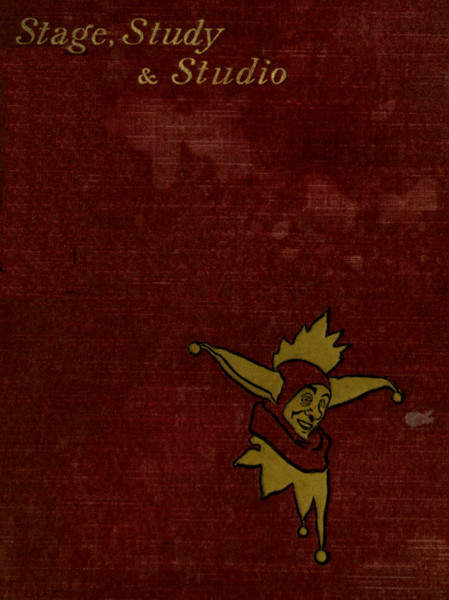
The Project Gutenberg EBook of Stage, Study & Studio, by Various
This eBook is for the use of anyone anywhere at no cost and with
almost no restrictions whatsoever. You may copy it, give it away or
re-use it under the terms of the Project Gutenberg License included
with this eBook or online at www.gutenberg.org/license
Title: Stage, Study & Studio
The Fun Library
Author: Various
Editor: J. A. Hammerton
Illustrator: Fred Barnard
W. S. Brunton
George du Maurier
and others
Release Date: July 21, 2016 [EBook #52614]
[Last updated: August 8, 2016]
Language: English
Character set encoding: UTF-8
*** START OF THIS PROJECT GUTENBERG EBOOK STAGE, STUDY & STUDIO ***
Produced by Chris Curnow, Harry Lamé and the Online
Distributed Proofreading Team at http://www.pgdp.net (This
file was produced from images generously made available
by The Internet Archive)
Please see the Transcriber’s Notes at the end of this text. The texts inside some of the illustrations may be read by clicking on the caption.

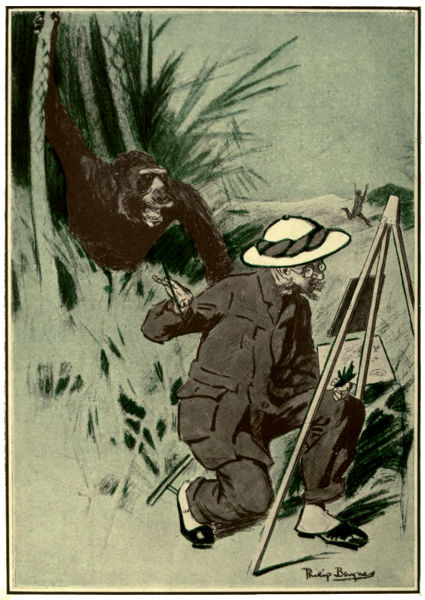
The Artist.—It’s no good making that noise, my good fellow. As I told you just now, being a landscape-painter, I don’t want models.
(From a drawing by Philip Baynes.)
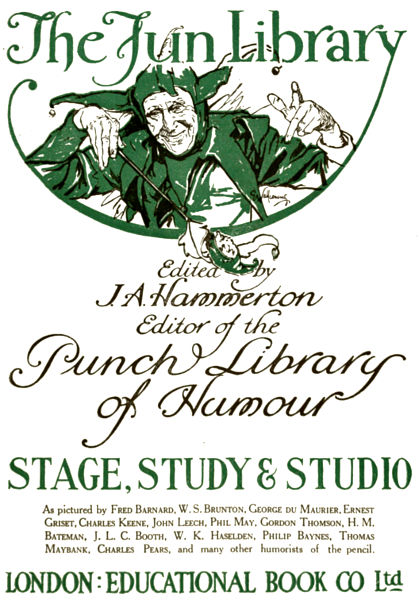
The Fun Library
Edited by
J.A. Hammerton
Editor of the
Punch Library
of Humour
As pictured by Fred Barnard, W. S. Brunton, George du Maurier, Ernest Griset, Charles Keene, John Leech, Phil May, Gordon Thomson, H. M. Bateman, J. L. C. Booth, W. K. Haselden, Philip Baynes, Thomas Maybank, Charles Pears, and many other humorists of the pencil.
LONDON: EDUCATIONAL BOOK CO Ltd
[i]
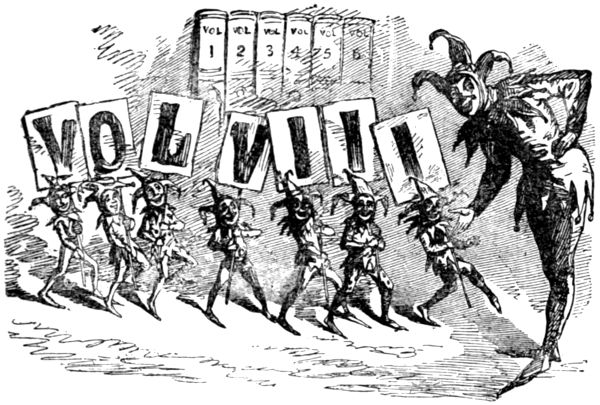
The life of what still passes in London for “Bohemia”—in and about the theatres, the studios and the literary clubs—figures conspicuously in the pictorial humour of our time. It is but natural that the artist in search of inspiration should occasionally turn his attention to his own immediate surroundings, and find subjects for his art in the comic representation of his fellows of the brush and pencil, his friends the authors and the actors, and not infrequently, himself! Some of the most pointed jokes of Keene, Du Maurier and Phil May introduced “the artist,” and in the case of the last mentioned he usually depicted his own form and features, as Cruikshank was fond of doing more than half a century before him.
This tradition has been well maintained among the artists of a later day. We shall find that a very considerable proportion of the humorous art of the moment concerns itself with the sayings and doings of our Bohemians—a term, by the way, that indicates a very mild and inoffensive variety of an almost extinct type of character.
The Bohemian of the twentieth century is a much more wholesome person than his prototype of the middle of the nineteenth. He may be still as irresponsible, as unconventional in his manners, but he is at least clean and less apt to degenerate into the “sponger.” He of the older generation provided picturesque material for the humorist of[ii] the pencil; but the stage, the study, and the studio still furnish much matter for mirth, as the admirable work of Mr. W. K. Haselden, Mr. Bert Thomas, Mr. H. M. Bateman, Mr. J. L. C. Booth, Mr. Charles Pears, and other living artists of note, represented in the present collection, bear ample witness.
It is obvious from the Index that this volume contains a most representative survey of its subject, and is probably second-to-none in The Fun Library for the high spirits and good humour which it reflects. The collection ranges from the day of Cruikshank onward, and presents many examples of such talented artists of the past as Fred Barnard, Du Maurier, Keene, Leech, Phil May, Doyle, and many others, as well as examples of Mr. Gordon Thomson, the veteran survivor of the merry men who made Fun and Judy serious rivals of Punch fifty years ago.
The sources from which the illustrations have been drawn are much the same as those that have provided the other volumes of The Fun Library. In the present volume there is a particularly fine selection from the work of Mr. Haselden, reprinted here by special permission of the editor of The Daily Mirror, and it also contains an important series by the late Phil May, reprinted by arrangement with The Sketch, while we are indebted to Mr. Gilbert Dalziel for permission to use a considerable number of excellent items from Fun and Judy, with which journals he was so long and honourably associated. To Mr. Punch’s collections of the “’sixties” we owe the numerous examples of Leech, Keene and Du Maurier at their best.
In brief, it may be claimed for “Stage, Study and Studio” that the collection is fully up to the high standard we have sought to maintain in all the volumes of The Fun Library.
J. A. H.
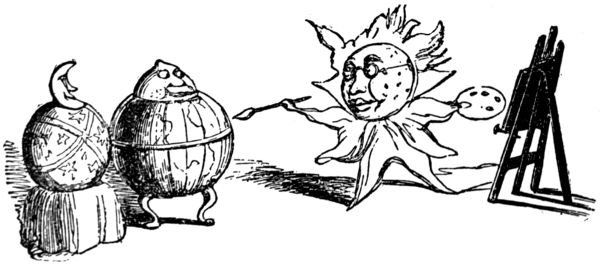
[iii]
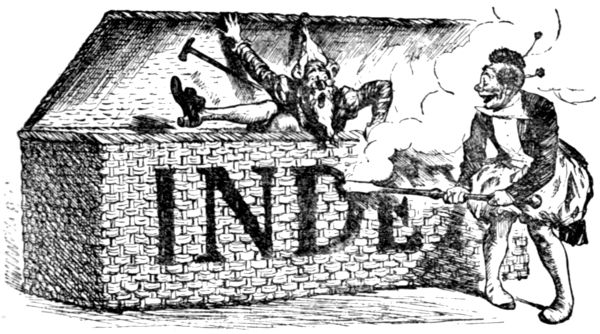
TO THE ILLUSTRATIONS
| PANTOMIMICS | |
| PAGE | |
| Rehearsing the “fish” ballet | 1 |
| Billy and Bunny | 3 |
| Winning the gloves | 4 |
| Modern languages taught in one lesson | 5 |
| Theatre Royal—Nursery | 6 |
| An ex(bus)horse-tive argument | 7 |
| A pict-ure | 8 |
| A swallow out of season | 9 |
| “With a neck like that” | 11 |
| Experienced young fellow | 12 |
| Two transformation scenes | 13 |
| Not the correct way of pudding it | 15 |
| Humanizing influence of pantomime | 16 |
| ON THE STAGE AND OFF | |
| Prompt but not prepared | 17 |
| A wordless story | 18 |
| English as she is spoke | 23 |
| Cassius | 24 |
| Acting under difficulties | 25 |
| Ever-popular criminal on the stage | 27 |
| On the stage—and off | 28-9 |
| When actors are Members of Parliament | 31 |
| When actors become modest | 32 |
| “Still running” | 33 |
| The part of Hamlet | 34 |
| Good and bad business at the theatre | 35 |
| “A little padding” | 37 |
| The actor’s one topic—himself | 39 |
| A side-box talk | 40 |
| The bald baron | 41-4 |
| FUN AT THE PLAY | |
| “Are you sitting on my hat?” | 45 |
| Delights of theatre-going | 46-7 |
| “Not so long as four solos” | 49 |
| A little ruse | 50 |
| A morning concert | 52 |
| Pit, boxes, and gallery | 54 |
| Playgoers and their eccentricities | 56 |
| Credit where credit is due | 57 |
| A “civil” retort | 58 |
| AMONG THE AMATEURS[iv] | |
| At a fancy ball | 61 |
| Private theatricals | 63 |
| Private theatricals at the Titwillows’ | 65 |
| THE POETS’ CORNER | |
| Portrait of a gentleman | 67 |
| The poets illustrated | 69 |
| No! Don’t | 70 |
| The poets illustrated | 74 |
| “Mariar Martin, or the Red Baarn” | 75 |
| An illustrated edition of the poets | 77-9 |
| Poets and their patrons | 80 |
| MAINLY ABOUT AUTHORS | |
| Would-be novelist | 85 |
| Lady Audley’s secret | 86 |
| Perfect sincerity, or, thinkings aloud | 88 |
| The ancient Britons | 88 |
| A rural study | 89 |
| “The great cypher work” | 90 |
| Author’s miseries | 92-7 |
| Harris-ing reflections | 99 |
| “Hemily Fitz-Hosborn” | 100 |
| THE EDITOR IN HIS DEN | |
| The editor at home | 101 |
| Romance of advertising | 103 |
| “Pirates surprised at sunset” | 104 |
| Fancy portrait—Oliver Twist | 105 |
| A fact! | 106 |
| A new reading | 111 |
| STUDIES FROM THE STUDY | |
| “He’s sent the books” | 113 |
| Returned—with thanks | 114 |
| A queer cut | 115 |
| The pursuit of letters | 116 |
| Grand march of Intellect | 116 |
| Catalogue of the letter P. | 117 |
| The age of intellect | 118 |
| Subject for a picture | 119 |
| An awful apparition | 121 |
| The musical neighbour | 123 |
| British Museum catalogue | 124 |
| Analytical papers | 125 |
| “Couldn’t read Miss Frump’s new book” | 127 |
| The philosopher’s revenge | 129-136 |
| FUN IN THE STUDIO | |
| “Present company always excepted!” | 137 |
| “Very tiring” | 138 |
| Wholesale | 139 |
| “Qualifications” | 140 |
| Behind the scenes | 141 |
| “Asking for it” | 142 |
| The commercial side | 143 |
| Gaddy’s academy picture on view | 144 |
| “Flattering” | 145 |
| Profession and practice | 146 |
| A rapid genius | 147 |
| “English langweege” | 148 |
| “Only their mothers” | 149 |
| For exhibition? | 150 |
| Pretty innocent | 151 |
| “Aye, there’s the rub!” | 152 |
| “Work hard and get your own living” | 153 |
| March of science | 154 |
| The real | 154 |
| Pleasures of the studio | 155 |
| A happy medium | 155 |
| The ideal | 156 |
| Two principal figures | 157 |
| Answers for our artist | 158 |
| The mother of invention | 159 |
| Kindly meant | 160 |
| “Where’s your beard?” | 160 |
| How some old painters must have worked[v] | 161 |
| Studio persuasion | 162 |
| “A portrait painter” | 163 |
| Model husband and a lay figure | 164 |
| Marvellous! | 165 |
| A visit to the studio | 166 |
| Scene in a studio | 167 |
| Ballet of action | 168 |
| Turps v. Turpitude | 169 |
| One use for “Dundrearys” | 169 |
| Accommodating! | 170 |
| “Lucky fellow!!” | 171 |
| “Noblesse oblige!” | 172 |
| Our art-school conversazione | 173 |
| “Only one spur a-piece” | 174 |
| “Sharp’s the word” | 175 |
| The sympathies of art | 176 |
| Under a great master | 176 |
| “Sent it to the wash!” | 177 |
| “Ugly and as ridiculous as possible” | 178 |
| Perfect sincerity; or, thinkings aloud | 179 |
| Easily satisfied | 180 |
| Compliments of the season | 181 |
| “Skyed” | 182 |
| ROUND THE GALLERIES | |
| Caution | 183 |
| Painters and gazers | 185 |
| An artist’s dream | 186 |
| “Athletic exercises” | 187 |
| Let them exhibit their pictures outside | 188 |
| Pleasures of the Royal Academy | 189 |
| Art in the National Gallery | 190 |
| Outside the Royal Academy | 191 |
| Charming fashion of long skirts | 192 |
| “Unto this last” | 193 |
| “Very like—very like” | 194 |
| The umbrella question | 195 |
| Pictures of the English, painted by the French | 196 |
| A-musing | 197 |
| Perhaps | 198 |
| Reception of pictures at Royal Academy | 199 |
| Our historical portrait gallery | 200-1 |
| A study | 202 |
| Overheard at the Academy | 203 |
| Suggestions for the Royal Academy catalogue | 206 |
| THE ARTIST OUT OF DOORS | |
| “It’s an ill wind,” etc. | 207 |
| The old cottage | 208 |
| The elysium of artists | 209 |
| “A pretty prospect” | 210 |
| Possibilities of a penny pistol and a box of caps | 211 |
| Technical and practical | 212 |
| “Impertinent curiosity of the vulgar” | 213 |
| “That pre-Raphaelite fellow” | 214 |
| Where ignorance is bliss | 215 |
| Design for an album | 216 |
| Studying skies | 217 |
| Culture for the million | 218 |
| An artist scamp in the Highlands | 220 |
| Ingenious protection against midges | 221 |
| Sketching from Nature | 222 |
| “Very nearly a pound” | 223 |
| Art at a cattle show | 224 |
| What an artist has to put up with | 224 |
| Enjoying himself in the Highlands | 225 |
| “Compliments of the (sketching) season” | 226 |
| “Fine Art” | 227 |
| “Brother Brush” | 228 |
| Making the best of it | 229 |
| One reason, certainly! | 230 |
| Æsthetics[vi] | 230 |
| A broad hint | 231 |
| Pleasant for Jack Daubs | 231 |
| Flattering! | 232 |
| Our adventurous artist | 233 |
| Art and science | 234 |
| An eye for colour | 235 |
| Ignorance was bliss | 235 |
| Our artist | 236 |
| SCULPTURE AND COMEDY | |
| “Well broke!” | 237 |
| Venus of Milo | 238 |
| “Ingenuas didicisse” | 241 |
| At the great exhibition of 1861 | 243 |
| Popular history | 244 |
| Capital punishment | 245 |
| A flagrant attempt | 246 |
| FUNNY FILMS: HUMOURS OF PHOTOGRAPHY | |
| “Many a true word spoke in jest” | 247 |
| Bobby’s camera | 249 |
| Interesting group posed for a photograph | 250-251 |
| Happy thought | 252-253 |
| Pleasant for Simpkins | 254 |
| Unanswerable | 255 |
| Can the camera lie? | 256 |
| The artistic(!) studio | 257 |
| “What for?” | 259 |
| Portrait of a distinguished photographer | 260 |
| A photographic picture | 261 |
| Encouragement of art | 263 |
| “A florid complexion” | 265 |
| Artful! | 266 |
| Subject for a picture | 267 |
| Photographic beauties | 268 |
| WANDERING MINSTRELS | |
| Christmas waits | 269 |
| Division of labour | 271 |
| Culture for the million | 273 |
| Nothing like advertising yourself | 275 |
| Sketch from a study window | 277 |
| THROUGH THE OPERA GLASSES | |
| The opera | 281 |
| What indeed? | 284 |
| “French without a master” | 285 |
| We don’t sing enough | 287 |
| The high note | 288 |
| The low note | 289 |
| “Only twenty-two” | 291 |
| Culture for the million | 292 |
| Gentle rebuke | 293 |
[vii]
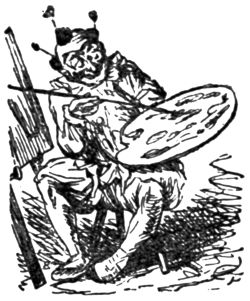
[viii]

| PAGE | |
| PLAYERS’ PRANKS | 2 |
| EMMA AND ULPHO | 19 |
| HUMOURS OF THE PLAYHOUSE | 22 |
| SCENERY AND COSTUME OF THE STAGE | 48 |
| ASS YOU LIKE IT | 55 |
| HAMLET’S LAST SOLILOQUY | 58 |
| AT THE MASQUERADE | 60 |
| AMATEUR FLUTE-PLAYER | 62 |
| ONLY SEVEN | 64 |
| LYCEUM LYRICS | 66 |
| THE POETS AT PLAY | 68 |
| MOTLEY’S KINGDOM | 76 |
| MY MANUSCRIPTS | 81 |
| A MAN I HATE | 84 |
| MARK TWAIN AND THE KEY | 87 |
| HUMOURS OF THE PRINTING HOUSE | 91 |
| HARRIS-ING REFLECTIONS | 98 |
| HUMOURS OF ADVERTISING | 102 |
| APPROVED BY THE EDITOR | 109 |
| RULES FOR NEWSPAPER CORRESPONDENTS | 110 |
| LITERARY FLUNKEYISM | 112 |
| HUMOURS OF OUR LANGUAGE | 114 |
| MORE HUMOURS OF ADVERTISING | 120 |
| HE NEVER CALLED AGAIN | 126 |
| A DANGEROUS WRITER | 128 |
| PAINTERS AND GAZERS | 184 |
| A DREAM OF UNFAIR WOMEN | 204 |
| IMAGINARY CONVERSATIONS | 209 |
| PYRAMUS AND THISBE | 239 |
| PHOTOGRAPHIC FAILURES | 248 |
| THE PHOTOGRAPHS | 258 |
| MRS BROWN AND THE GERMAN BAND | 270 |
| STREET MUSICIANS | 280 |
| THE BOHEMIAN GIRL | 282 |
| RECOLLECTIONS OF THE OPERA | 286 |
| A WOMAN’S THOUGHTS ABOUT WOMEN | 290 |
| THE ONION GIRL | 294 |
[1]
PANTOMIMICS
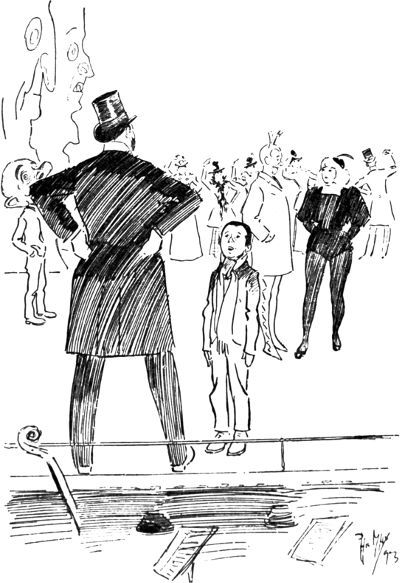
REHEARSING THE “FISH” BALLET (A FACT).
Stage Manager. What are you, boy? Boy. Please, sir, I’m a whelk.
[2]

PLAYERS’ PRANKS
Practical joking might correctly be described as a remnant of the barbaric ages, when strength and muscle received the respect we now award to mind and brain. Indeed, it still passes current among modern barbarians for humour, while in civilized States, where humour is something that appeals to the intellect, joking in the practical sort is generally regarded as buffoonery. Having admitted thus much, it may be said that even practical joking is not all bad, and is sometimes “a source of innocent merriment.”
Joking of the practical kind is very often a pronounced characteristic of the actor, as the countless stories of players and their pranks abundantly prove. The reason for this is most likely to be found in the fact that it requires something of the actor’s talent successfully to carry out a practical joke, and actors, knowing they possess the ability, are often tempted to exercise it. The name of the genial J. L. Toole, of happy memory, will naturally occur to every one in this connexion, and the fact of that good-hearted soul having had a strong weakness for this diversion is ample proof that practical joking is quite compatible with geniality of character. The stories that are told of Toole and those which he told of himself would easily fill a couple of volumes. For the purpose of the present chapter a typical one will suffice.
[3]
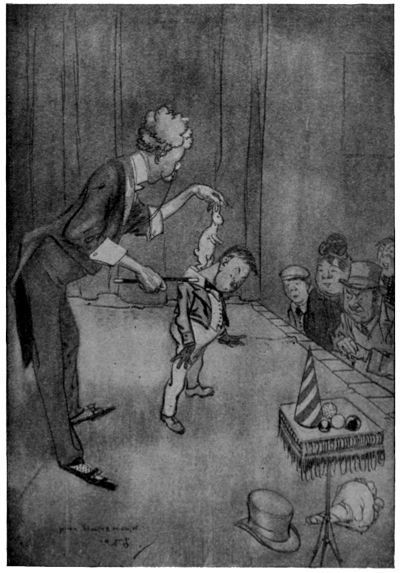
BILLY AND BUNNY.
Irate Parent (in front row) of Small Boy assisting Conjuror. Disobedient young monkey! Why, it was only last week I forbade him to keep rabbits.
[4]
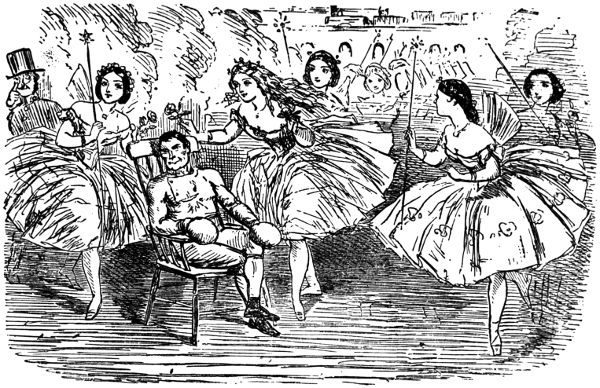
A FANCY SCENE—WINNING THE GLOVES.
From the grand pugilistic ballet of the fight for the championship, which might, could, should, and ought to be
played at one of the operas.
[5]
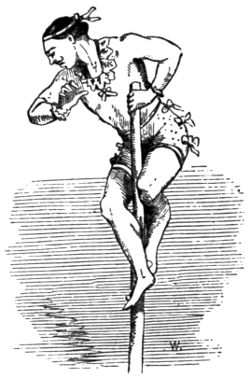
THE MODERN LANGUAGES TAUGHT IN ONE LESSON!
German Professor (on “la Perche”) to Italian ditto below. Be steadier, Bill, will yer, or I’m blowed if I don’t come down!
The comedian once entered a dairy, and solemnly remarked to the shopman—“I will take a boy,” with a glance at his shelves. “A boy, sir?” asked the puzzled shopman. “Yes, or a girl,” replied the comedian. The man never doubted but his visitor was a lunatic, and said, mildly—“Pardon me, this is a milkshop.” “Come outside,” said Toole, and taking the dairyman by the arm he led him out of the shop and pointed to the sign. “I’ll take a boy or a girl,” he solemnly repeated. “Read what your notice states—‘Families supplied in any quantity.’”
E. A. Sothern, the famous “Lord Dundreary,” had an insatiable propensity for practical joking, and many are the stories of his pranks. One of the most amusing, though, perhaps, a little cruel, tells of his treatment of his guests on the occasion of a dinner party to a number of congenial souls. They were all assembled but one, who was rather late. After waiting a few minutes, the host suddenly exclaimed—“Here he comes—let’s all get under the table—make haste.” Anticipating a joke, they all scrambled under, except Sothern himself. Enter guest—“Hallo! where are all the other fellows?” “Oh, they all got under the table[6] when they heard you coming. I’m sure, I don’t know why.” The ignominous crawling forth one by one that ensued can safely be left to the imagination of the reader.
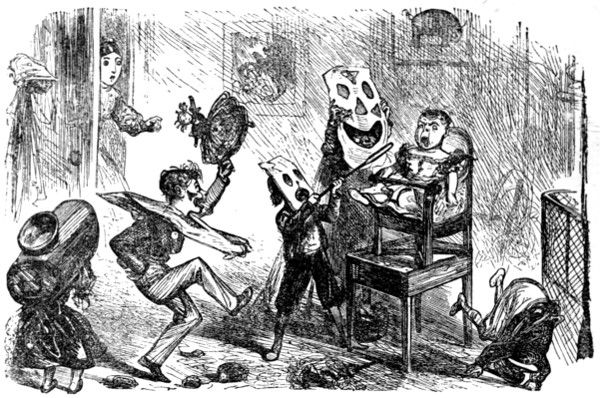
THEATRE ROYAL—NURSERY.
Master Reginald’s tender years having prevented his attendance at the Pantomime, Messrs. Tom, Charlie and Co. kindly give him a résumé of the evening’s performance.
It is always a good thing when we find the subject of a practical joke joining good-naturedly in the mirth, and this we have in a story told by the late Mr. G. A. Sala of a joke played upon him by Lord Dundreary. “I remember going down to the Derby,” writes the famous journalist, “in a highly festive fashion, with poor Edward Sothern, the never-to-be forgotten Lord Dundreary. On this particular day Sothern, the kindest, but still the most provoking of practical jokers, was as full of mischievous pranks as an egg is full of meat. He offered to bet me a guinea before we reached Clapham that I would lose my temper, and lose it badly, before 2 p.m. ‘But why, my dear Sothern,’ I asked, ‘should I lose it? The weather is beautiful, I did my work by getting up at six this morning, I am in the best of all good company, and I haven’t got a penny on the race.’ ‘Never mind,’ persisted Lord Dundreary, ‘I will bet you one guinea that you will blaze up like a vesuvian thrown into the fire before 2 p.m.’
[7]
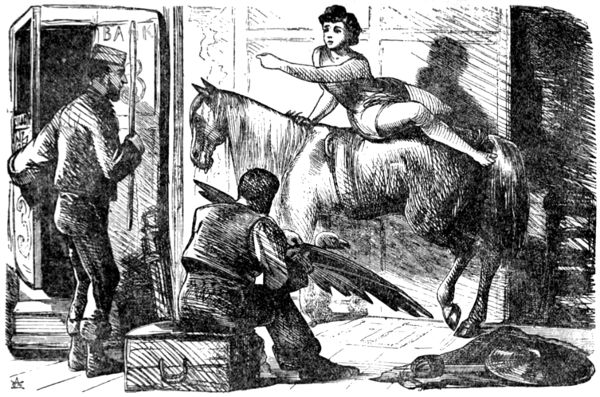
AN EX(BUS)HORSE-TIVE ARGUMENT.
Mazeppa.
Now, just you bang that ’bus door smarter to-night, or the old hoss’ll never get a good start.
Carpenter. All right, miss. Cue’s “wild career.”
[N.B.—The noble steed is an old “Favourite.”
[8]
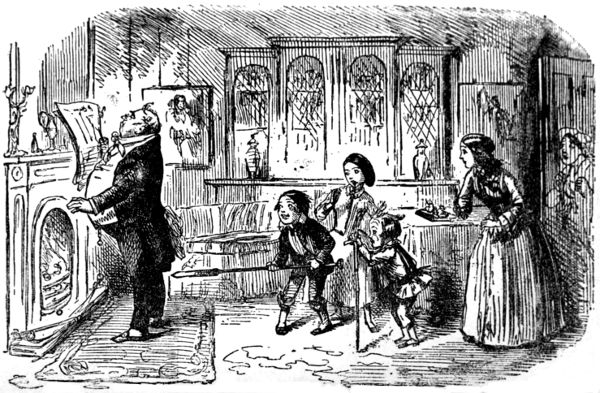
A PICT-URE.
Show-ing what Mas-ter Tom did af-ter see-ing a pan-to-mime—but
you would not do so—oh dear no!—be-cause
you are a good boy.
[9]
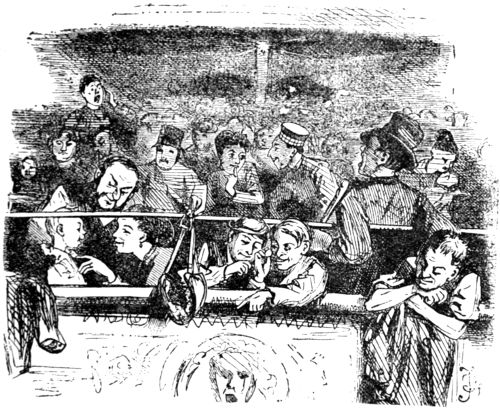
A SWALLOW OUT OF SEASON.
Scene—Boxing-night.
Gentleman
in Front (bawling). ’Ar-reee!!!
’Arry, at Back. ’Ullo!!
G. in F. (as before). Where’s Bill-leee!!
’Arry. Why,
the young beggar’s been an’ swallered his sixpence in the
crowd, and they won’t let ’im in!
[10]
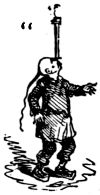
“It was half-past one when we reached the course, and one of the officious red-jackets who haunt the Hill stepped forward and gave me the customary brush down. I strolled a few paces onward, when another red-jacket pounced down on me, and, notwithstanding my expostulations, brushed me down again, hissing meanwhile as though he were grooming a horse. I essayed to light a cigar, when a third brush-fiend was upon me; but when a fourth made his appearance, brandishing his implement of torture, the dams of my long pent-up temper broke down, and a torrent of adjectives, the reverse of complimentary, flowed over the fourth brush-demon. My wrath was at its height when I found myself quickly tapped on the shoulder, and beheld the maliciously chuckling countenance of Sothern. ‘I will trouble you for one guinea,’ he said, and proceeded to explode with laughter. Of course he had followed me about, and feed the brush-fiends to harry me to desperation.”
W. J. Florence, a well-known American comedian in his day, was very much on a par with Sothern in the matter of practical joking, and the story of a good-natured trick he played on the latter, as related by himself in one of his posthumous papers, is very entertaining. “Meeting Sothern on Broadway one fine morning,” so the story goes, “I told him that there was an oat for him at the Fifth Avenue Hotel, taking care to pronounce my words in such a careless, inarticulate way that the genial comedian thought I said there was a note for him at the hostelry I had named. He accordingly started off post-haste up town—we had met near the battery, whither we both had strolled for a morning constitutional—to get his oat. When he reached the Fifth Avenue Hotel and the clerk, in response to his inquiry, handed him out the grain of oats which I had left for him, he saw the joke immediately, and laughed at it most heartily, devoting the remainder of the day to telling everybody he met what a capital joke Florence had played on him.”
[11]
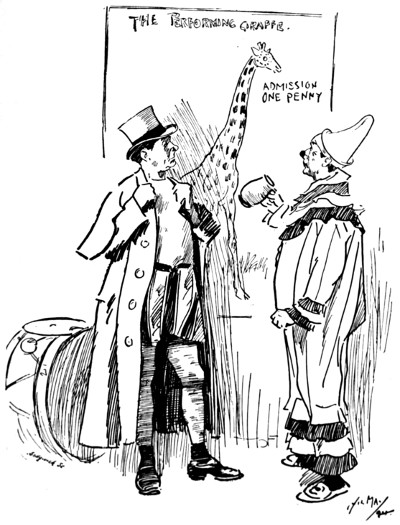
“With a neck like that, what a fine thing it must be to be thirsty!”
[12]
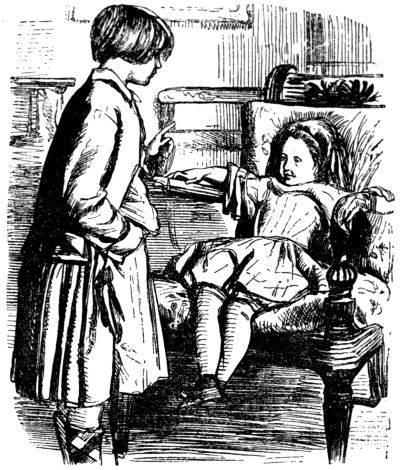
Experienced Young Fellow. Ah, Clara, you should have seen the Pantomimes that I’ve seen; these modern affairs ain’t half so good.
The late Fred Leslie was another popular comic actor who, like Sothern and Toole and so many of “the profession” past and present, was never so happy as when planning some harmless practical joke, which was always sure to amuse every one concerned. One of his most successful efforts in this direction was made during his tour in America with the Gaiety Company, and is related by the late Clement Scott in his recollections of this celebrated comedian.
[13]
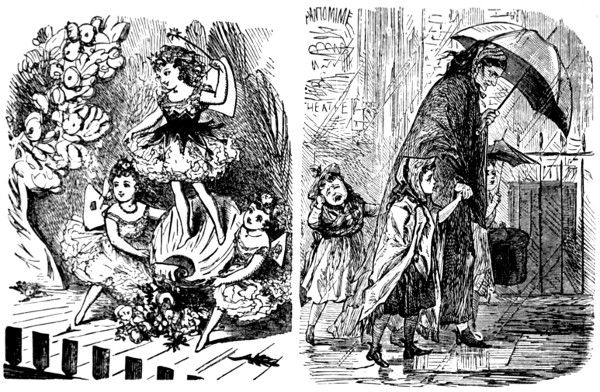
TWO TRANSFORMATION SCENES.
Scene No. 1.—“The Rosy Realms of Boundless Bliss.”
Scene No. 2.—En route from Rosy Realms to Rag-and-Bottle Alley, St. Giles’s.
[14]

One night (says Mr. Scott) several of his confrères had been invited to a supper, and the number included the musical director of the theatre they were then playing at. His absence from the orchestra nearly the entire evening in question was generally commented on, and it subsequently leaked out that he had been busily employed composing the music of a song which he intended to submit to them for approval before the party broke up. The night being a fine one, it was agreed to walk from the theatre to the house of their host. The composer, when he sallied from the stage door, was seen to have a huge roll of music, carefully tied up, peeping from one of his overcoat pockets. This was just as carefully abstracted, and some one was deputed to stroll leisurely onward and engage the victim in apparently earnest conversation, while the rest remained behind and committed the music to memory, after which the manuscript was skilfully returned without arousing the slightest suspicion.
At the termination of the meal, and before the musician could reach the piano, Leslie began to whistle a few bars of the melody, which, it is scarcely necessary to add, attracted universal attention. When pressed to continue, Leslie gave the air from beginning to end, and when, at the conclusion, he remarked that it was an old English ballad, cold beads of perspiration gathered on the forehead of the unhappy composer. His solemn asseveration that he had that evening written an original melody to the same air, note for note, was received on every hand with apparent unbelief; and in order to verify Leslie’s statement, most of those present followed his lead and sang or whistled the composition through. The musician, we are told, was allowed to play it over, and the resemblance, of course, was so striking that he himself began to doubt his own sanity. But when he came to know of the trick by which he had been bamboozled, he enjoyed the joke as much as those who carried it out.
[15]
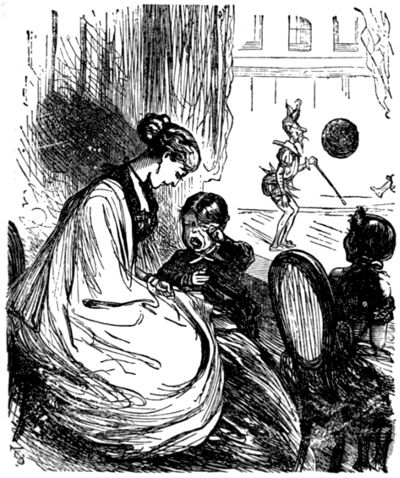
NOT THE CORRECT WAY OF PUDDING IT.
Master Gussy. Oh, boohoo! What a shame to go throwing plum-pudding about like that!
[16]
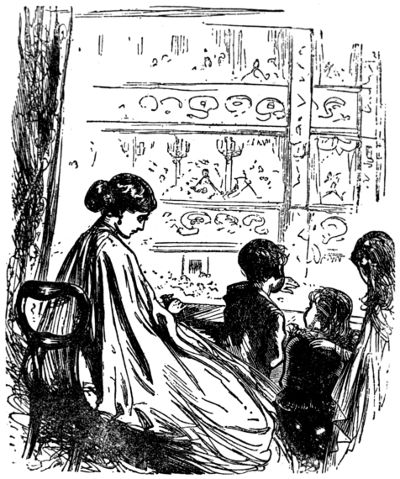
THE HUMANIZING INFLUENCE OF PANTOMIME.
Depraved Child. Oh, mamma, do look, the clown’s been and run a red-hot poker right through that policeman—isn’t it fun?
[17]
ON THE STAGE AND OFF
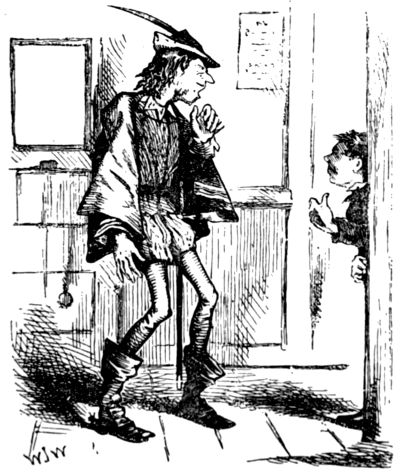
PROMPT BUT NOT PREPARED.
[The call-boy has just called that distinguished amateur Muddle, who is
doing Iago for the first time.]
Muddle. Very odd! Knew every word of it this morning, too, but I’ll be hanged if I can remember how it begins!
[18]
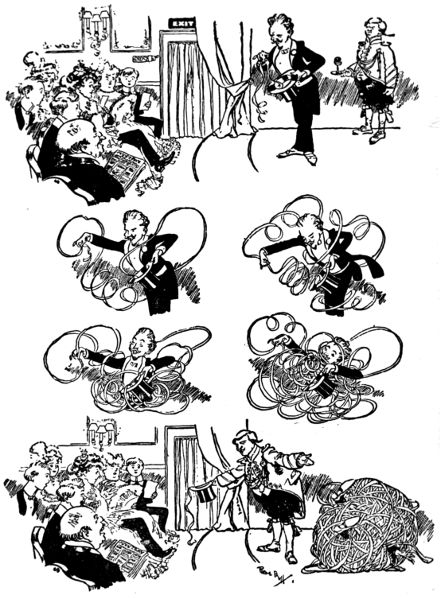
A WORDLESS STORY.
[19]
(A dark night. The curtain rises, and discovers nobody on the stage.)
(Ulpho speaks.) How dark it is.
(He is answered by a hollow voice which is inaudible.)
Ulpho. I do not feel comfortable, nor as I once did. (Sighs.)
(The stage gradually fills till Ulpho is forced forward to the footlights, which go out. The crowd parts asunder suddenly, and a figure comes slowly forward.)
Figure. (Says nothing.)
Ulpho. I feel chilly.
(Figure smiles contemptuously and puts his hands in his breeches’ pockets. He then addresses Ulpho silently, and, after hesitating more than once, breaks down at last altogether.)
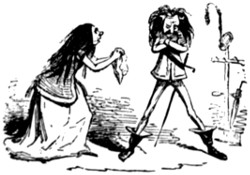
(Still darker night. Graves spring their rattles and watchmen open. Fate is seen sitting in the background in the shape of a policeman. A glow-worm roars, and the side-scenes shake perceptibly. The moon, which has been slowly rising, falls suddenly down.)
Ulpho. Unfortunate moon!
Emma. Will you never cease to despond?
Ulpho. Nothing on earth shall ever induce me.
(He takes his cap from his head, and hangs it carefully on a hat-stand. In a fit of desperation he begins to tear his hair from his head. Emma sinks into a swoon, and leaving Ulpho in the centre of the stage, she goes off at both wings.)
[20]
(The morning breaks, and is already in many pieces. The first rays of the sun are reflected in several hundred dewdrops which are rocking themselves in the gently waving brush-wood. Two masks drop from the trees and rush on each other’s swords.)
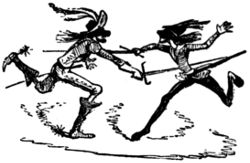
1st Mask. Are you dead?
2nd Mask. Only parts of me.
Enter Emma.
1st Mask. Lady, may I ask if you have any present intention of giving up the ghost, if so, perhaps I could——?
Emma. I am much obliged to you, but I have already made my own arrangements——
(A pair of jack-boots are carried across the stage.)
Emma. Are those, perhaps, the mortal remains of my Ulpho?
(Ulpho enters in carpet slippers.)
Ulpho. I am still alive, but I wear boots no more.
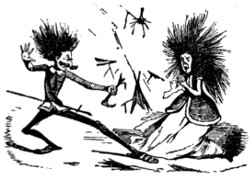
(The river rises, and a Dragoon Regiment, which has been stationed on the opposite bank, are carried away, one by one, by the flood. Ulpho fetches an umbrella from the side scenes.)
Emma. Would we could share it together!
(Ulpho is about to give it to her, when a thunderbolt descends, and the umbrella falls between them.)
Ulpho. Fate has decided otherwise.
(They embrace, and the curtain falls in an agitated manner.)
(Enter an old man with a very broad-brimmed hat.)
Old Man. Woe! Woe!
[21]
Ulpho. What brought you here?
Old Man (wildly). Can I never preserve my incognito?
[He stabs himself.
Emma (regarding the body).
[She stabs herself.
Ulpho. Ah! now I feel lighter, better.
[He starves himself to death.
Enter the Duke: A lay figure is also brought on to the stage.
Lay Figure. Behold the victims of thy revenge.
[Grand scena—Furies enter and tear the Duke slowly to pieces. The end of the drama now approaches rapidly, and whilst everything is trembling in every direction, the Prompter rushes on to the small piece of stage still remaining, and stabs himself with a pair of snuffers, and
THE CURTAIN AND THE THEATRE FALL TOGETHER.
Punch, 1844.
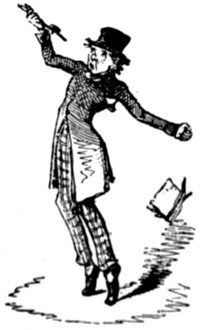
[22]
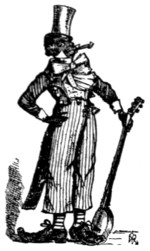
The function of the stage is a much discussed question. We shall assume that it is first and foremost a place of entertainment. Many are the comedies, from Shakespeare’s to Shaw’s, that have tickled the ribs of the “groundlings,” but there is also about stage performances a frequent element of diversion supplied by effects entirely unrehearsed. In most cases these “unrehearsed effects” assume the form of amusing blunders, in others they may be witty impromptus on the part of an actor or an auditor, “gags,” “wheezes,” what not! A laughable mistake has often afforded relief to a dull play; while, on the other hand, it may have been the means of spoiling an otherwise effective scene.
A curious thing about stage blunders is that, when one of the characters makes a mistake it is almost a certainty that some other member or members of the cast will follow suit. It is related of Charles Matthews, the famous comedian, that if he made one mistake in the course of a performance he was sure to commit several blunders before the conclusion of the play; this, no doubt, arising from over-anxiety to guard against slips. On one occasion he informed an astonished audience that he saw “a candle going along a gallery with a man in its hand,” and later in the play he stated that he had “locked the key and put the door in his pocket.”
John Kemble, according to an anecdote told of him in Tom Moore’s Diary, once made a very ludicrous mistake. He was performing one of his most famous parts at some country theatre, and, as is common in some provincial temples of the Drama, a child had been making its presence very pronounced by emitting the shrill noises peculiar to the average infant. At last Kemble could bear the infantine interruptions no longer, and advancing to the front of the stage he assumed his most tragic air and said—“Ladies and gentlemen, unless the play is stopped, the child cannot possibly go on.” Kemble’s audience on that occasion was not like the one in San Francisco in its early days. An opera company was performing in the rowdy city of the “Pacific Slope,” when a child in the auditorium created a great disturbance. The burly gold-seekers, who mainly composed the audience, ordered the players to stop till the child was finished with its entertainment, as an infant’s voice was such a rarity in the Wild West at that time that it awakened pleasant memories of the old home and tugged at the heart-strings of the rough-and-ready miners. This is a genuine instance of the play being stopped and “the child going on.”
[23]
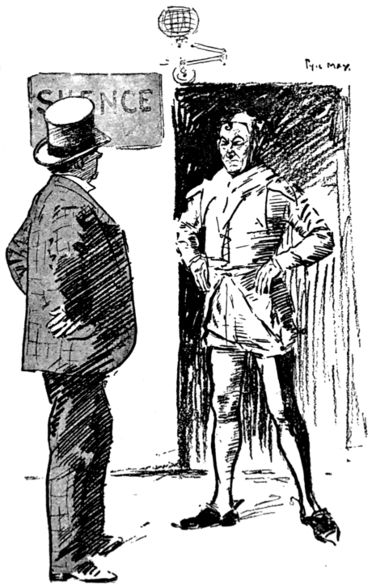
ENGLISH AS SHE IS SPOKE.
Touchstone (to Stage Manager). ’Ow do you expect me to speak my lines correct with all that ’owling and ’ooting and ’issing going on in front?
[24]
[25]
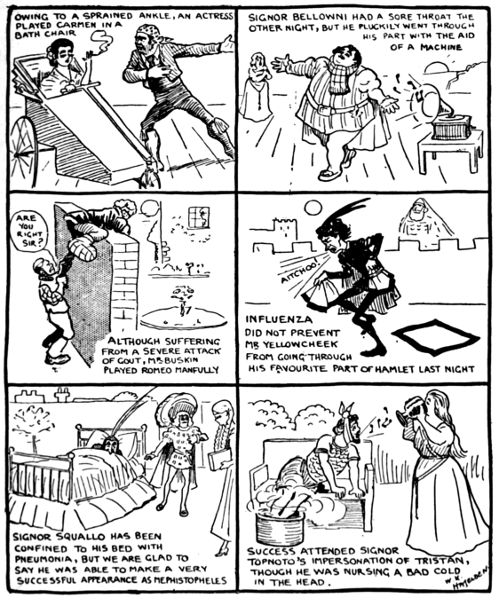
The public insist on seeing their stage favourites, even when they are not quite fit. A well-known actress sang “Carmen” from a bath-chair recently. What next?
[26]
A very amusing mistake is laid to the credit of Quin. On one occasion, while he was acting “Judge Balance” in The Recruiting Officer, he addressed Mrs. Peg Woffington in these terms—
“Sylvia, what age were you when your dear mother married?”
Peg made no reply to the embarrassing query, so Quin proceeded—
“I ask you what age you were when your mother was born?”
Thus going from bad to worse. The actress fortunately did not lose her presence of mind, and replied—
“I regret I cannot answer your question; but I can tell you how old I was when my mother died.”
Amusement is frequently afforded by some member of the audience losing himself in the play, and fancying that the scene before him is a page from real life. When such incidents occur, they form excellent testimonials to the dramatic abilities of the actors. A striking instance of this kind is related in connexion with the late Fanny Kemble. It occurred while she was appearing in Philadelphia as “Juliet.” She had just repeated the lines—
when a tall, lanky, medical student in a stage box, who had evidently been deeply absorbed in the scene, thrust his hat on his head in great excitement, crying out in a voice that could be heard all over the theatre—“Keep him up, Juliet; I’ll run and fetch the stomach pump.”
An incident of a similar nature occurred many years ago at the London Princess Theatre. A well-known conveyancer, noted for absence of mind, during a performance of Macbeth, one of the witches replying to the Thane, that they were “doing a deed without a name,” started up exclaiming, to the bewilderment of the audience—“A ’deed without a name’! Why, it’s void. It’s not worth sixpence!” The last time Kean played Louis XI at the Edinburgh Theatre Royal, a young Irishman who had been sitting spellbound in the stalls, after the attendants had proclaimed, “The King is dead!” exclaimed, “And may the Lord have mercy on his guilty soul.”
[27]
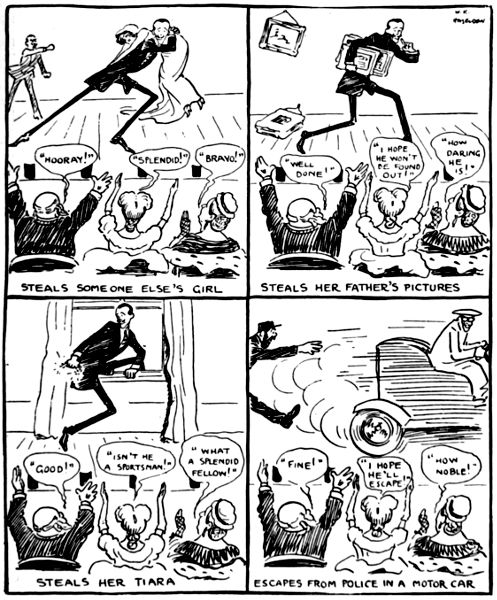
THE EVER-POPULAR CRIMINAL ON THE STAGE.
Criminals (on the stage) are extraordinarily popular. In real life, we do not like being stolen from. On the stage, we love to see a fine, dashing criminal stealing from other people. The worse he is, the louder we applaud him.
[28]
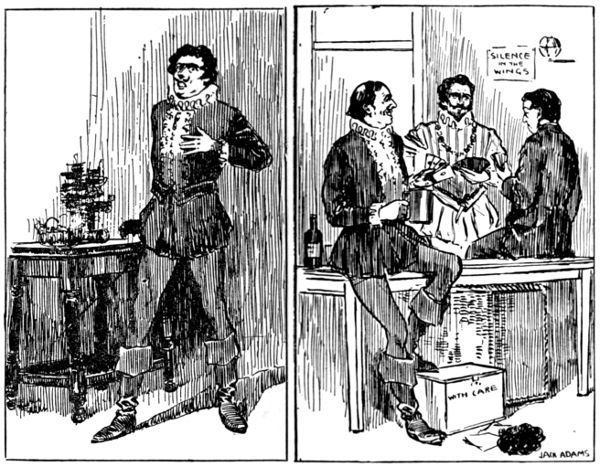
ON THE STAGE— —AND OFF.
Sometimes a voice from the “gods” may be the means of swamping a play. This was the case with the only dramatic piece ever written by Miss Braddon, the famous novelist. In one of the acts a child was kidnapped from its mother, and at the end, when all the characters in the play were being made happy, the restoration of the child was taken for granted. This was a dramatic mistake, and while suited for a novel, was not to be accepted in the theatre. The omission passed unnoticed for half a minute after the fall of the curtain; then one of the “gods” leaned over the gallery and coolly inquired—“What about the kid?” The piece was doomed in the uncontrollable peals of laughter that followed.
[29]
Instances where members of a cast, through ignorance or forgetfulness, take some scene or dialogue literally, are most mirth-moving, if somewhat rare. A highly entertaining instance of this kind occurred once when John Kemble was playing Hamlet in a country town. An actor, who was sustaining the part of “Guilderstein,” was, or imagined himself to be, a capable musician. “Hamlet,” in the usual course of the play, asked him—
“Will you play upon this pipe?”
“My Lord, I cannot.”
“I do beseech you.”
“Well, if your lordship insists upon it, I will do as well as I can.”
And to the great consternation of “Hamlet” and the amazement of the audience, he proceeded to play “God Save the King.”
A delightful piece of literalism is told about a property man who on one occasion was deputizing at a rehearsal of Macbeth in which a well-known actor was filling the title rôle. Here is a scrap of the dialogue—
[30]
Property Man. As I looked towards Birnam, anon, methought the wood began to move.
Macbeth: Liar and slave!
P.M.: S’help me bob, sir, the blokes told me to say so.
To ludicrous instances there is no end; but perhaps one of the most comical occurred in a wretched little French theatre during the time of the first Revolution. Madame de Larme, who was playing “Juliet” on the occasion, was lying in the death scene on a tombstone. Outside, it was raining in torrents. A drop came through the roof and fell on “Juliet’s” nose. She made a face. Another drop found its way to her eyelid. She winked. Finally, she took to watching the drops and dodging them. The situation was at once appreciated by the audience, and it sympathized with the actress.
“Look out, Mrs. Juliet,” said one fellow, “there’s a big one coming. I see it.”
“Mind your eye,” said another.
“Madame,” said a third, rising, “will you accept my umbrella?”
But “Juliet” bore up bravely to the end, and finished the scene amid the applause of a sympathetic audience.
In a Glasgow theatre some forty years ago, the playgoers were treated to a very diverting scene that was not in the programme. The play was After Dark, and in one of the acts there is a very exciting railway scene in which a train crosses the stage just as one of the characters who has been tied to the rails is released. The manner in which the train is manipulated is very simple. A number of men, concealed behind it, run across the stage. On this occasion the man who was working the engine tripped and fell, carrying the engine with him, when about halfway across the stage. The man in charge of the tender, not having time to clear out of the way, fell over the engine-keeper, and the third fell over him, the curtain being run down on the most exciting railway disaster that ever occurred in Stageland, the audience laughing heartily the while.
[31]
[32]
[33]
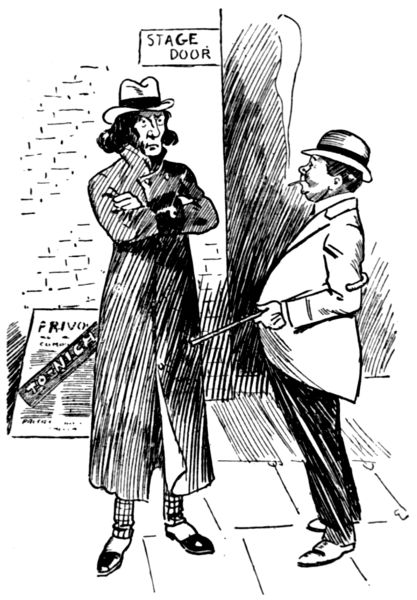
Comedian. Is your play still running?
Tragedian. No—but the manager is!
At a theatre in Glasgow the writer witnessed a very amusing incident in the course of a representation of Theodora by Miss Grace Hawthorne’s Company. There is a tremendously “bluggy” scene in this drama, which closes with the heroine standing in the middle, while a collection of corpses strew the stage. On the night in question the drop curtain refused to perform its office, and after[34] coming half-way down complacently stuck there. The dead bodies lay in dreadful suspense for some time, and then in despair got up and walked off!
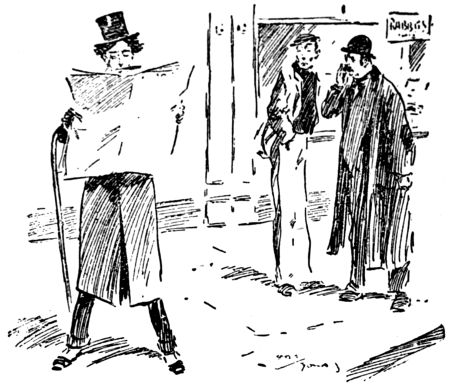
Bill. See that cove, ’Arry? He takes the part of Hamlet.
’Arry. Well, good luck to him if the bloke’s in the right.
While this immensely delighted a nineteenth-century audience as an absurdity, it appears to have been quite the custom on the Restoration Stage, when players “died” in front of the curtain and were either carried off or walked away afterwards! This is seen from the famous epilogue spoken by Nell Gwynne in Dryden’s Tyrannick Love. She played a serious part on this occasion, and in the last act stabs herself twice, and dies. She lies dead on the stage; then, when the bearer comes to carry her off, she starts to her feet, exclaiming—
“Hold! Are you mad? You damned confounded dog! I am to rise and speak the epilogue.”
[35]
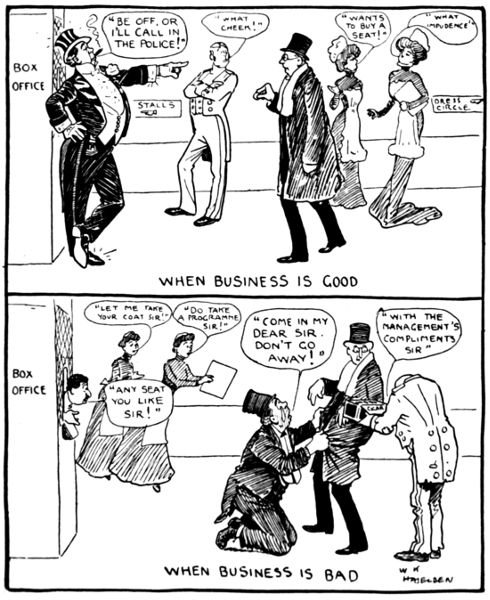
GOOD AND BAD BUSINESS AT THE THEATRE.
When a play is a success the theatre-goer is treated with less consideration than when it is a failure. In the latter case he is overwhelmed with attention and kind words.
[36]

Stage “waves” have often afforded no little amusement to the audience. The troubled ocean is simulated on the stage by a number of men lying on their backs under a painted canvas, kicking their legs and throwing their arms about with a certain amount of regularity, the men being blindfolded to prevent the dust getting into their eyes. During a performance of the Black Flag, at Dundee, a scene in which the waves were required was introduced and went with its usual success till one evening the curtain got entangled with the sea-cloth, and on the former being raised it carried the latter with it, exposing to the view of the audience the group of wave-makers lying on their backs vainly kicking the air. The audience, of course, screamed with laughter, which set the wave men wondering, and, thinking something was amiss, they unfastened the bandages over their eyes and discovered their undignified positions, quitting the stage with the greatest rapidity. The audience were not in a mood for settling down to watch the surging sea after this, and the remainder of the scene was omitted from that performance.
In this connexion the experience of a well-known comedian who started his career as a humble “wave,” will afford the reader some merriment. He writes:—“At last the shipwreck came on, and I was hustled under the sea-cloth along with a dozen other ‘supes.’ Our business was to make the sea rise in its might and wreck the gallant ship. We had been repeatedly cautioned at rehearsal not to use our hands, but to go down on all fours and produce the foaming billows by ‘humping’ our backs up and down. This was a very trying exercise; it was much easier to use our hands, though it gave to the rolling billows a jagged and unnatural appearance, and when the dry white paint sifted freely through the cloth, covering us up, choking and blinding us as the climax approached, I commenced in a fit of desperation to use my hands, so as to dodge the foam as much as possible, and keep it from totally blinding me. But I was soon perceived by the stage carpenter, who instantly dived under the cloth, labouring under wild excitement, and commenced cursing me in dumb show for not ‘humping’ my back as I had been told to do. He was so fierce that I quickly edged away from him. This made him worse. He signalled me to come back. I edged away a little further, and a moment later stood up through a hole in the cloth, as big as a barn door, in the midst of the angry breakers, and covered from head to foot with the white powder. There was not a sound in the house until I gave a terrible ‘chahoo!’ and suddenly dived back under the waves. Then you could not have heard the report of an eighty-ton gun a hundred yards away.”
[37]
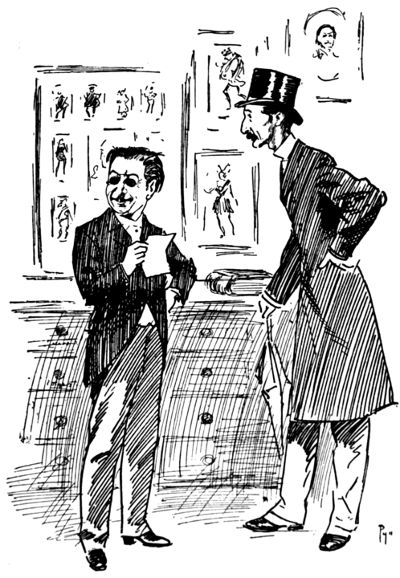
Distinguished
Amateur (who has been cast for the part of Sir Toby Belch). I
suppose I shall want a little padding?
Costumier. Certainly. (Shouting) Ernest, bring down a full-size stomach!
[38]
A very droll interruption occurred one evening in a St. Helens theatre when the late Signor Foli was singing. The celebrated bass had just finished the first verse of his favourite song, “The Raft,” when a baby started squalling, and still continued as he began the second verse, commencing—
but he got no further, being seized with uncontrollable laughter, which for the moment puzzled the audience, but presently it dawned upon them that the next line was—
and they joined the Signor in his mirth. He left the stage for a moment, and returned and sang in his exquisite style “Out on the Deep.”
[39]
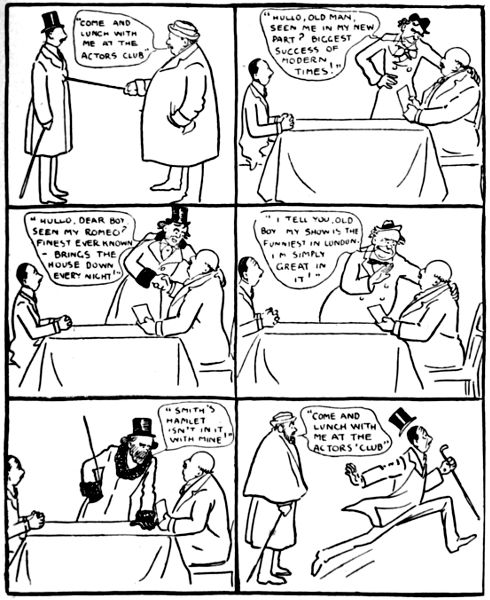
THE ACTOR’S ONE TOPIC—HIMSELF.
Actors are charming people, but unfortunately they are so keen about their work, that their thoughts constantly recur to it, and they cannot keep their own latest achievements out of the talk. A lunch at an actors’ club is apt, in consequence, to be a trifle monotonous.
[40]
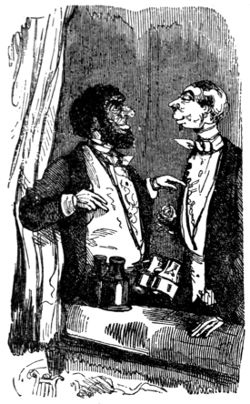
A SIDE-BOX TALK.
Roguy and Poguy.
Roguy. See that girl looking at me,
Poguy?
Poguy. Don’t I? I declare she can’t
keep her eyes off you.
Roguy. What women care for, Poguy,
my boy, is not features, but expression.
[He pokes Poguy in the waistcoat.
Many good stories are told of the facetiousness of Dublin audiences. Here is one that Macready used to relate:—One night while performing “Pierre” in Venice Preserved, the Jaffier, an actor ponderous in person as well as in style, was drowsing out his dying speech, when a voice from the gallery exclaimed, “Ah, now, die at once!” to which another from the opposite side of the house responded, “Hould your tongue, you blackguard!” then, in a patronising tone to the Jaffier, “Take your time now!”
There was humour, and what is often much akin to that, pathos, in the appeal wrung from the unlucky representative of crook-backed Richard, who, finding it impossible to make head against the disapprobation evoked by his histrionic efforts, dropped blank verse, and in very plain prose told his audience—“Mr. Kean is playing this part in London at a salary of thirty pounds a night; I receive but fifteen shillings a week; and if it isn’t good enough for the money, may Heaven give you more humanity!”
At a crowded country theatre in France a woman fell from the gallery into the pit, and was picked up by one of the spectators, who, hearing her groaning, asked her if she was much injured. “Much injured!” exclaimed the woman; “I should think I am. I have lost the best seat in the very middle of the front row.”
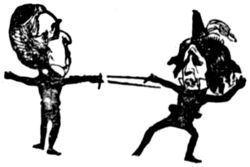
[41]
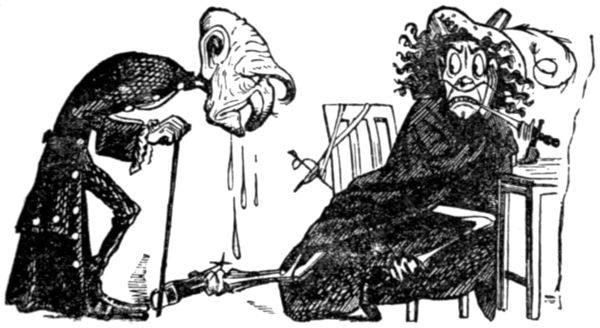
Bald Baron. Alas, noble stranger, my heir was taken off eighty years ago!
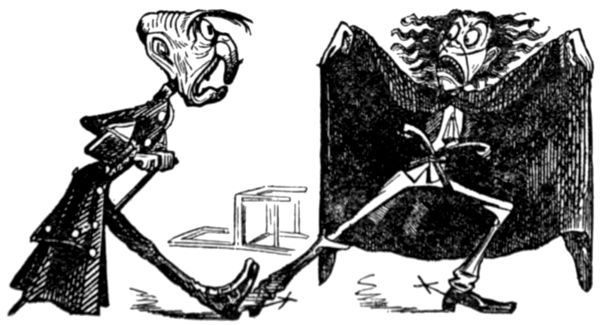
Noble Stranger. Yer’s a-go—old man, be-hold thy long-lost chyield.
(They embrace.)
[Curtain.
[42]
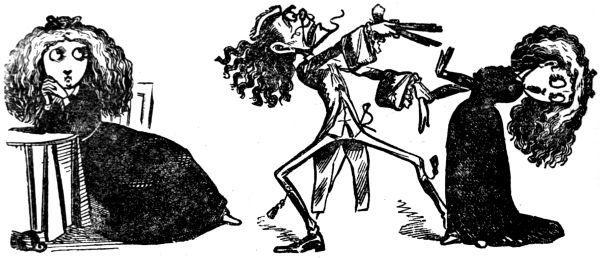
Agnes. Oh, agonies! sixty years have I waited for my Willie. Oh, will he never come.
(Enter) False Heir. Beauteous Screecher, fly with me—(Agnes faints)—ha, ha, she’s mine. Away!
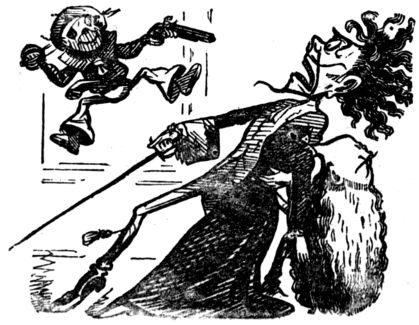
(Enter Will.) Where there’s a will there’s a way.
[Curtain.
[43]
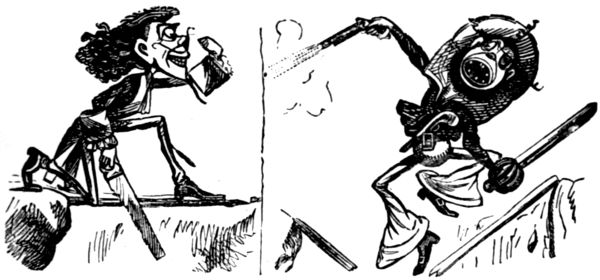
Scene, the private pass and the seedy glen.
Will. Treachery; I’ve got a drop too much.
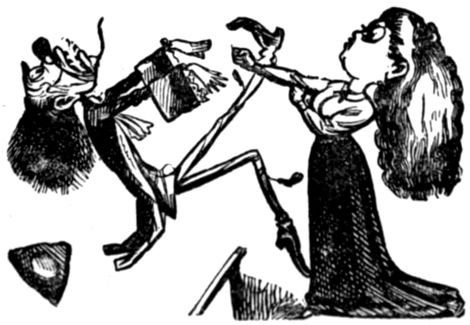
False Heir. One down, who’ll make two?
Agnes (suddenly entering). Vill-ian—you!
[Curtain.
[44]
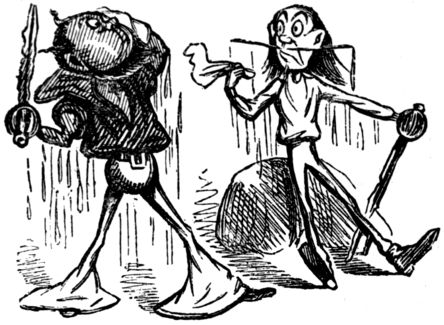
Terrific combat of many hours’ duration.
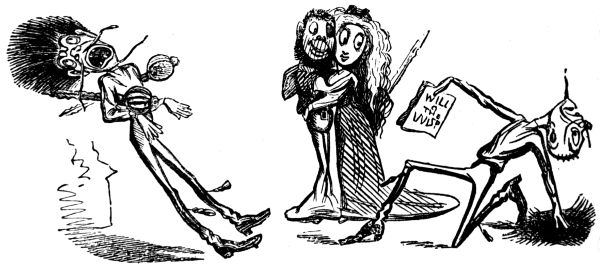
False Heir (mortally wounded). My time has come—Here are the papers—You are the Baron de la Bluebags.
[Grand display of blue-fire, and fall of Curtain.
[45]
FUN AT THE PLAY
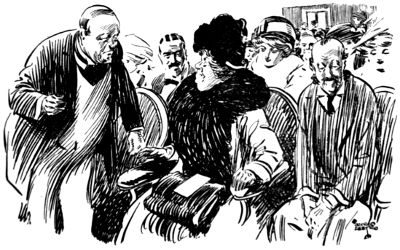
He. Excuse me, madam, but you are sitting on my hat.
She. Oh, I’m so sorry; I thought it was my husband’s.
[46]
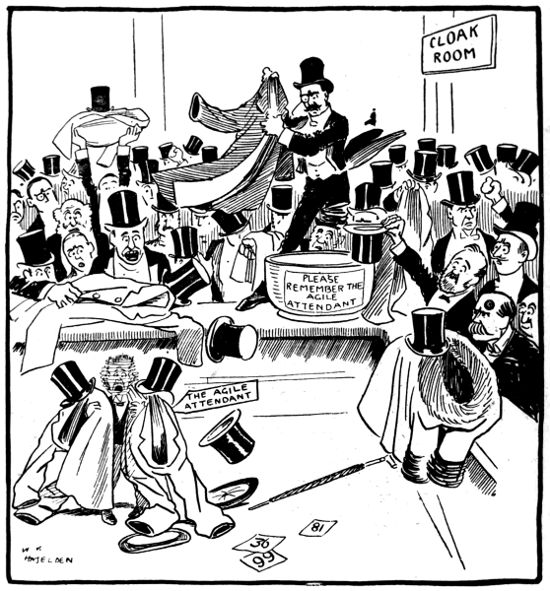
THE DELIGHTS OF THEATRE-GOING.
The pleasures of the cloak-room. No less than one attendant to each million hats and coats. Charge only sixpence (exclusive of tip), and every customer is allowed to fish out his own wearing apparel from the pile, if he can find it. Each attendant guaranteed to be innocent of all knowledge of figures, so that every client gets the wrong things. This adds a gambling interest to the general scuffle.
[47]
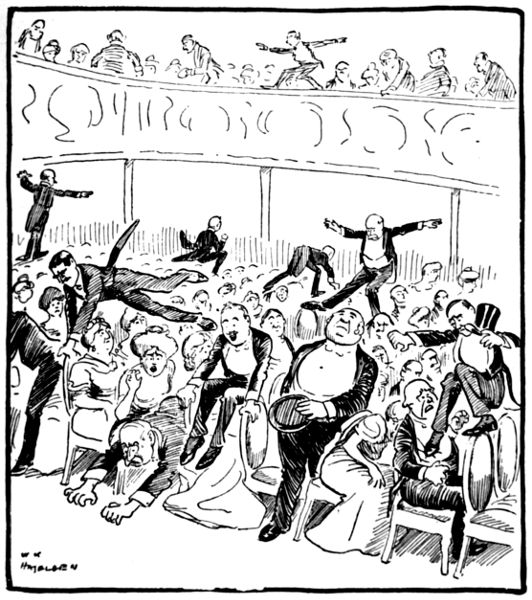
THE DELIGHTS OF THEATRE-GOING.
The unmannerly rush for drinks and smokes between the acts. As the space between the rows of seats is so narrow, the drinking brigade have to tread on those they leave behind, tearing frocks, smashing corns, and elbowing inoffensive ladies and gentlemen in the face.
[48]
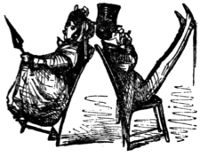
We must assume there is something very peculiar in the rural landscapes and the town residences inhabited by the dramatic population, if the haunts of their rustics and the dwelling-places of their citizens are to be judged by the representations of these places which we see upon the British stage. The dramatic idea of the country consists usually of a series of set pieces, backed by a six-inch deal bridge, surmounting a two-foot waterfall, and leading to a profile cottage of such diminutive dimensions that when the feet of any one entering it are on the basement, his head soars into the second story, and he cannot, without doubling himself completely up, go either in or out of the door. In some cases the cottages have no pretension to habitable qualities, but are simply “made out” of a single piece of canvas, on which a clearly “impracticable” window is painted, and which the business of the scene does not require to be opened, the cottage being only needed as the cue for some song or sentiment, such as “Ah! that humble cot—how its aspect makes me sigh for Home, Sweet Home!” or, “The sight of that lowly roof makes me feel no envy for pampered pride in its palace, or venal villany in its villa; for I am convinced more and more of the beautiful truth, that it is in the cottage alone contentment can be found.”
[49]
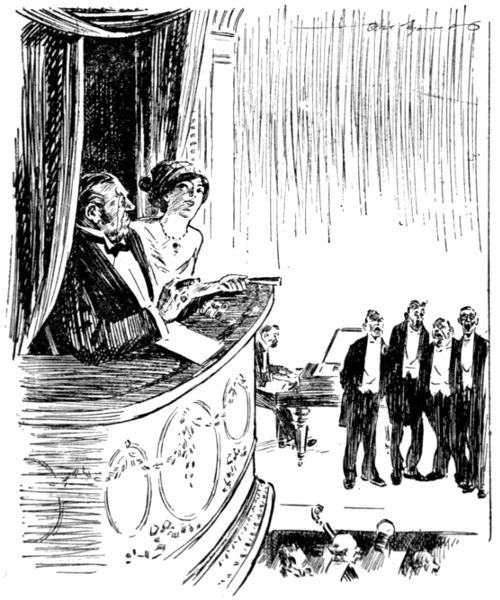
Daughter. What do you think of the quartette?
Grumpy Father. Humph, won’t take as long as four solos!
[50]
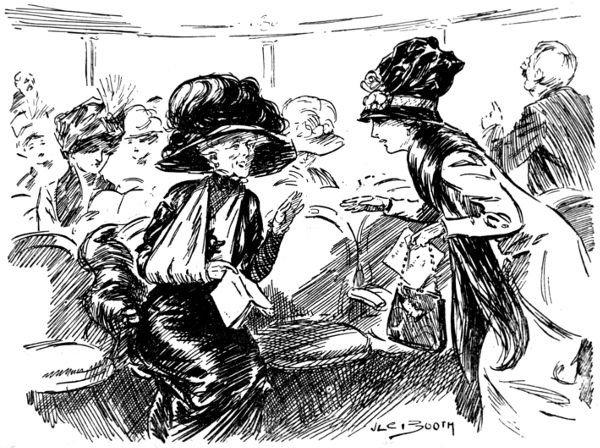
“My dear Lady Thompson, I had no idea you’d broken your arm.”
“Don’t be alarmed, dear. These horrid people would never have let Fido in, so I had recourse to a little ruse!”
[51]
Sometimes there is, by way of background, a castle, frightfully foreshortened, with its battlements half a yard high, and its towers towering among the sky-borders, while its foundations rest on a rock no higher than the top of the low comedian’s hat; but the structure is sufficient to admit of its being apostrophized by some young gentleman in hessians and a chocolate surtout as “Deserted halls of my ancestors, whose pavements have rung to the clang of the usurper’s hoof, and whose donjon-keep has echoed to the noisy revels of a stranger band.” When the occasion is an operatic one, the distant castle forms an admirable subject for something like the following—
RECITATIVE.
Every playgoer is familiar with the “mossy bank” of dramatic rural scenery, with one end slightly elevated for the head of the weary wayfarer or benighted traveller, and a bit of an old bolster craftily crammed underneath the canvas to complete the mossiness of the contrivance.
The town scenery of the stage is not less peculiar than its landscapes, and the exteriors are particularly adapted for teaching “what to avoid” to the youthful architect. If young Dashington calls upon Lord Toplofty, the latter lounges lazily out of the first-floor French window, in which his head and shoulders are a pretty tight fit, while the former bears about the same proportion to the house that the peasant bears to the cottage we have already been speaking of. It is a singular fact that the inside of any one room is no sooner represented to us, than we find it to be much larger than the whole house when judged by its external appearance; and though the mansion itself may be only ten feet high from the basement to the tip of the topmost chimney-pot, the smallest apartment is found to be as wide as the wings are apart, and as lofty as the proscenium.
[52]
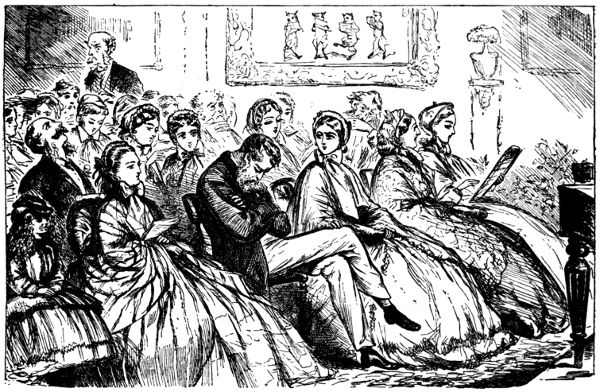
A MORNING CONCERT.
Wife. George! George! You are not in church!
[53]
In costume, the stage presents some really astounding phenomena; and we have often been struck by the similarity of the dresses worn by the retainers of every country, every age, and indeed of almost every family. One would think that the word retainer referred to the fact of the same habiliments being always retained under all circumstances, whether the wearer happens to be a creature of the house of Hapsburg, a vassal of a Norman noble, or a member of a bellowing band of Swiss patriots, shouting such choruses as the following:—
Punch.
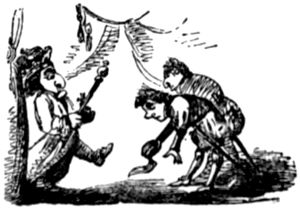
[54]
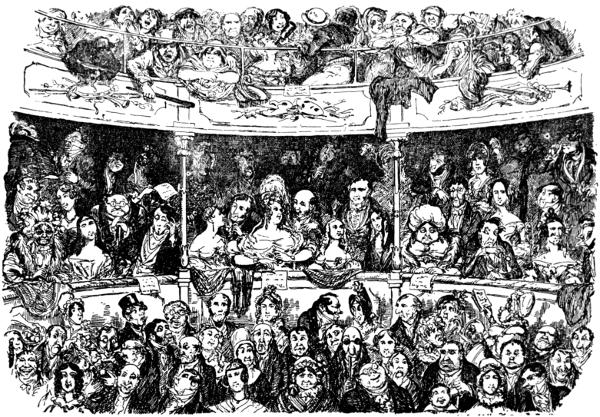
PIT, BOXES AND GALLERY.
[55]
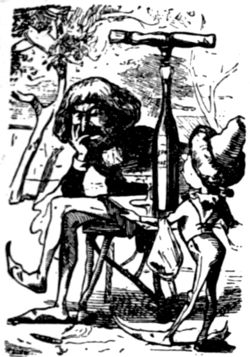
The forthcoming show of donkeys promises to be a great success. The only difficulty that seems to us likely to embarrass the manager is the selection of a locality large enough for the exhibition. If but a tenth part of the asses in the metropolis make an exhibition of themselves on this, as they are apt to do on ordinary occasions, nothing smaller than the grounds of the Crystal Palace or the Alexandra Park could possibly accommodate them.
The following, we believe, are already entered:—
An egregious ass, that believes in the speedy subjugation of the Confederates by the Federals in America.
An awful donkey, who prefers Tupper to Tennyson.
An old ass, who, by means of false teeth, tight waist, a wig, and rouge, imagines himself a lady-killer.
A young ass, who, by smoking strong cigars until he is sick, imagines himself manly.
Several thundering donkeys, who are always sending money anonymously to the Chancellor of the Exchequer for unpaid income-tax.
A still larger number of even more hopeless asses, who patronize quack-doctors, cheap, puffing tailors, delineators of character by handwriting, and other advertising swindles.
An irreclaimable ass (supposed to be the only one living), who does not see any merit in Fun. The greatest ass alive.
There are several others we could mention, but the astounding asinine qualities of the last-named donkey have quite taken away our breath. In the forthcoming “competitive examination, of donkeys,” let him by all means bear away the prize! Fun, 1863.
[56]
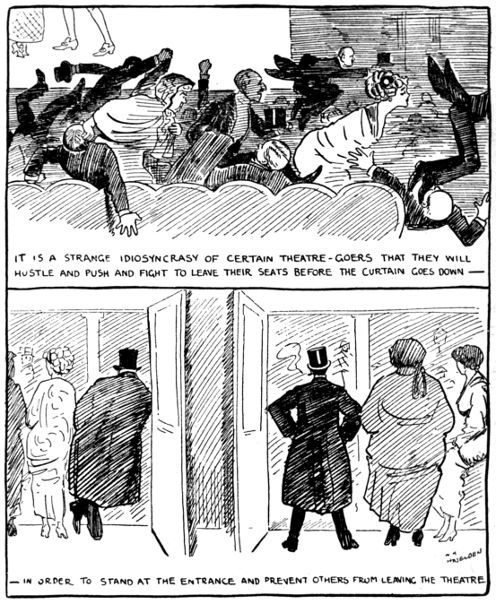
PLAYGOERS AND THEIR ECCENTRICITIES.
Chief eccentricity is the amazing mania for rushing out of the theatre before anybody else, in order that you may stand firmly at the door, preventing everybody from getting away.
[57]
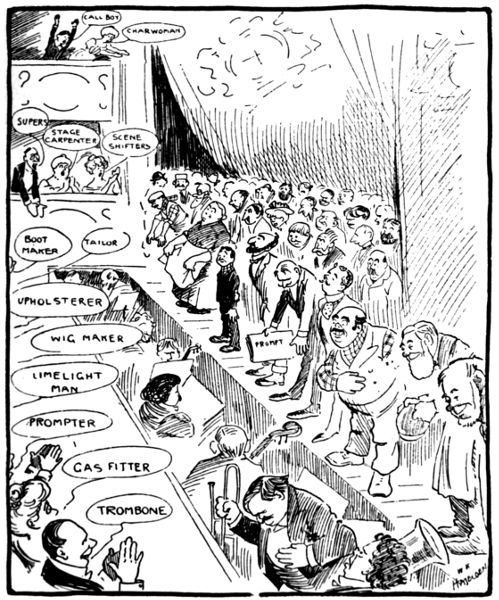
At a theatrical first night there were loud cries on the part of the audience for the scene painter, whose splendid work had contributed largely to the success of the piece. Now certain other functionaries in theatres think they should be called out also.
[58]
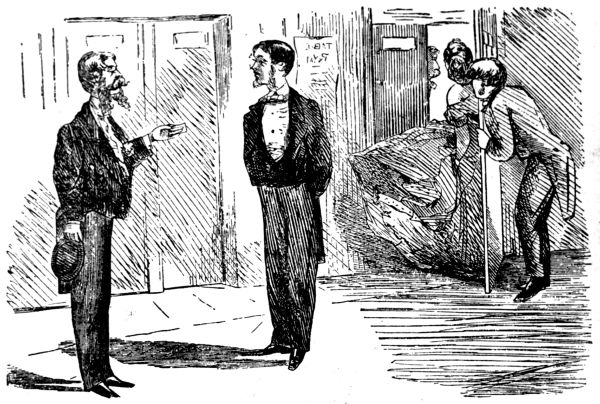
A “CIVIL” RETORT.
Captain de Plunger. I say! aw—you tha-ar—are you, aw—the
boxkeepar?
Civilian Fellow. No, my boy; I’m not. Are you?
(From Fun, 1863.)
[Rushes out at the rate of £40 a week.
[59]
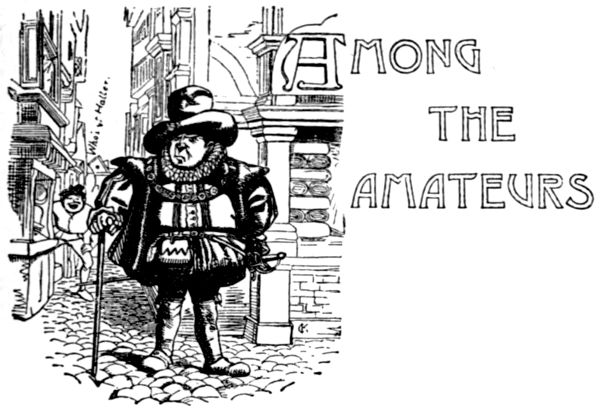
[60]
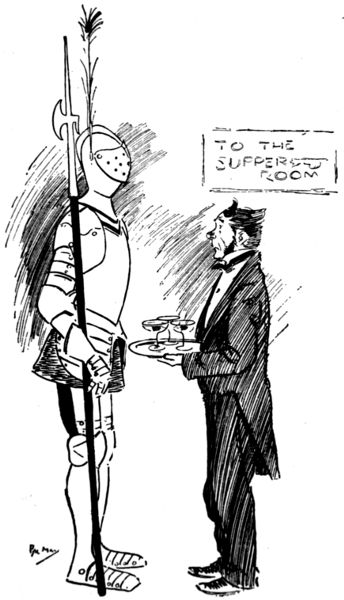
AT A FANCY BALL. Voice Within (to waiter). I’m starving! For goodness sake, get a can opener. I can’t get this beastly visor up.
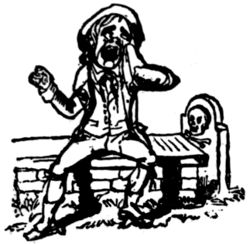
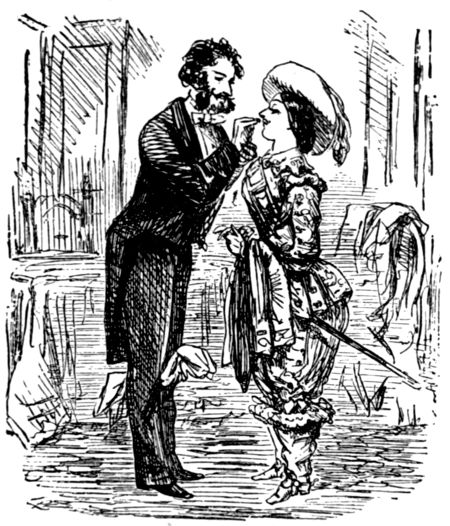
PRIVATE THEATRICALS—THE MOUSTACHES.
Lady
B. (a wicked Marquis). But have you made me fierce enough, Charles?
Charles. Fierce!—ferocious!
[64]
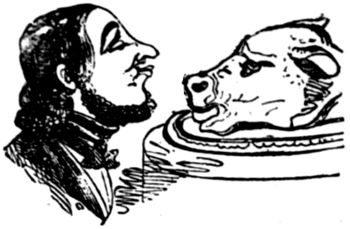
A Pastoral Story, after Wordsworth.
Postscript.
Fun, 1865.
[65]
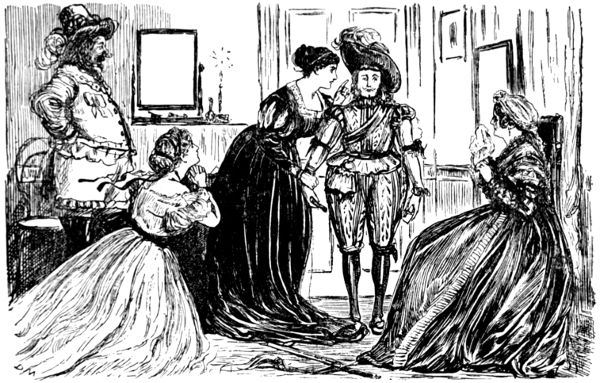
PRIVATE THEATRICALS AT THE TITWILLOWS’.
Mr. Titwillow, having undertaken a comic part, is about to render his appearance more effective by reddening the tip of his dear little nose. His wife, mother, and sister, in a passionate appeal to his nobler feelings, implore him not to desecrate his dignity by such an act. [His bosom friend cynically contemplates the touching family scene.
[66]
—Fun, 1863.
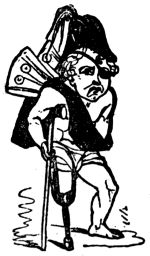
[67]
THE POETS’ CORNER
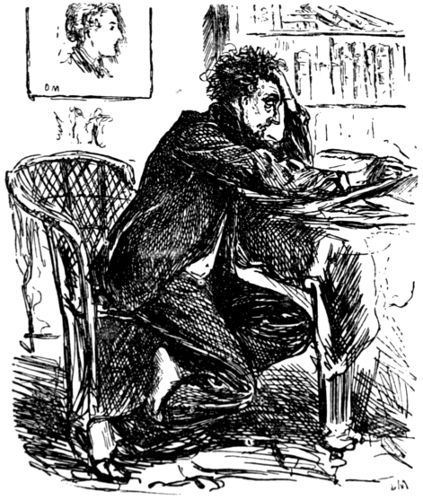
PORTRAIT OF A GENTLEMAN
In the act of writing a funny poem, that will make you die of laughing
when you read it.
[The enlarged photograph on the wall represents the same party when not engaged in comic composition.
[68]
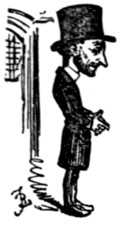
Addison in his Papers on Wit makes vigorous onslaught against “false wit.” “The first species of false wit which I have met with is venerable for its antiquity, and has produced several pieces which have lived very near as long as the Iliad itself; I mean those short poems printed among the minor Greek poets, which resemble the figure of an egg, a pair of wings, an axe, a shepherd’s pipe, and an altar.”
Further on, he says, referring to these conceits, “the poetry was to contract or dilate itself according to the mould in which it was cast. In a word, the verses were to be cramped or extended to the dimensions of the frame that was prepared for them, and to undergo the fate of those persons whom the tyrant Procustes used to lodge in his iron bed; if they were too short he stretched them on a rack; and if they were too long he chopped off a part of their legs, till they fitted the couch which he had prepared for them.”
Most people accept this dictum of Addison as a final pronouncement on the distinction between true and false wit; but on further consideration it may be found that “much can be said on the other side.” Addison asserts that the matter must suffer if it has to be squeezed into a certain shape. This may be so, but it need not be much more so in the forming of a pair of wings in verse, than in the construction of a sonnet. Every sonnet, no matter how inspired, must follow an artificial measure, every poem, be it never so soulful, must have a definite number of feet in each of its lines and a preconceived arrangement; yet, no one advances the opinion that Scott was wasting his sense of poetry by casting it in the form of octo-syllabic verse, or that Shakespeare had a difficulty in fitting his thoughts to the measure of his sonnets or the blank verse of his plays.
[69]
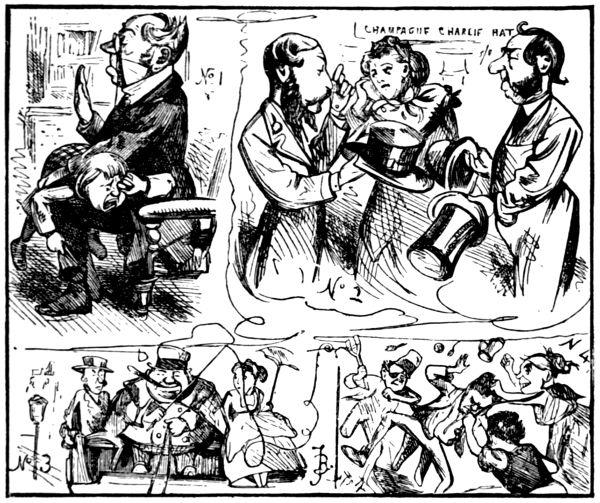
THE POETS ILLUSTRATED.
1.—“For, indeed, my father did something smack—.”—Merchant of Venice.
2.—“Take any shape but that!”—Macbeth.
3.—“Light only on the box.”—Bryant and May.
4.—“—sigh to think that he had found
4.—“His warmest welcome at an inn.”—Shenstone.
The most that can be advanced against those poetic conceits of the kind condemned by Addison is that they appeal in a greater degree to the eye than to the ear, and while we may be conscious of their artificial nature we should also be catholic enough to admit their ingenuity, and when they are sufficiently amusing to provoke laughter, or excite a smile, they should not be denied the attributes of wit; for, after all, when we free ourselves from the suspicion of affectation, do we not agree that the chief end of wit is to amuse?
[70]
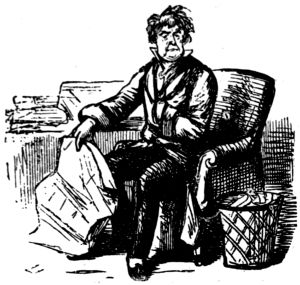
NO! DON’T. (Period 1854.)
“So they are sending out books to amuse the poor fellows at Scutari—and very proper. I will send five-and-twenty copies of my last five-act tragedy of ‘The Roman Grandmother.’”
These remarks have been suggested to the writer by his discovering in one of his old scrap-books a little collection of curiosities of verse culled in Bookland byways “oompty” years ago. These do not consist of specimens of the minor Greek poets’ eccentricities, but in every case they are examples of what Addison would have unhesitatingly catalogued as “false wit”; and yet, not only are some of them genuinely amusing and others highly ingenious, but several display a painstaking which almost amounts to genius—if genius be “the capacity for taking pains.”
We can, for example, appreciate the immense industry of the author who set himself to compose a series, of verses in which the letter “e” should be entirely omitted, and the painstaking of the author will be yet further acknowledged when it is known that “e” is the most used letter in the English alphabet, the relative proportion of its use being 120 times to j 4, k 8, g 17, and i 40.
There are two such pieces among the writer’s literary curiosities and he regards them as, perhaps, the most unique. The first one is as follows—
The first word in the second line of the third stanza is evidently a misprint. “Night’s” is most likely the word used by the author, meaning that the coming of the morn extinguished the stars—
Here is the other specimen, which is even more ingenious than that just quoted, each stanza containing every member of the alphabet except the letter “e”—
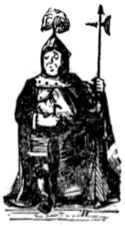
[72]
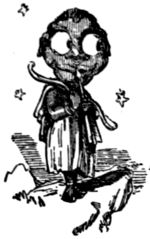
A happy thought is well worked out in the following quaint little jeu d’esprit which the writer came across in an old magazine many years ago. If you read it line after line you will find the author cheerfully contemplating the prospect of matrimony; but if you only read each alternate line you will discover him to be a confirmed old bachelor—
A somewhat common form of poetic conceit is the arranging into one intelligent poem of lines from a number of well-known poets and thus forming what may be called a mosaic of verses. I here print one of the best examples of this kind that I have come across; the author, like those of the “e”-less verses, is unknown to fame—
The composite poem thus formed may not be praised for beauty of thought, for absolute sequence of expression; but it is certainly a most ingenious composition and a monument of literary research.
The remarkable sibilance of the English language is cleverly exaggerated in the following lines, which are commended to the attention of those who lisp—
Needless to say these diverting lines were written and published originally beyond the westering wave.
[74]
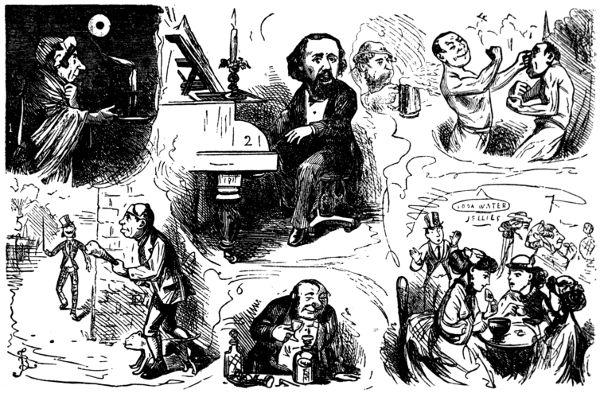
THE POETS ILLUSTRATED.
1.—“Dip forward under starry light.”—Tennyson.
2.—“It sounds to him like her mother’s Weiss Singing——”—Longfellow.
3.—“Off with his head.”—Cibber.
4.—“A pouncet box which ever an I anon
4.—“He gave his nose, and took’t away again,
4.—“... and still he smiled.”—Shakespeare.
5.—“Tis sweet to know there is an eye will mark
5.—“Our coming, and grow brighter when we come.”—Byron.
6.—“Lightly they’ll speak of the spirit that’s gone.”—Wolfe.
7.—“That we may call these delicate creatures ours—
7.—“But not their appetites.”—Shakespeare.
[75]
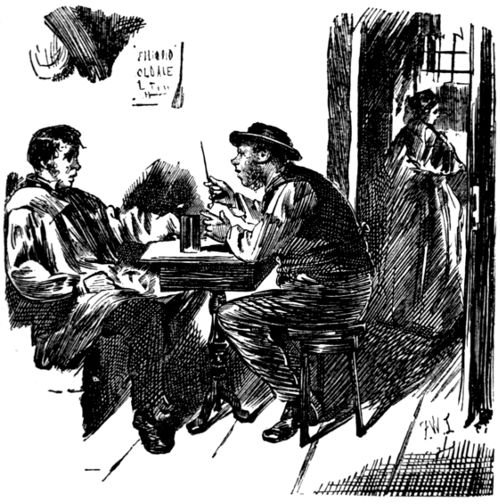
Country Critic (who the previous evening patronised “Muggins’ Travelling Theatre”). They poets just are clever chaps, and noa mistake! I see a thing last night as I never wishes to see not noa better. Darned if I doant thin’k that Mariar Martin, or the Red Baarn arn’t the best play as ever Muster Shakespeare wroat!—(Period 1865.)
[76]
By Brobert Rowning.
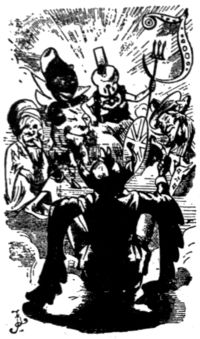
Fun, 1866.
[77]
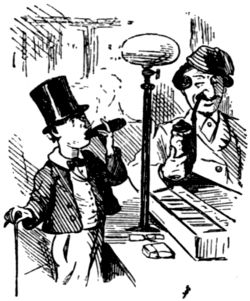
“What’s ’A-cuba to him, or he to ’A-cuba?”
—Shakespeare.
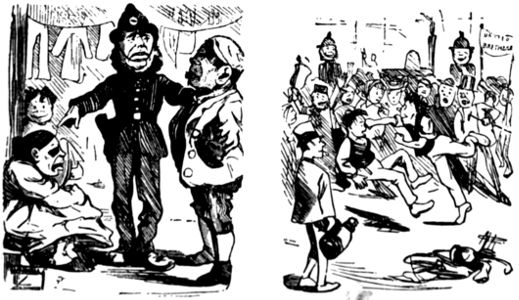
“Mark’d you her eye?”
—Sheridan.
“Alarms! Excursions! Parties fighting.”
—Shakespeare.
[78]
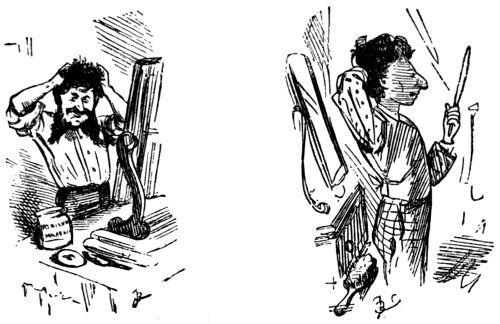
“Methinks I scent the morning hair!”
—Shakespeare.
“Parting is such sweet sorrow.”
—Shakespeare.
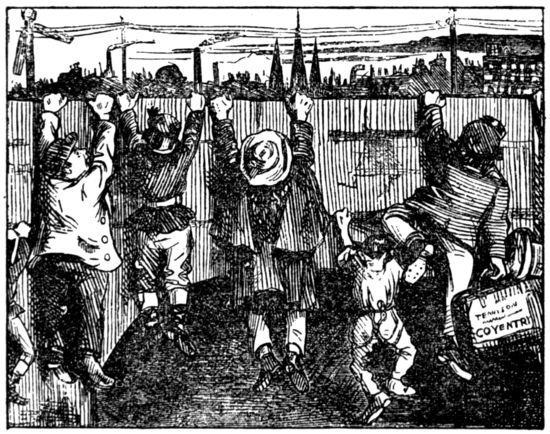
—Tennyson.
[79]
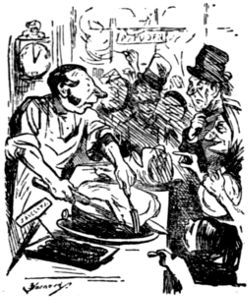
“My custom always of an afternoon.”
—Shakespeare.
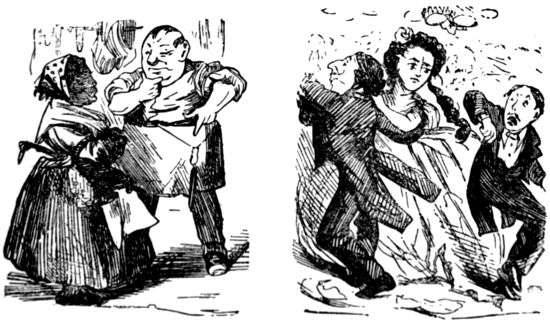
“Say what can Chloe want? She wants a heart.”
—Pope.
—Byron.
[80]
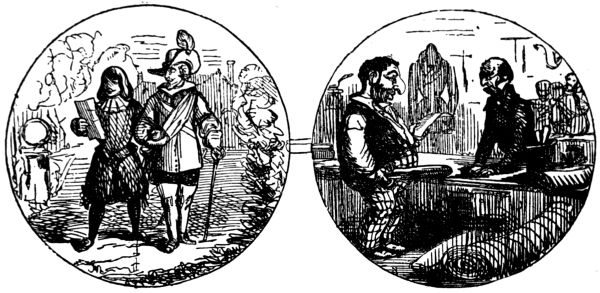
Vast is the difference between the Poets’ Patron of the past and of the present period. Formerly the noble was the encourager of the lofty strains of inspiration, but nowadays Moses is the Mæcenas of the Muses. In times gone by the bard was accustomed to write lays to laud the lazy lordling, but now he sings pæans to the paletot, and invests the vest with the graceful trimmings of fancy.
The poet has turned puffer instead of parasite. Should another Pope arise, he would sing the praises of another Chesterfield; but instead of being the Earl of that name, it would be the wrapper he would take for the subject of his lucubrations. The following is a fair specimen of the style of thing to which a new Pope would most probably devote his poetical talents:—
[81]
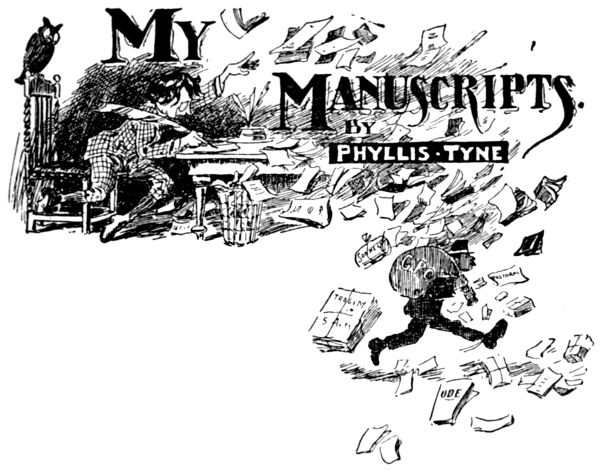
I.
I.
II.
III.
[82]
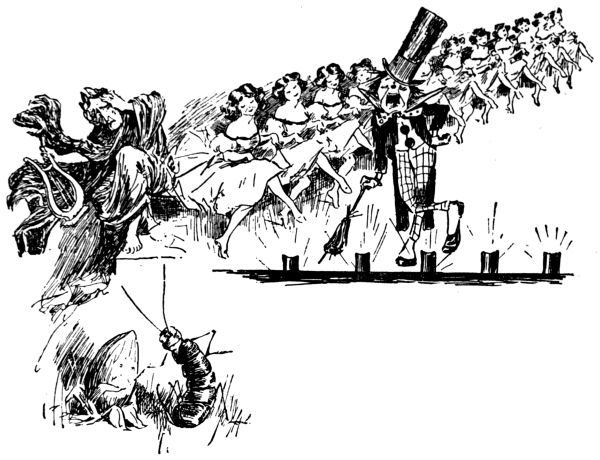
IV.
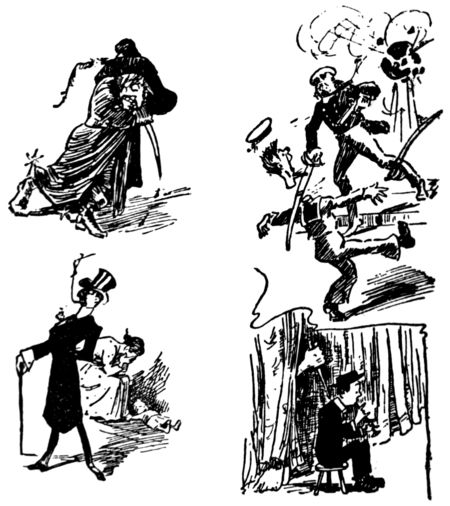
V.
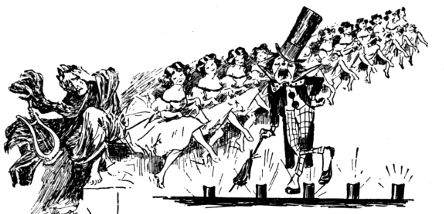
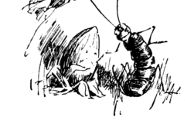
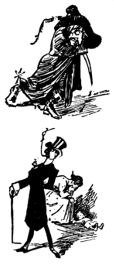
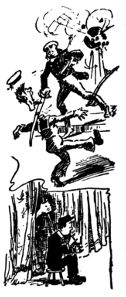
IV.
V.
[83]
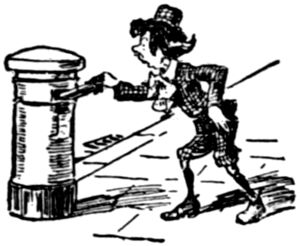
VI.
VII.
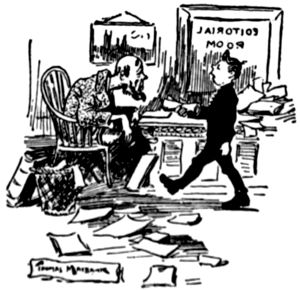
[84]
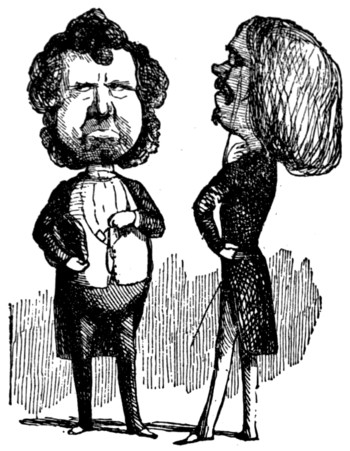
Fun, 1866.
[85]
MAINLY ABOUT AUTHORS
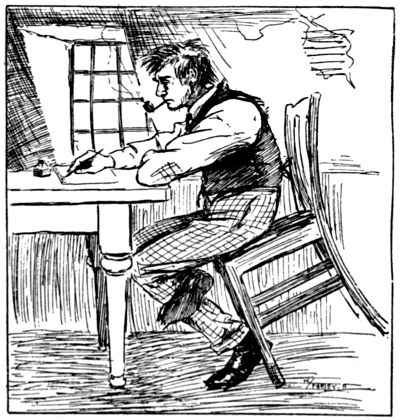
Would-be Novelist (writes). Even as he read the letter, De Brooke’s face blanched. The dreaded blow had fallen! The estate would never be his—and he must be content with a mere existence on a paltry nine hundred a year.
[86]
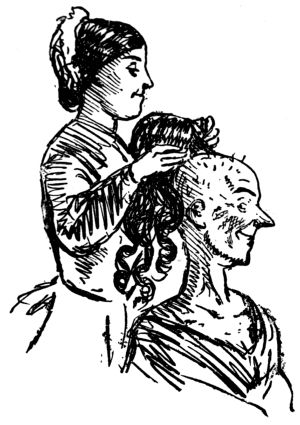
LADY AUDLEY’S SECRET
On the way to the office of his publishers one crisp autumn morning, Mr. James Whitcomb Riley, the celebrated “Hoosier” poet of America, who is almost as well known in England, met an unusually large number of acquaintances who commented conventionally upon the fine weather. This unremitting applause amused him. When greeted at the office with “Nice day, Mr. Riley,” he smiled broadly.
“Yes,” he agreed. “Yes, I’ve heard it very highly spoken of.”
[87]
“Once when I was going out to visit some friends,” Mark Twain is alleged to have said, in relating this one of the innumerable “yarns” fathered on him, “I told George, my negro servant, to lock the house and put the key under a certain stone near the steps. He agreed to do so.
“It was late at night when I returned. I went to the stone under which the key was supposed to have been hidden. It was gone. I hunted around the premises for about fifteen minutes, but still no key.
“Finally I went to George’s house—he lived outside—and rapped, vigorously upon the door. A black head, which I had no difficulty in recognizing as George’s, popped out of an upstairs window.
“‘Where did you put that key, you black rascal?’ I roared.
“‘Oh, massa,’ answered George, ‘I found a better place for it.’”
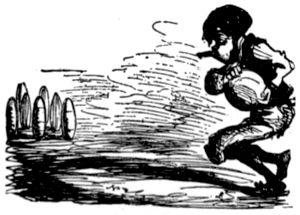
DESCEND, YE NINE.
[88]
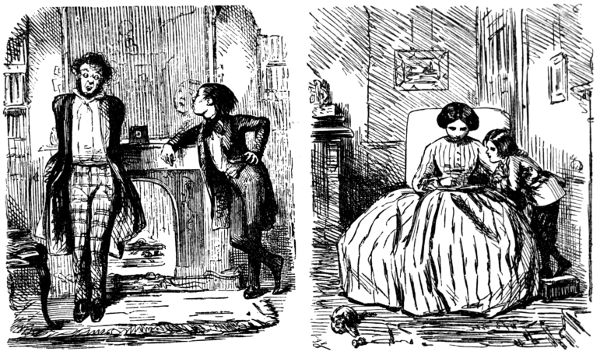
PERFECT SINCERITY, OR, THINKINGS ALOUD.
Genius. By the way, did you glance over that article of mine on “The Intellect of Woman, and her Social Position?” I don’t care twopence about your opinion; only, if you can say something favourable, of course I shall be pleased.
Common Sense. Why, I tried to get through it, but upon my life, I found it such contemptible rubbish, that I couldn’t get on; and, to tell you the truth, I think that a snug little thing in the cheese-mongering line would be more in your way than literature.
Genius. Ah, you must be a fool!
HISTORY—THE ANCIENT BRITONS.
Emily (reads). In the summer they were naked, and instead of clothes they put paint upon their bodies. They were fond of a fine blue colour, which they made of a plant called woad, which they found in their woods. They squeezed out the juice of the woad, and then stained themselves all over with it, so that in summer they looked as if they were dressed in tight blue clothes.
Arthur. And did they walk in the park and go to church so?
[89]
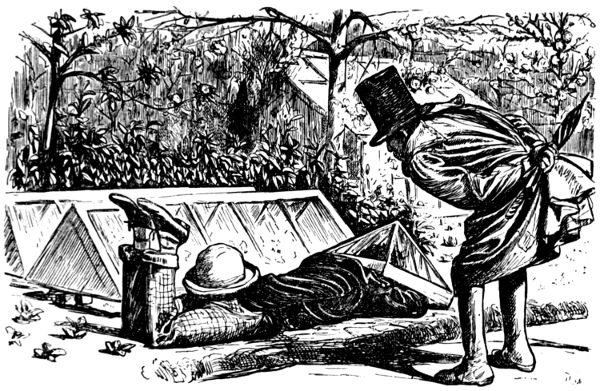
A RURAL STUDY.
BURLESQUE-WRITER FORCING PUNS.
[90]
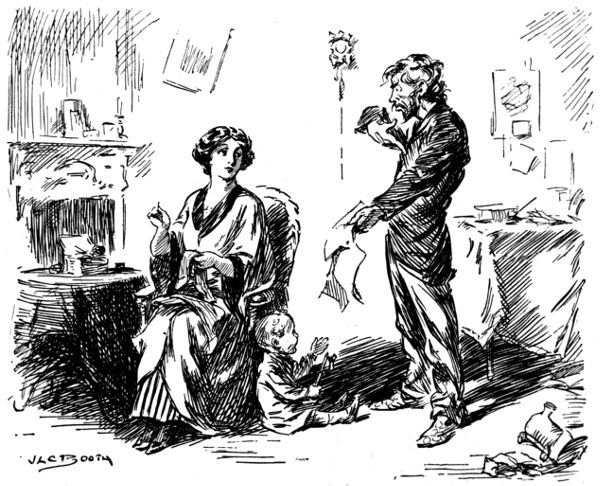
Genius. Ha! I may be unrecognized, my dear, but I’ll have my revenge on posterity. When the great cypher work is dug out of the Thames it will show that everything Meredith, Hardy, Kipling and Marie Corelli ever wrote was mine—mine!
[91]
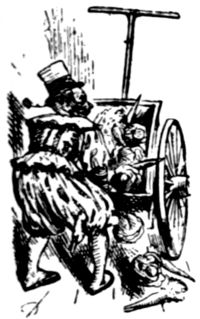
The printing-house is notoriously the place for fun. Every shop has its selection of funny men who are ever ready to co-operate with the “devils” in manufacturing mirth. And there are always the “fossils,” who afford many an opportunity for a hearty laugh at them, if not with them. Often have I been amused with, the idiosyncrasies of these typographical gray beards; their chief charm being their colossal assurance as to their invariably being right, and everybody else, who presumes to differ from them, wrong. I recollect one of these ancient typesetters (an old Scotsman) who used to be the butt of countless jokes in the shop where he toiled so patiently. On one occasion he set up an article from my pen, beginning, “Long before the introduction of Pears’ Soap”; and I am bothered if he didn’t turn the last two words into “Pea Soup!” But the real fun of the matter was, that on his mistake being pointed out, he blandly suggested our letting the words appear as he had set them—“it wid dae jist as weel!”
The printer does not seem to be deeply concerned about his future, indeed, he has many a gay dig at that grave subject; as, for instance—
[92]
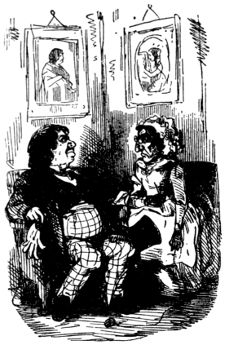
AUTHOR’S MISERIES.
Having corresponded with Miss Rudge, the gifted poetess (authoress of “Floranthe,” “The Lovelock of Montrose,” “Moans of the Heartstrings,” etc.), and exchanged portraits and your own poems with her, you meet at last.
You are disappointed in her appearance and find her about forty years older than her picture; perhaps you, too, have grown rather fat and seedy since yours was taken twenty years ago.
The printer’s “devil,” by the way, is a queer fish, and there is a story about a certain metropolitan imp that fits any of the little sinners to a T. This particular youngster had just received his week’s wages, eleven shillings, when he was heard to soliloquize in these terms—“Let me see. I’ll go the Coliseum to-night, that’s a shilling; supper with bottled beer, that’s eighteenpence; ’baccy for the week, a shilling; beer ditto, two shillings; theatre one night next week, that’s one-and-six, and supper, one-and-six; and I’ll buy that swell walking stick, and that’ll just leave sixpence to take home to mother towards my week’s board.” He must have been a regular bad ’un, that.
Another favourite medium of printing-house fun is found in adapting Gilbert’s famous line and mourning that a “printer’s lot is not a happy one,” or magnifying the annoyances from authors and editors with which printers have to put up. In this connexion we find one printer relieving his troubled soul thus—
Working for forty editors and scores of authors, every one of whom is as sensitive[93] as a sore thumb, and as lively and interesting as a hornet, no wonder that printers die young, and only pachydermatus, grizzly, mulish specimens get their share of life. The writer wishes he could offer himself as an awful example of the perils which environ a man who meddles with cold type. A thoroughly trained printer should have had a stepmother, and then a stepfather, and then have been bound out to a tanner, and then have married a scolding wife, and lived in a smoky house, and have had a family of babies who were afflicted with colic. He should have added to all this discipline a thorough knowledge of science, art, law, language, theology, history and biography. If, in addition, he has a vicious looking countenance and an amiable disposition, he may stand some chance with these authors and editors ; but the probabilities are, after all, that they will worry him to death.

AUTHORS’ MISERIES.
As you are labouring on your great work (in a style, let us add, equal to the subject), Lady Anna Maria Tomnoddy’s compliments arrive, and she requests you will cast your eye over the accompanying manuscript in six volumes, “The Mysteries of Mayfair,” correct the errors, if any, and find a publisher for the same.
N.B.—You have in your bookcase Captain Bangle’s “Buffaloes and Banyan Trees,” in MS.; the Rev. Mr. Growl’s “Sermons to a Congregation at Swansea,” ditto ditto; Miss Piminy’s “Wildflower Coronal, a Wreath of Village Poesy”; and Mr. Clapperton’s six manuscript tragedies; of all of which you are requested to give your opinion.
Then there is a certain freedom about printers’ humour which we don’t find elsewhere, save among editors: but printers, like editors, have ever been privileged individuals, and we are told that when the recording angel observes a printer hold a bit of bent brass rule between his fingers, while he misses it with a hammer, the trustworthy scribe drops into a brown study, and pretends not to hear anything. Nor is it logical to assume that a printer is a saint because he sets up a hymn-book.[94] You might as well regard an editor as a fool because you didn’t exactly agree with what was in his paper.
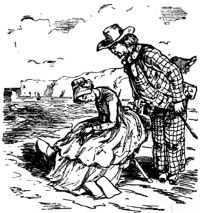
AUTHORS’ MISERIES.
Perhaps you flatter yourself that you have made an impression on Miss Flannigan (at Worthing), and you find her asleep over your favourite book.
Illustrative of this there is an excellent anecdote told by the late Max O’Rell in his book, A Frenchman in America.
A former proprietor of the New York Times and Post was wont every morning to select a text from the Bible to be printed above the leader. One morning, by some mischance, the text got lost, and Max tells us that the comps might have been heard asking in pretty loud stage whispers, “If anybody knew where that d—— text was?”
Perhaps the wit of the compositor is most amusing when it appeals to the eye. That is, when he gives rein to his fancy, and uses his types for suggesting witty ideas. Here is a very happy illustration of this kind of fun—
“TThhee ccoommppoossiittoorr wwhhoo sseett tthhiiss ppaarr. hhaass hhaadd eexxaaccttllyy aa ggllaassss aanndd aa hhaallff ttoooo mmuucchh aanndd tthhiiss iiss pprreecciisseellyy wwhhaatt hhee ffeeeellss lliikkee.”
Yes, that compositor may only have had “a glass and a-half too much,” but the typo who is supposed to have set up the appended advertisement has manifestly indulged to even a greater extent—
£ DOGSH LOSHT!
Reward Five Shtrayed or Shtolen,
Bandy Coloured Liver Legged Dog
Had on Collar Marked “Rover,”
Answers to name of C.B., Esq.
Whoever bringsh 5£ receive dogsh reward. No
furtherdogsh will be offered.
[95]
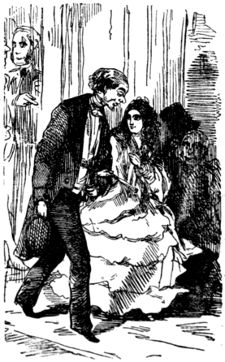
AUTHORS’ MISERIES.
As you are conducting Lady Gotobed to her carriage from Lady Highjink’s “noble party,” and fancying yourself a man of fashion, you hear the servants in the hall saying one to another, “that’s him—that’s Poonch!”
American printers are much given to these diverting devices, and in the following instance we have a number of papers vieing with one another in extracting fun from the technical terms for the various signs and punctuations—
“If brevity is the soul of wit, how is this for a funny ¶?—‘Wheeling Journal.’
It is without a ‖.—‘New York Enterprise.’ Did you expect anybody to “ ” that?—‘Philadelphia
Sunday Mirror.’ Those are the worst jokes of the .—‘Washington
Critic.’ My * * *, you’re pointed as a †, aren’t you?—‘Burlington Enterprise.’
We ![]() the opportunity to say these
are ,cal ? ? ? you fellows pro£.—‘Gold.’
Well, they afford a $ous sort of amusement
at best and —— our spirits
greatly.—‘New York “L.” R. Journal.’”
the opportunity to say these
are ,cal ? ? ? you fellows pro£.—‘Gold.’
Well, they afford a $ous sort of amusement
at best and —— our spirits
greatly.—‘New York “L.” R. Journal.’”
Here is another of the same, as they say about the Psalms of David—
“A company of printers from Constantinople
have joined the Turkish
army. They ought to be good at a
— at the enemy in the :ized region
of Bulgaria. It is surprising that they
should be so foolish * their lives where
shot and shell may put an untimely .
to their existence. Let them ![]() the
first opportunity 2 , way from that §
where the murderous work of †† is
un‖ed, and may the ☞ of Providence
guide them to a latitude where
they may live with a greater ° of
safety.”
the
first opportunity 2 , way from that §
where the murderous work of †† is
un‖ed, and may the ☞ of Providence
guide them to a latitude where
they may live with a greater ° of
safety.”

The man who likes a joke.

The man who doesn’t.
The printer can also make fun with a few brackets and other typographical oddments, as shown above.
[96]
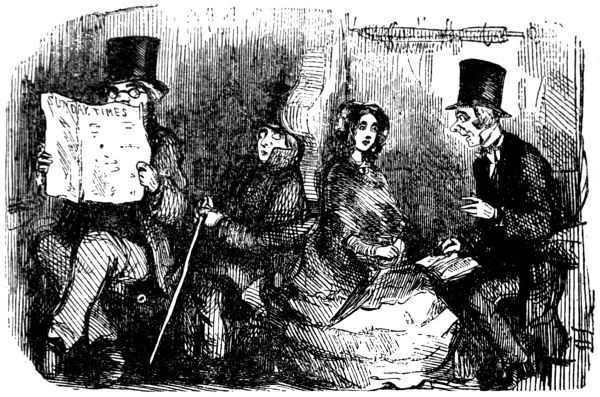
AUTHORS’ MISERIES.
Old Gentleman. Miss Wiggets. Two Authors.
Old Gentleman. I am sorry to see you occupied, my dear Miss Wiggets, with that trivial paper Punch. A railway is not a place, in my opinion, for jokes. I never joke—never.
Miss W. So I should think, sir.
Old Gentleman. And besides, are you aware who are the conductors of that paper, and that they are Chartists, Deists, Atheists, Anarchists, and Socialists, to a man? I have it from the best authority, that they meet together once a week in a tavern in Saint Giles’s, where they concoct their infamous print. The chief part of their income is derived from threatening letters which they send to the nobility and gentry. The principal writer is a returned convict. Two have been tried at the Old Bailey; and their artist—as for their artist....
Guard. Swin-dun! Sta-tion! [Exeunt two Authors.
In taking leave of this very entertaining subject one cannot do better than quote a printer’s “little joke,” which is at once mirth-provoking, and eminently suited as a “tail-piece” for this paper—
☟ ☟ ☟ ☟ ☟ ☟
[97]
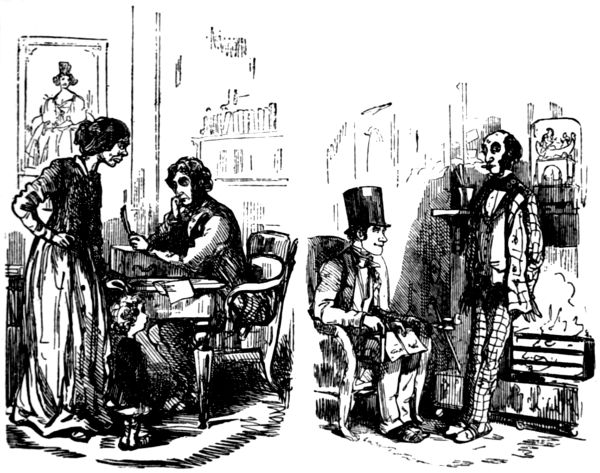
AUTHORS’ MISERIES.
The printer’s boy is sitting in the hall; the editor has written to say that your last contributions are not up to the mark, and that you must be more funny, if you please. Mr. Snip, the tailor, has called again that morning; you have a splitting headache, from a transaction over-night, and as you are writing an exceedingly light and humorous article, your dear Anna-Maria wishes to know how you dare dine at Greenwich, and with whom you dined?
I suppose she found the bill in your coat-pocket. How changed Anna-Maria is from what she was when you married her! and how uncommonly ill-tempered she has grown!
Mr. Tims and a Good-natured Friend.
G.-N. F. Have you read the Macadamiser, Tims?
T. Hem! no. Do people read the Macadamiser?
G.-N. F. He, he! I say, Tims, there’s a most unjustifiable attack upon you in it. Look here. (He kindly takes out the “Macadamiser.”)
T. (reads). “This person is before us again. He is ignorant, vulgar, and a Cockney. He is one of that most contemptible race of men, a professional buffoon. He is,” etc., etc. (Tims reads ad libitum.) Thank you, my dear fellow; it was uncommonly good-natured of you to bring the critique.
[98]
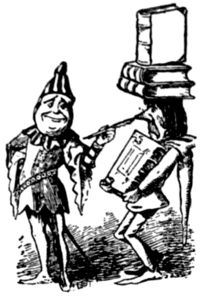
Written after a Visit to the Olympic.
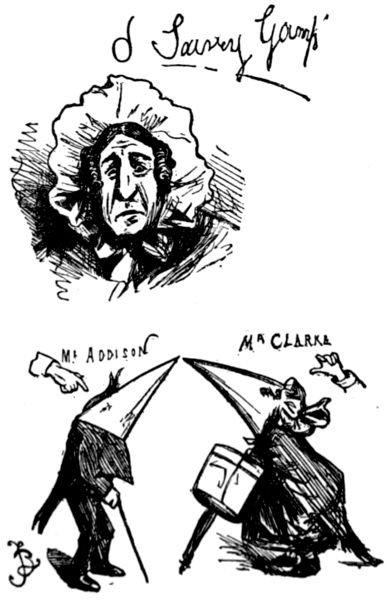
Fun, 1868.
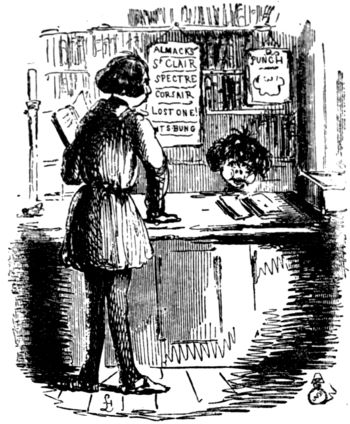
“Is this a libery?”
“Yes.”
“Then let me have the last number of Hemily Fitz-Hosborn.”
[101]
THE EDITOR IN HIS DEN
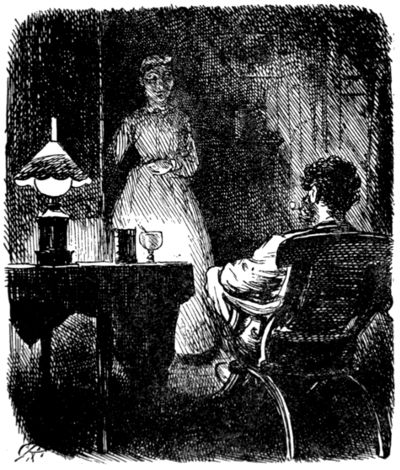
THE EDITOR AT HOME.
Mary. Please, sir, I’ve been looking everywhere for the third volume of that book you was reading.
Lodger. Oh, I took it back to the library this morning. I——
Mary. Oh! then will you tell me, sir, if as how the “Markis” found out as she’d pisoned ’er two fust ’usbands?
[102]
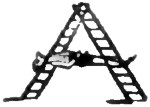
America is the fatherland of Modern Advertising, and Cousin Jonathan’s inherent taste for fun and unconventionality has led him to adopt striking and often humorous methods of appeal. Thus the Washington hotel-keeper who issued a glowing announcement of the attractions of his establishment would certainly lose nothing when he humorously added to his advertisement in a Chicago paper: “Clergymen find this the best place for rest, as book agents cannot climb the hill.”
An enterprising Yankee who runs a hotel at Minnetonka, rejoicing in the somewhat ominous name of Mosquitos Rest, sends forth an announcement remarkable for the manner in which it mixes the sublime with the commonplace. Here is a literal extract—
Delightful scenery. Clam bakes and ox tail soup every morning for breakfast. No cyclones allowed to register. Dogs, children, and other pets not allowed on the grass. Rates range from 3 dols. per day to 21 dols. per week. Excursions to Pike’s Peak every afternoon. Newspaper publishers can all pay their board by promising to give us a write-up when they get home. All kinds of baths on draft.
Perhaps the most amusing descent from the sublime is to be found in the advertisement of the proprietor of a building site in Wisconsin, who offered his land for sale in these terms—
The town of Poggis and surrounding country is the most beautiful which nature ever made. The scenery is celestial—divine; also two waggons to sell, and a yoke of steers.
[103]
A Pennsylvania clergyman who was evidently a bit of a humorist, and was anxious to earn an honest penny outside of his own slender salary, once advertised thus—
Cupid and Hymen. The little brown cottage at Cambridge, Pa., is the place to call and have the marriage knot promptly and strongly tied. Inquire of Rev. S. S. Whitcomb.
What benedict could resist an invitation so gracefully given?
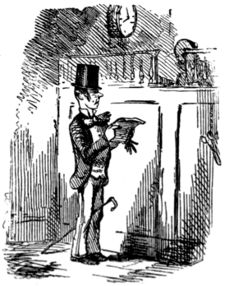
ROMANCE OF ADVERTISING.
“I wish, mister, you’d be so good as to stop the Press and put this in a good place (reads): ‘Hemily. Don’t delay, but return to yer broken-arted Adolphus, or there’s no knowing what may be the consequence!!!’”
It would be difficult to surpass the grim humour of the Pine Tree State gravestone cutter who notified the public as follows—“Such as buy tombstones of us look with pride and satisfaction upon the graves of their friends.” The announcement of an Illinois undertaker, however, runs it pretty close. Here it is—“An elegant stock of neat and nobby shrouds, warranted to give satisfaction to the most particular.”
The column in American papers devoted to “Wants” frequently affords its readers some amusement, either through the eccentricity of the advertiser or on account of some printer’s error. To the former cause, we have to ascribe the appended notice from a Kansas paper—
Wanted an old man of cranky disposition, who will stand no bull-dozing, to work from 3 to 7 p.m.; good salary and light work. Address “Crank.”
Let’s hope this plain-spoken[104] advertiser met with the desirable un-bull-dozable individual he wanted, and that the firm who inserted the following in a southern paper were likewise successful in their quest for a young man of the same kidney—
Artist Poet. Yes, I consider that to be one of my most brilliant effects. It is entitled “Pirates surprised at sunset.”
Editor. Great Scott! Poor fellows, I don’t wonder they were surprised at it!
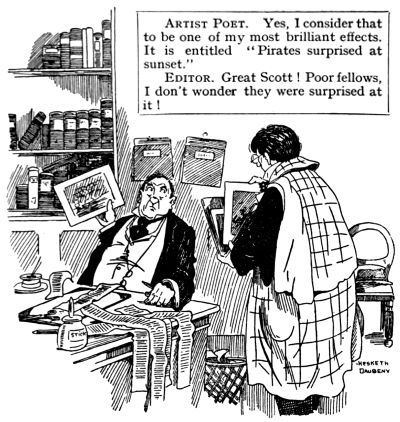
We desire an able-bodied, hard-featured, bad-tempered, not-to-be-put-off and not-to-be-backed-down young man, to collect for us; must furnish his own horse, saddle-bags, pistols, bowie knife and cowhide. We will furnish the accounts. To such a person we promise constant and laborious employment.
As to humour arising from printers’ errors, a whole volume of such amusing blunders might be collected, and the difficulty is to submit one or two of the most mirth-provoking specimens. For instance, a Boston clergyman asks for “a young man to take care of a span of horses of a religious turn of mind,” while another person desires “a nurse in a small gentleman’s family,” and a Texas man applies for a “Boss hand over 5,000 sheep that can speak Spanish fluently.” In our home papers, too, there are many such mirthful mistakes. For example, a notice in a Welsh paper would lead one to believe the advertiser had reached the height of “general utility,” and might be used for sleeping in, for packing in, for hammering about, or for storing goods in, and that he had been accustomed to that for seventeen years! Look you now—
Man seeks situation as bedstead, box, packing case, rough carpentry, or warehouse; 17 years’ character.
[105]
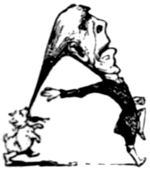
Apropos of American advertising, two amusing instances of unexpected effects are worth recording. It was a Cincinnati firm who a few years ago sent out a corps of artists who decorated all available dead walls with the legend—
USE DR. BROWN’S AGUE CURE.
A few weeks later another band of paint-brush wielders struck the trail of Dr. Brown’s advertisers, and as the result the rural population was thus advised—
TAKE SMITH’S SARSAPARILLA,
AND YOU WON’T HAVE TO
USE DR. BROWN’S AGUE CURE.
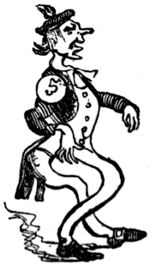
FANCY PORTRAIT—
OLIVER TWIST.
It was in Baltimore where the town was liberally supplied with imperative commands to “Take Ayer’ Pills!” One of these notices was inscribed on the rail of a board fence immediately underneath which some zealous colporteur had appropriated a rail for the admonition, “Prepare to meet your God!” A wag, taking advantage of the situation, connected the two inscriptions with a conspicuous “and,” and thus left them.
The Jap, a slavish imitator of Western customs, has adopted the methods of Western advertisement, although his knowledge of the English language leaves something to be desired. The following is an extract from an announcement of a certain teeth powder sweetly named “Naniwakusurihamigaki,” which appeared in an Anglo-Japanese periodical—“This Teeth Powder is not common thing, as be selled in the world, it is powerful to hold the health of teeth, and recover the teeth from its sick. If you only examine you should find that I never tell a lie.”
[106]
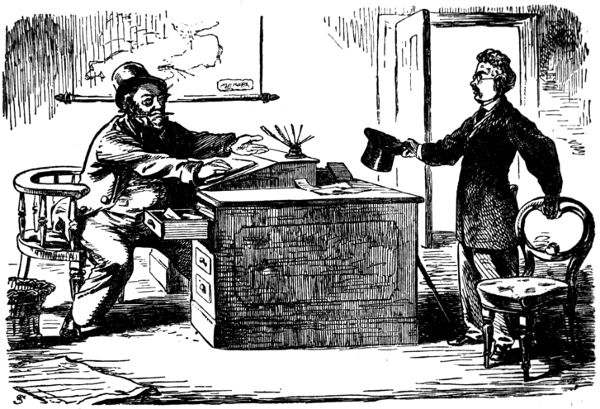
A FACT!
Little Quiller has a great idea of the dignity of literature as a profession, as also of its professors generally—Quiller particularly. He has submitted a large parcel of MS. to a publisher for approval, and calls to ascertain the result.
Publisher (loq.). Hoh! Mr. Quiller? Yes, sir, I’ve not read your stuff, but I’ll tell you what I’ll do; I’ll take it on spec, and toss you—sudden death—ten bob or nothin’ for it!
[Poor little Quiller
[107]
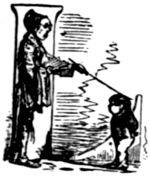
Indian native journals published in what is alleged to be English, but what is better described as “Baboo,” also afford many examples of the humours of advertising. Let us take one specimen which appeared in the original surmounted with the Royal Arms—
I the undersigned obedient monk and Tomb’s slave of Khaja Mainudin Chishti emporor of India inhabitant of Ajmere most humbly beg to every one gentleman, that if anybody might be suffering with demon, fairy, magic and fury, from any long time, or any sort of patient, who cannot be cure by any sort of medical treatment, they should attend at Mote Bazar in Memon Kader Fakir Mohomed’s house No. 383 from 6 to 12 a.m. and 3 to 5 p.m. all the abovementioned patients will be cure by pronouncing some words and blowing upon water, spiting and amulet, by the grace of the Almighty Creator.
If anybody is suffering with weakness and privacy in eyes, they will be cure by the medicine.
If anybody wishes to take examination for the above mentioned questions, the undersigned can answer for his any question very easily and several times the undersigned was made contrast with great enchanter in Calcutta at Kalighat and in Malbar, but by the grace of God Kaja saket the undersigned has been successful upon them.
Some days ago the undersigned was in Calcutta, and he cure there lots of patients by the grace of God, which was related by the Calcutta Newspapers, hoping several gentlemen might be known by reading the Calcutta newspapers, and the late Governor General Lord Ripon were very kind on the undersigned on account of above mentioned abilities, and many times I had been visited with them in Calcutta and Shamla, and surely nobody will return hopeless from the door of Khaja Mainudin Chishti emporor of India by the grace of God.
The following notice appended for the benefit of local English residents to the announcement of a masked ball at Lorenço Marques, also deserves a place among these specimens of the Humours of Advertising—
A great Mascared Ball!
it will take place at Ultramarino Hotel in the 16th of instant
all the mascareds must be in respectible conditions
Mascareds witt religions or politic dresses are not allone
The tikets can be obtaine at Messrs. Rodrigues & Cunha and alco
in the same Evening at the Ultramarino Hotel
Price of the tikets 4/6. Free for the mascared ladies.
Let us go to the Ball.
[108]
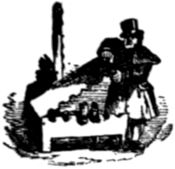
Locke on the
Human
Understanding.
A glance at the business life of the far East shows us that out there Western customs are steadily gaining ground, although in that queer land of China nothing appears to be new, for long, long ago they advertised their shops with sign-boards inscribed after this fashion—“Shop of Heaven-sent Luck,” “The Shop of Celestial Principles,” “The Nine Felicities Prolonged,” “Mutton Shop of Morning Twilight,” “The Ten Virtues all Complete.” Here you have poetry and business combined, while in “The Honest Pen Shop of Li,” you have a guarantee that your pens will follow the best policy, although the shopman’s name is just a wee bit suspicious. John Chinaman shows his love of contrariness surely when he advertises a charcoal shop as the “Fountain of Beauty,” a coal depôt as “Heavenly Embroidery,” or an oil and wine establishment as the “Neighbourhood of Chief Beauty,” and we can easily imagine the fiendish chuckle with which the proprietor of an opium divan advertised his shop as “The Thrice Righteous.”
“I have just been having a chat with young Jones. Smart young chap, he seems, but very unlucky. He’s on the Press, I understand.”
“Yes; he tries to squeeze a loan out of everybody he meets.”
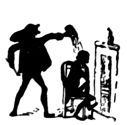
Burton on Melancholy.
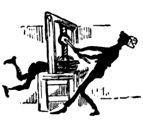
Securing a friend in the Press.
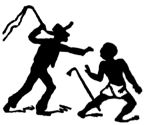
Jonathan Wild.

Burton on Melancholy.

Securing a friend in the Press.

Jonathan Wild.
[109]

Wishing to get from Chicago to Memphis, a young newspaper man purchased a “mileage” book from a “ticket scalper”—or illegal dealer in unfinished mileage tickets. The book had been the property of a reporter for the Louisville Courier-Journal, and the description in the cover was alarmingly different from his own. The sharp-eyed conductor immediately noticed this.
“Are you on the Courier-Journal?” he asked suspiciously.
“Oh, yes. I’ve been a reporter there for several years.”
The conductor asked for some identification, which naturally the passenger was unable to give.
“I have it,” said the conductor, suddenly remembering. “It just happens that Henry Watterson, Editor of the Courier-Journal, is on the Pullman ahead. If you’re all right he ought to be able to identify you.”
At this the young man all but collapsed. However, there was nothing to it but to take a chance. When they found Henry Watterson the conductor handed out the mileage book, and, pointing to the young man, asked if he was a reporter on the Courier-Journal.
“Yes, indeed,” was the quick reply. “He is one of our best men. How are you, Robert?”
Breathing a prayer of thanks, the young man returned to his seat and resumed his journey without further trouble. Next morning, in the dining wagon, he saw his friend and timidly approached him.
“Colonel Watterson,” he said fervently, “I can’t tell you how grateful I am for what you did for me yesterday. I——”
“Tut, tut. Don’t mention it,” returned his benefactor. “You did every bit as much for me. I’m not Henry Watterson. I’m just travelling on his pass.”
Everybody’s Magazine (U.S.A.).
[110]
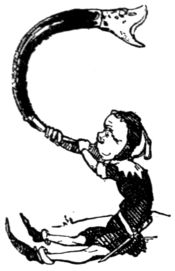
Supposing you wish to contribute to a public charity, send your money to the Editor of a newspaper. He must acknowledge the receipt of it, and so you get your name and benevolence advertised in the best part of the paper for nothing.
2. Another good method, if you are fond of appearing before the public, is to request the Editor to state that “the Richard Jones who, in our police report of yesterday, was sentenced to Bridewell for shoplifting, is not the Mr. Richard Jones, the respected chiropædist of Sackville Street.”
3. If you are writing to a political newspaper, never mind about writing on the two sides of the paper, as, depend upon it, it will be a recommendation in your favour if the Editor sees you can write well on both sides.
4. You need not be particular about writing legibly, as it stands to reason, if the Editor cannot read your letter, that you will be spared the mortification of reading in the next day’s Notices to Correspondents, that “Philo-Justitiæ is an ass.”
5. It is usual in sending a statement, which impugns the character of another person, to send your name and address with it; but, as in matters of libel this is a very troublesome as well as a very expensive plan, it is better to send anybody else’s card rather than your own. By this means you avoid publicity, and have the double gratification of annoying two persons at once.
[111]
6. Inserting your death one day, and contradicting it the next, is another very cheap plan of advertising in a newspaper. Besides, you have the advantage of learning in your lifetime what your friends think of you after your death. This plan, however, will only answer once.
7. It is better, perhaps, not to send any poetry to a newspaper. We never recollect an instance of the Times inserting “A Sonnet to a Sow,” or “Lines to my Mary.”
8. Be careful of quotations, especially in a foreign language. If an editor knows his own language well, it is as much as you have a right to expect of him.
9. Never send anything to a newspaper “to be continued,” unless it is a legacy or a dozen of port.
10. Never trouble yourself in calling to see the Editor of a newspaper. It is a strange circumstance, but you might call a hundred times and always find him “out.”
Punch, 1844.
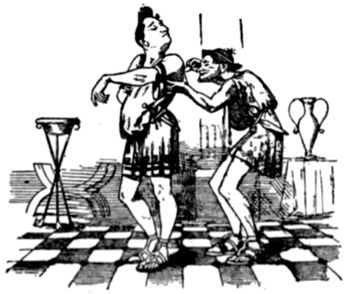
A NEW READING.
Dedicated to the Publishers of Shilling Shakespeares.
“And when the fit was on him, I did mark——”—Julius Cæsar, Act i. Sc. i.
[112]
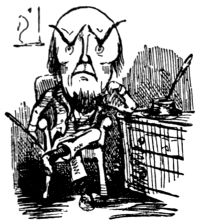
We sink in our own estimation as we sit down to write; we blush involuntarily, although we are in the deepest solitude; we look at our arm, in dread lest we should find a napkin hanging on it, in true waiterish attitude; we rush to the glass to ascertain whether our neck is encompassed by the conventional little white tie; and we have to look around us. No wonder! For just look here! Did audacity ever go so far? Was impertinence ever so consummate?
A gentleman, disengaged after six p.m., requires evening employment, in any capacity not menial. Good correspondent and accountant, draughtsman and composer. Would undertake London correspondence of a country paper, write critiques, etc. Terms moderate.—Address, W., etc.
A “gentleman” who wants employment “in any capacity not menial,” “would undertake London correspondence of a country paper, write critiques,” etc. Obviously the advertiser considers literature something a little above the work of a menial. We are, of course, obliged for this admission. Nevertheless, we confess the above advertisement has given us some doubts as to whether we shan’t find Jeames, with his fine leg, on Grub-street pavement one of these days. We would advise “W.” to go to a Dutchman, who advertises that he can supply “literary hacks”; the literary livery stables are situated somewhere up in Bloomsbury; and, no doubt, for a small sum he may be groomed down any time after six, and, with the help of a farthing rushlight in a dark lantern, find his way up Parnassus. We can tell him, however, that it would be advisable to avoid the Temple of Fun, as individuals similarly constituted to himself have before now been severely kicked, as a reward for their audacity, in that neighbourhood.
Fun, 1863.
[113]
Studies from the Study
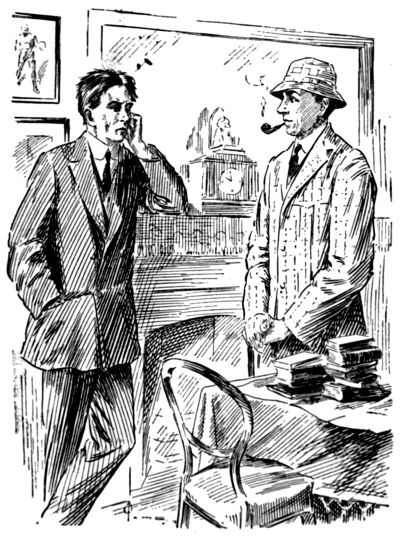
First Student. Just my luck! I wired to the governor to send me £5 for some books.
Second Student. He refused?
First Student. No, he’s sent the books.
[114]
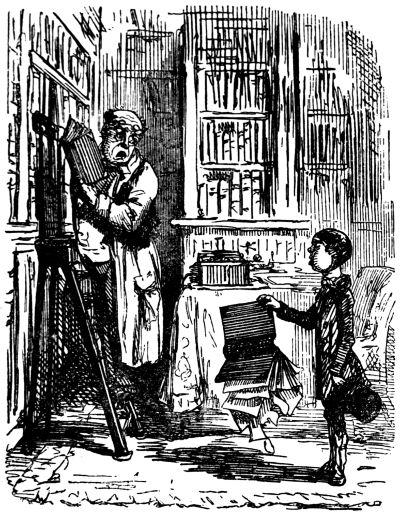
RETURNED—WITH THANKS.
“If you please, sir, master’s sent back the first volume, and he says, will you be so good as to let him ’ave the second?”
The anomalies of English spelling and pronunciation have many a time served our humorous writers with capital material for their rhymes. The following is one of the cleverest of the kind referred to:—
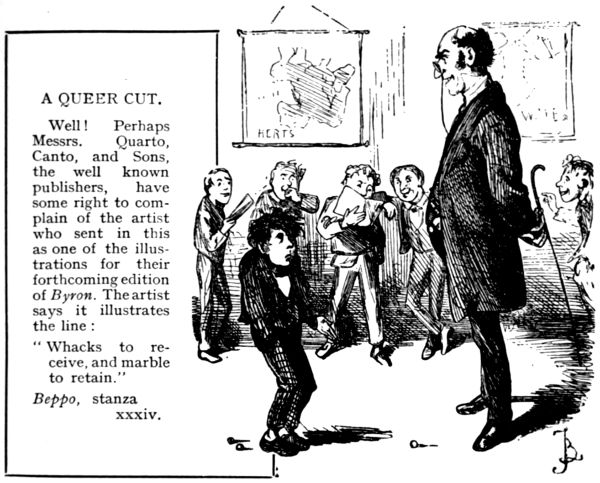
A QUEER CUT.
Well! Perhaps Messrs. Quarto, Canto, and Sons, the well known publishers, have some right to complain of the artist who sent in this as one of the illustrations for their forthcoming edition of Byron. The artist says it illustrates the line:
“Whacks to receive, and marble to retain.”
Beppo, stanza xxxiv.
Alliteration has long been a favourite target for the arrows of wits, though most of them are forced to acknowledge its “artful aid.” It requires a very considerable command of the English language, however, before a rhymester can concoct five quatrains in which every word commences with the same letter. This is the diverting composition[116] here referred to; it is supposed to be a serenade sung by Major Marmaduke Muttonhead to Mademoiselle Madeline Mendoza Marriott—
[117]
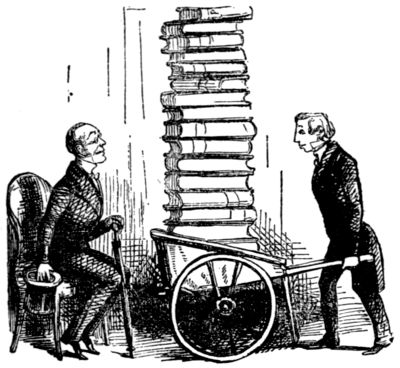
Librarian. You asked to see the catalogue of the letter P, sir? I’m sorry it’s not yet completed, sir, but I’ve brought you all there is, as far as it goes.
Depend upon it, the Catalogue of the British Museum is not a work for one time, but for all ages!
The following is another and more varied example of alliteration wilfully overdone—
These specimens may not be the best that can be quoted; I do not suppose they are, and should indeed be audacious were I to submit them as such. Addison’s assertion as to false wit will, no doubt, stand as firm as ever in the minds of most people after reading these notes on “The Poets at Play.” All that has been here attempted, and thus much perhaps the indulgent reader will grant, has been to show that there may be found in what the famous essayist would have us condemn as unworthy many characteristics of wit, humour, and ingenuity; and not only these, but examples of the patience and painstaking which are near allied to “genius.”
[119]
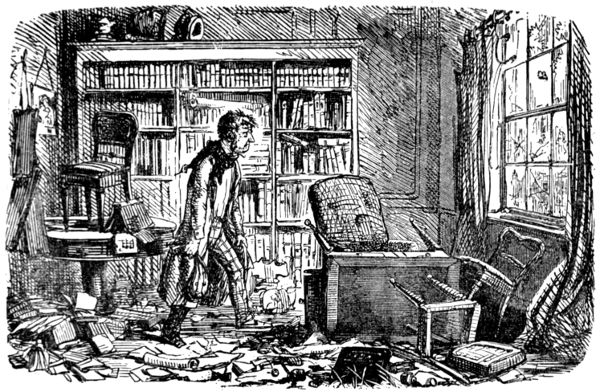
SUBJECT FOR A PICTURE—IRRITABLE GENTLEMAN DISTURBED BY A BLUEBOTTLE.
[120]
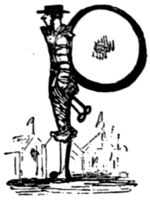
Perhaps the Americans are ahead of us in advertising; but there is no little enterprise and good humour displayed in that business on this side the Atlantic. In the street of a northern town one day, the writer was presented with a handbill which will bear comparison with many such transatlantic compositions. It was issued by a tea merchant, whom we will refer to as “Smith.” In great black letters was the heading, “Ananias Redivivus,” then came the pointed queries, “Had Ananias any descendants? If so, what became of them? Did they emigrate to Scotland?” From the contents of the bill I take the following, which, I should state, was “displayed” in a most effective manner—
The judge says the resetter is as bad as the thief.
Smith says the foolish buyer is as bad as the lying advertiser.
The judge says, no resetters, fewer thieves.
Smith says, no foolish buyers, no lying advertisers.
Why? Because, if there were no fools, it wouldn’t pay.
Thus the resetter is only responsible for some of the thieves; but the stupid, foolish buyer is entirely responsible for all the lying advertisers; and by dealing with them becomes a participator with them in their wickedness, which brought such disastrous consequences upon Ananias.
But the way to know them is this—Use all the common-sense you have been blessed with, and when you read such an advertisement as—“Best tea the world produces, 1s. 7d. per lb.,” if you don’t say the advertiser is a common, bare-faced perverter of the truth, a lineal descendant of Ananias, one with whom poor old Ananias would not have had the ghost of a chance for boldness and audacity, then you have been blessed with very little.
But did it pay Ananias? Will it pay his descendants?
Here is a text for our popular preachers. I have actually heard well-dressed, intelligent-looking people praise such men as clever; as if it were clever to tell a lie, a game at which the biggest rogue can beat the best gentleman.
Lately the Chinese objected to the government planting a certain kind of tree in their streets. When asked the reason, they said it would spoil their business, as it was one of their holy trees, and they could not tell a lie under its shade.
[121]
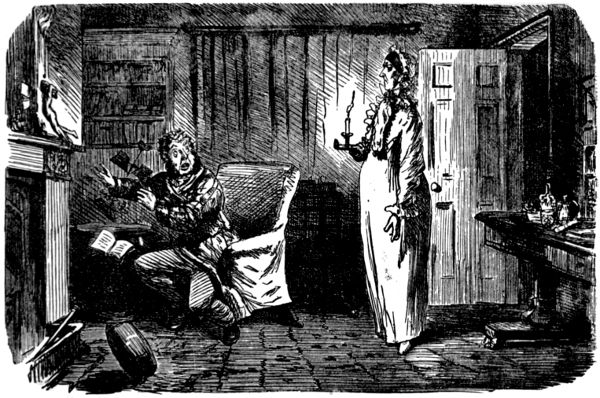
AN AWFUL APPARITION!
Mrs. T. (to T., who has
been reading the popular novel). Pray, Mr. Tomkins, are you never coming upstairs?
How much longer are you going to sit up with that Woman in White?
[122]
A few trees of this sort wanted in the streets of Glasgow.
Now, although not under the shade of a holy tree, I speak the truth when I most emphatically declare that my tea at 1s. 6d. per lb. is better than that sold as the “best tea the world produces, 1s. 7d. per lb.”
We have in the foregoing an instance of a disciple of the good George Washington airing his Biblical knowledge, and in the same way we find a Birmingham bootmaker parading his acquaintance with the divine Shakespeare thus wise—
Why does not some cobbler making use of the bard’s writings thus—“All that I live by is with the awl. I meddle with no tradesman’s matters nor women’s matters but with awl. I am, indeed, sir, surgeon to old shoes; when they are in great danger I recover them.” [Trade journals please copy.]
These shoemakers would appear to be quite a literary lot, for in a certain east coast town of Scotland an enterprising member of the craft enlisted the tuneful muses to extol his trade—or, mayhap, it was some relative of the poet “Slum” who rolled his eye in a fine frenzy, and produced these exquisite lines—
The English papers, like their American contemporaries, are rich in amusing advertisements of the “wants” class. Here is one that appeared in a newspaper published in a university town, which probably accounted for the “scholarly” tone of the notice—
Missing.—A black spaniel dog named “Blen,” whose owner’s address is—— It is asserted by some that Honesty is the Best Policy, and that Virtue is its own Reward. If the present possessor of the dog supports this view, his course is clear. In any case, no greater reward will be offered.
[123]
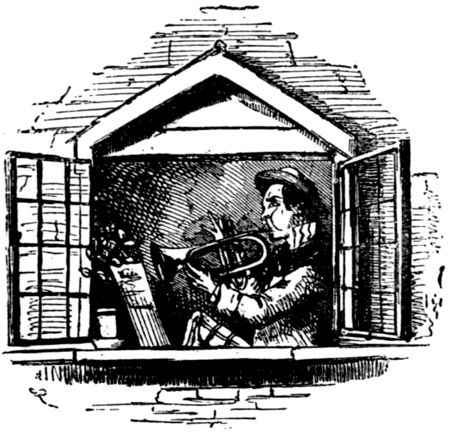
HOW NO. 4 ENJOYED HIMSELF.
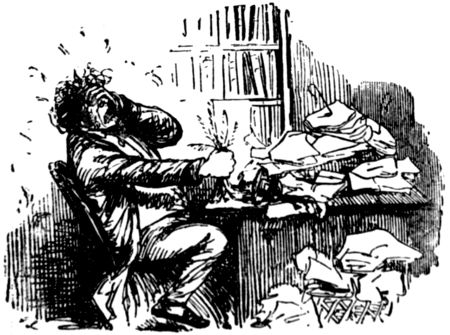
HOW NO. 7 SUFFERED IN CONSEQUENCE.
THE MUSICAL NEIGHBOUR.
[124]
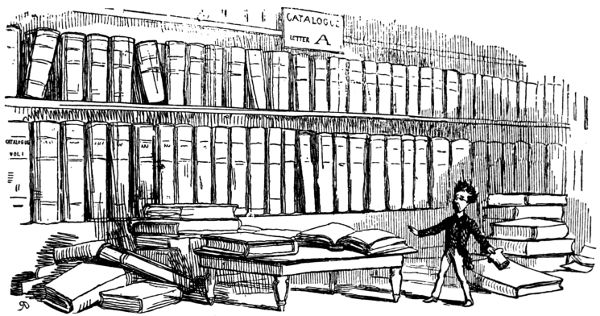
GENTLEMAN, WISHING TO REFER TO THE CATALOGUE OF THE BRITISH MUSEUM, IS SHOWN A VERY SMALL PORTION OF THAT WORK.
[125]
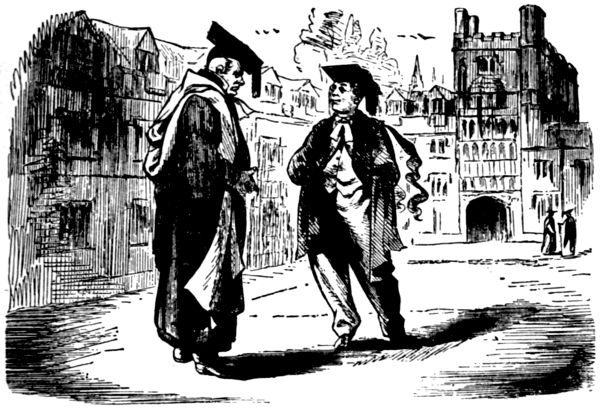
Professor. Of course you will be prepared with your analytical papers?
Undergraduate. Anna Lettical? I don’t know her, sir; but I know a capital song about Annie Laurie, if you’d like to hear that!
The gentleman who inserted the following in a London daily, and desired replies to be sent to “Disgusted,” had apparently experienced the joys of life in lodgings—
Required, in the West End, for a permanency, sitting and two large bedrooms, nicely furnished. Do not reply if related to the nobility, unaccustomed to receive, or animated by any other reason than a desire to secure the amount paid for apartments, etc. Marketing done personally. Careless or unskilled preparation, waste, or mysterious disappearance of the things provided not tolerated. So-called musical evenings, cheerful family, tennis lawns, imitation gardens, select society, etc., regarded with indifference. Hypocrisy and snobbishness disliked. Preferred and insisted upon instead—good cooking, prompt attendance, scrupulous neatness, and a plentiful supply of clean house linen. A written agreement to be made and mutually complied with. State inclusive terms and full particulars. N.B.—Inclusive terms means “no extras.”
[126]
A London weekly once gave insertion to the appended notice, evidently the work of a wag, and intended as a skit upon a rather romantic episode which transpired about the time, when a lady played kidnapper, and a member of the sterner sex figured as the kidnapped—
Matrimony.—Wanted, a rich American or English lady to kidnap advertiser, who is of fine physique and well developed, in fact, a Samson, who would not mind a trip with comfortable quarters on board a yacht during the honeymoon, especially if the lady is amiable. Genuine.
This recalls an advertisement from an otherwise-minded young man. It appeared in an American paper—
A young gentleman on the point of getting married is desirous of meeting a man of experience who will dissuade him from such a step.
Probably some one referred this cautious youth to Punch, of a certain date, where the proper advice was given.
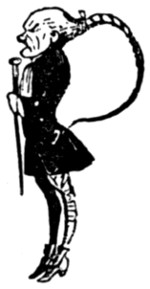
Ballad for Music.
Fun, 1866.
[127]
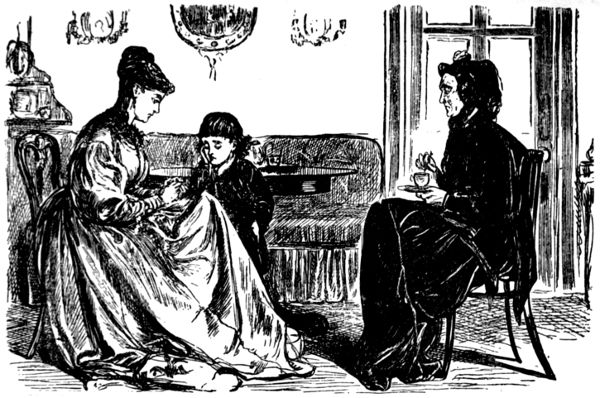
Miss Frump (author of the “Ghoul-haunted Grange,” etc., etc., etc.). Can your little boy read?
Mamma (modestly). Not very well, as yet.
Little Boy (pertly). I can read better than you, mamma.
Mamma. What do you mean, child?
Little Boy. Why, you said you couldn’t read Miss Frump’s new book! [Awkward silence.
[128]
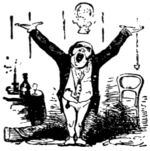
Fun, 1867.
[129]
(The right of translation is reserved.)
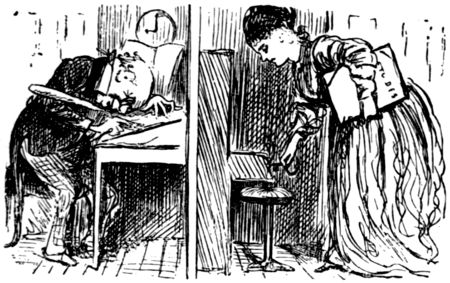
CHAPTER I.
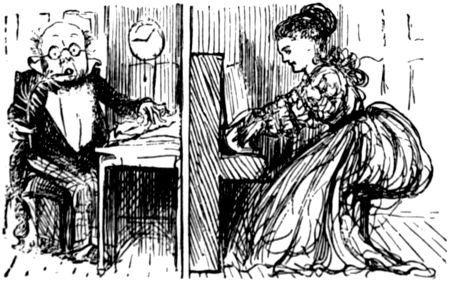
CHAPTER II.
[130]
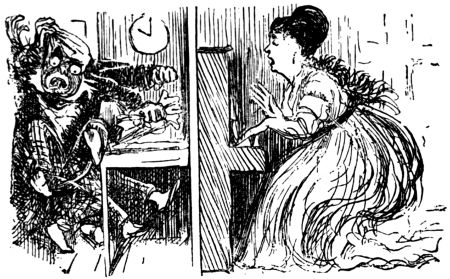
CHAPTER III.
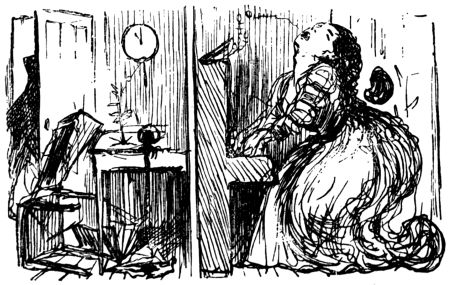
CHAPTER IV.
[131]
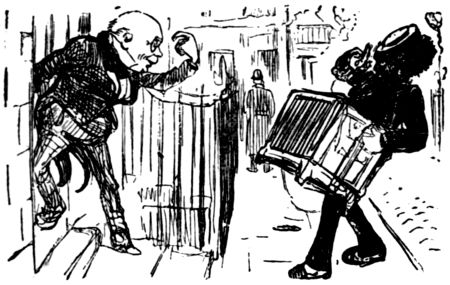
CHAPTER V.
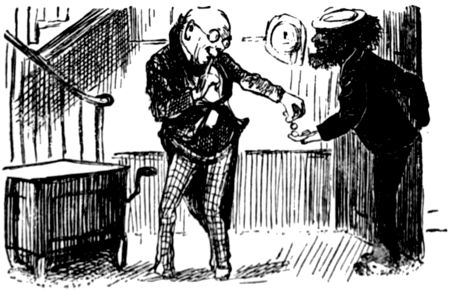
CHAPTER VI.
[132]
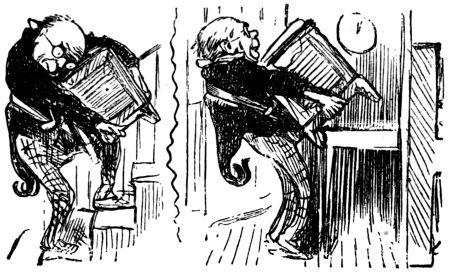
CHAPTER VII.
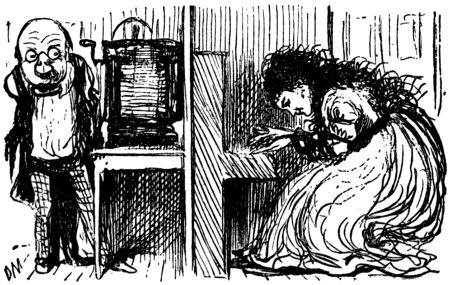
CHAPTER VIII.
[133]
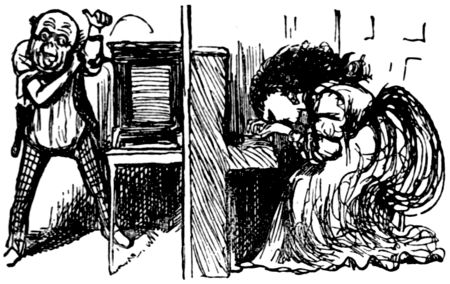
CHAPTER IX.
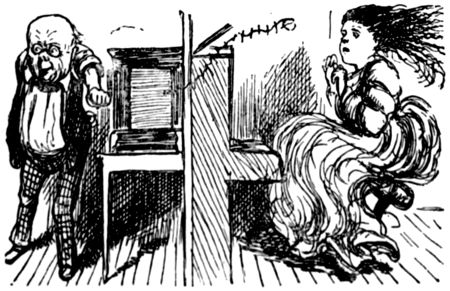
CHAPTER X.
[134]
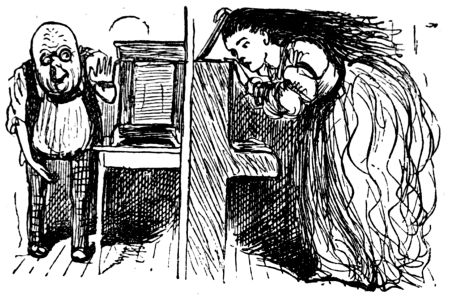
CHAPTER XI.
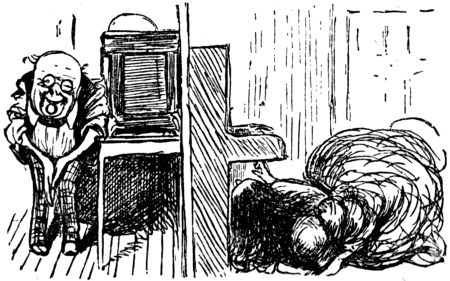
CHAPTER XII.
[135]
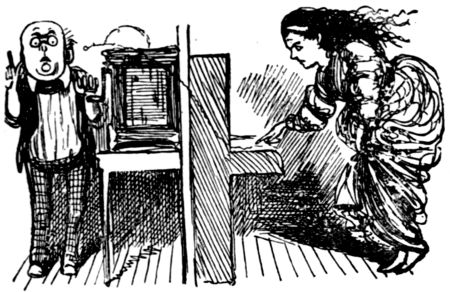
CHAPTER XIII.
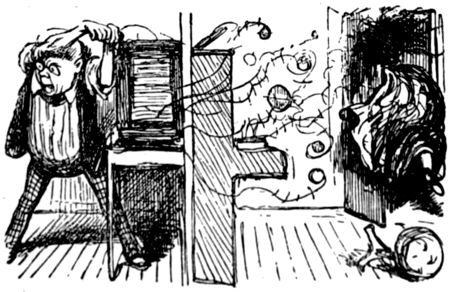
CHAPTER XIV.
[136]
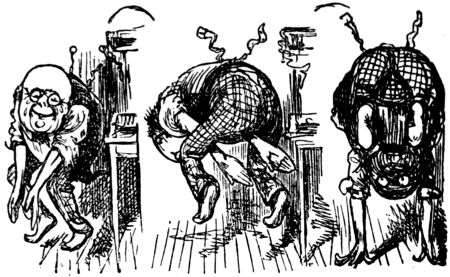
CHAPTER XV.
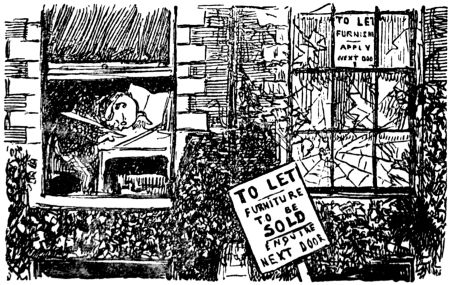
CHAPTER XVI. (THE END.)
[137]
FUN IN THE STUDIO
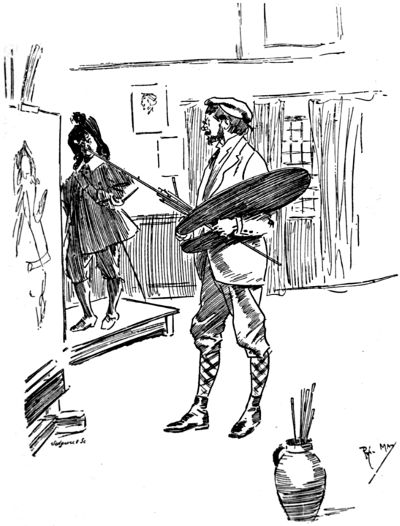
Irish Model. Would ye moind telling me, sorr, who was the greatest arrrtist iver been—av course, prisent company always excepted!
[138]
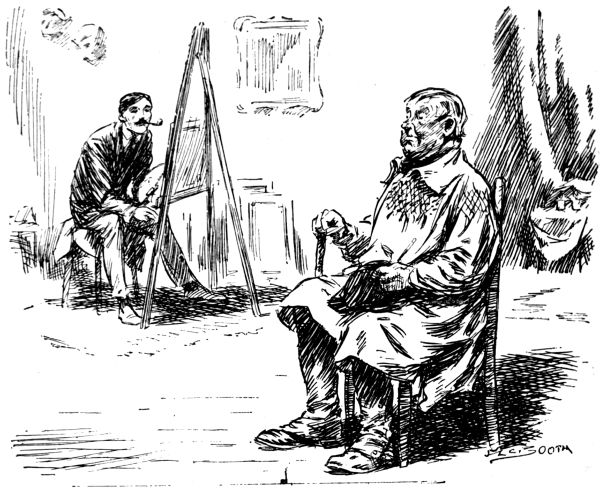
Artist (to country model). You’d better “rest” a bit. Sitting still seems very tiring to you.
Model (mindful of instructions of local photographer’s). It ain’t the sitting still, mister. It’s the ’olding me breath!
According to a most unlikely story, the late Phil May was once on his uppers in a small town in Australia. To stave off starvation he sought and found employment as a waiter in a fourth-class eating house. One day a man who had known the artist in London dropped in and took a seat at one of the tables. When May went to take his order mutual recognition followed.
“Phil May!” the visitor exclaimed. “And compelled to work in a hole like this!”
“Yes,” retorted the artist indignantly. “I’ve sunk pretty low, but I haven’t yet got so far down that I have to eat here.”
[139]
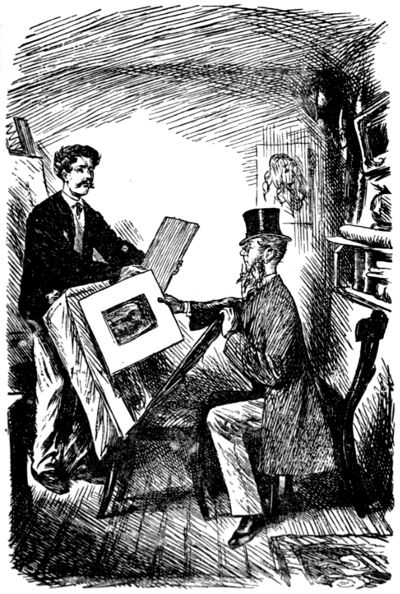
WHOLESALE!
Patron (yawning). Augh, well, these sort of things are all much the same to me. I’ll take a lot by weight—mounts and all. How much a pound for this lot?
[140]
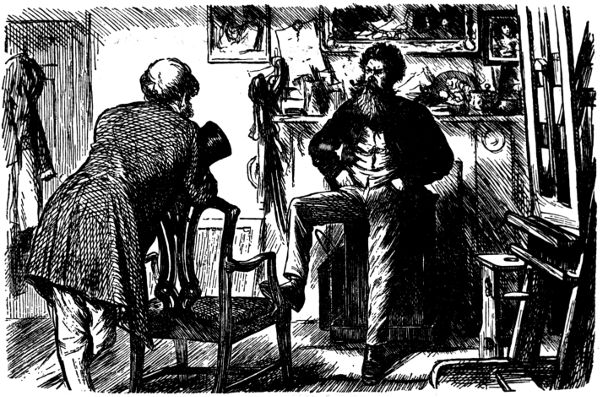
“QUALIFICATIONS.”
Painter (who has always been ambitious of “writing himself down an R.A.”). Think they might have elected me, having exhibited and had my name down all these years! I might have——
Friend (man o’ the world). My dear fellow, I’ve always told you, you don’t go the right way to work. You see they could only elect you for your painting, for—why do you wear such thick boots?!!
[141]
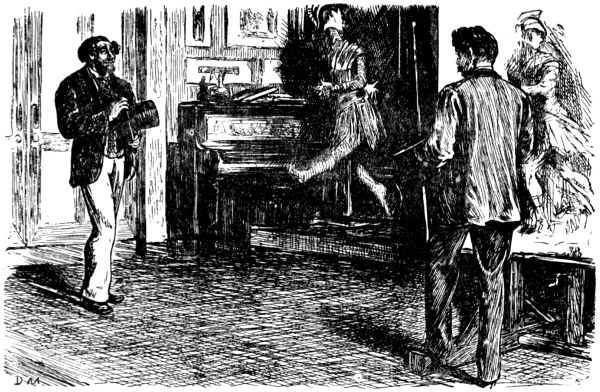
BEHIND THE SCENES.
Artist. Hullo, Jakes! How’s this? I’ve been trying to do without you—I thought you said you couldn’t come this morning?
Model. So I did, sir! I was engaged to Mr. Macmough, to sit for the legs in the Dook of Hipswich’s portrait.
Artist. Well?
Model. Well, sir, whiles I were a-sitt’n, the Dook he come in quite hunexpected like; an’ when he see me, he says he’d a deal sooner sit for his legs hisself. So I come on straight here!
[142]
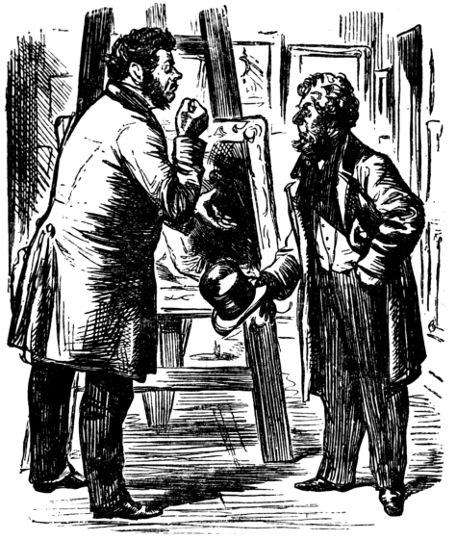
“ASKING FOR IT.”
Ferocious Dealer. Now, if any man will tell me that that’s a copy, I’ll—I’ll knock him down!—What’s your candid opinion?
[143]
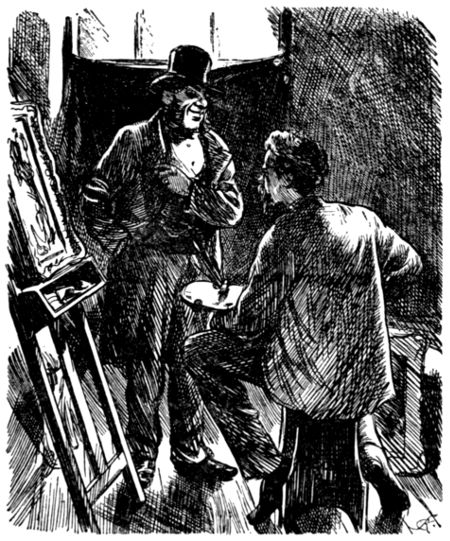
THE COMMERCIAL SIDE.
Painter. You don’t mean to say you want me to sign it, when I tell you I did not paint it? And a beastly copy it is, too!
Picture-Dealer. Vy not, goot sir? vy not? Tut! tut! tut! I only vish you artis’s vos men of bis’ness!
[144]
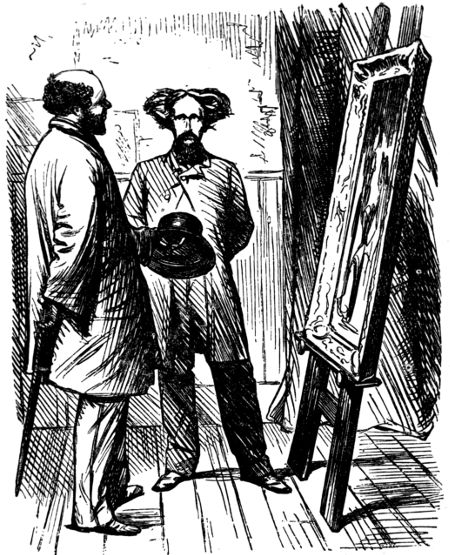
GADDY’S ACADEMY PICTURE ON VIEW.
Art Critic. You see you’ve got the duke seated and the duchess standing up. Now couldn’t you make the duchess sitting down and the duke standing up?
[But Gaddy fears the council will not put off the exhibition for a couple of months to enable him to take advantage of his friend’s valuable suggestion.
[145]
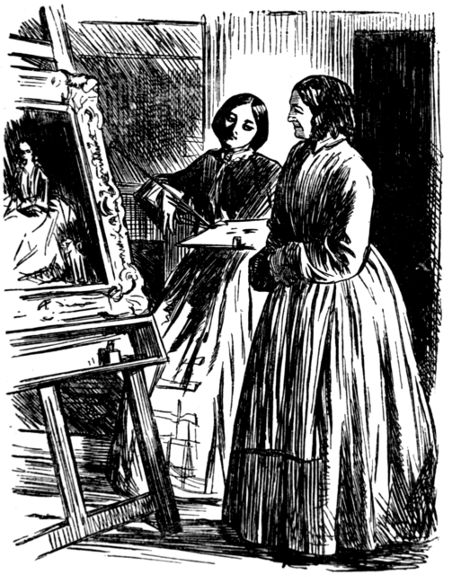
“FLATTERING.”
Cook. Laukadaisy me, Miss Mary, if it ain’t a’most like wax-work, I dew declare!
[146]
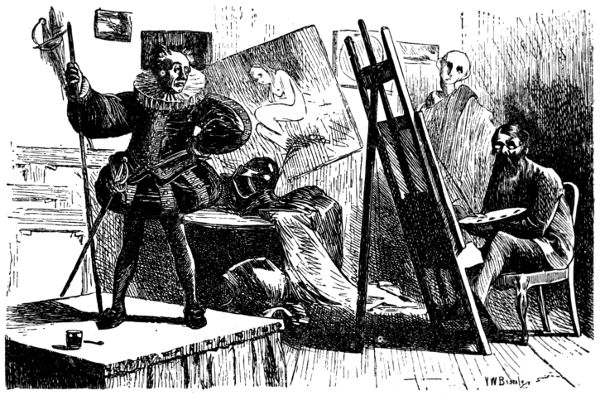
PROFESSION AND PRACTICE.
Painter. Wouldn’t care to be a painter, eh?
Model. Dear, no, sir! Rather be a doctor—their work ain’t so criticised, and it don’t much matter whether it’s kill or cure.
[147]
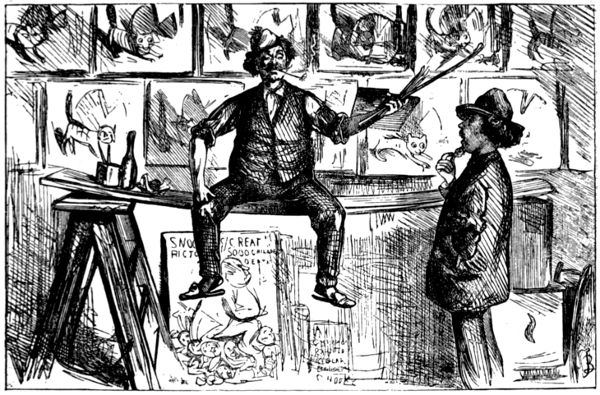
Rapid Genius. ’Ow do I manage it? Why, fust of all I takes the brown and does all the cats and the rinds of the cheeses—then I takes the yaller and goes over the cheeses, and puts in eyes and stripes to the cats. With a brush o’ black I puts in the bottles and the mice; finishes up with a dab o’ white on the bottles and in the mice’s heyes—and there you are!
[148]
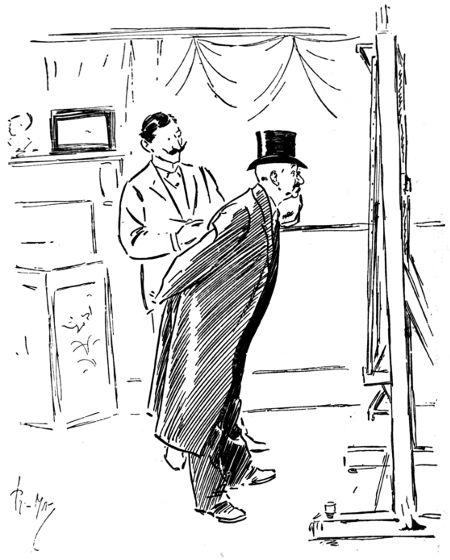
Critic. De bicture you haff bainted is most peautiful; der is only von vordt in the English langweege vot describes eet, and I haf vorgotten eet.
[149]
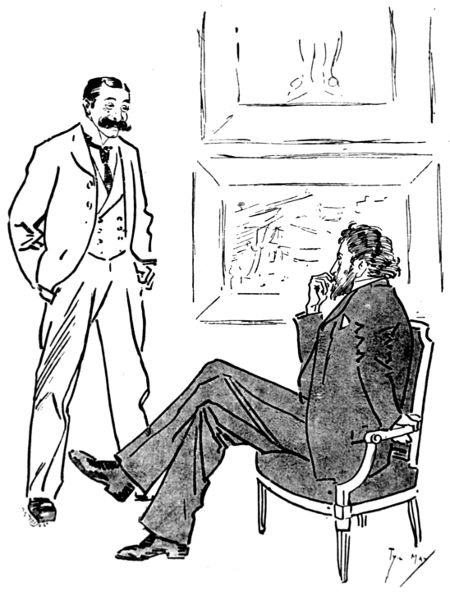
Jones (to Brown, who has been to a ball at Robinson’s). Many women there?
Brown. No; only their mothers.
[150]
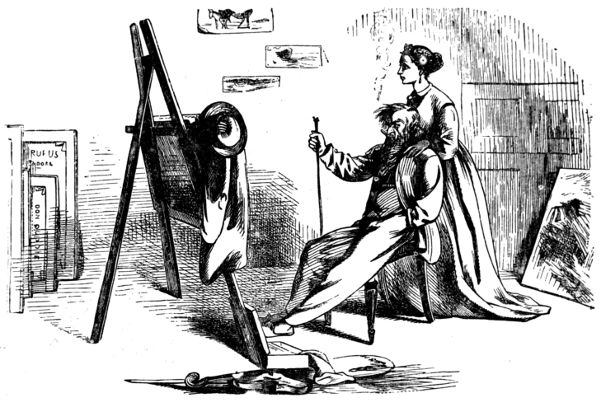
FOR EXHIBITION?
Painter. Oh! they won’t hang it, I know—’tis of no use sending it.
Wife. Well, Michael, if you keep it here they won’t hang it, we know—send it and try: they hang bad pictures sometimes. [Michael is encouraged.
[151]
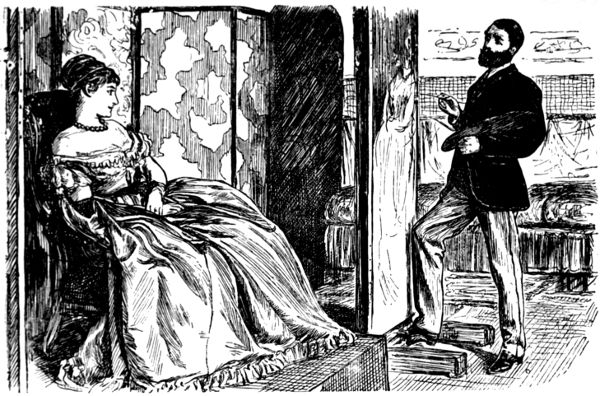
PRETTY INNOCENT.
Lady. Oh, Mr. Mastic, why do artists have screens about their studios?
Artist. To back up the figures, and so on.
Lady. Oh, really! Well, I thought it was to keep the bedstead and all that out of sight, you know.
[152]
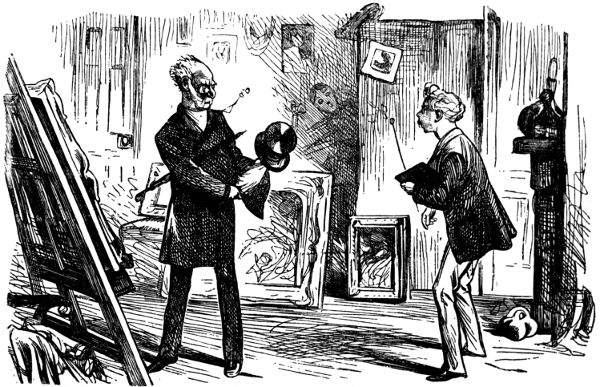
“AYE, THERE’S THE RUB!”
Irascible Patron (who has wiped out a good deal of Funkie’s great work). Confound your nasty picture, sir! See what it has done! The canvas is reeking with paint, sir—positively reeking! It’s disgraceful! [Exit in a whirlwind.
[153]
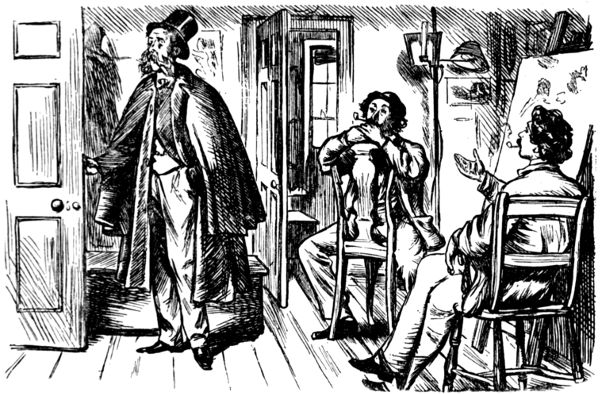
Artist (to his hypochondriacal friend with an independence). Ah! my dear fellow, if you had to work hard and get your own living as we have, you’d have no dyspepsia, I’ll be bound; good-bye.
[154]
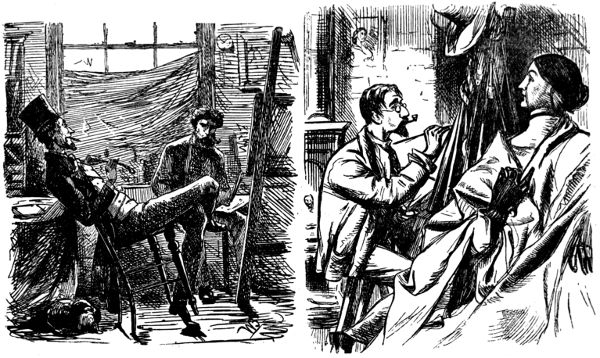
THE MARCH OF SCIENCE.
Artist (as a hint to his friend). Bless me! Five o’clock! I had no idea it was so late. How quickly time does fly now!
Yankee. Which I calc’late it’s all owin’ to the vast improvements effected in clocks by our great country.
THE REAL.
Mary Jane in reply to Olivia.
“The same romantic creature as ever! His name is not Algernon, but plain Robert; and he’s not an Apelles, but a hard-working fellow, with enough of genius to make me proud of him. As to his model—etc., etc. [For “The Ideal,” see p. 156.
[155]
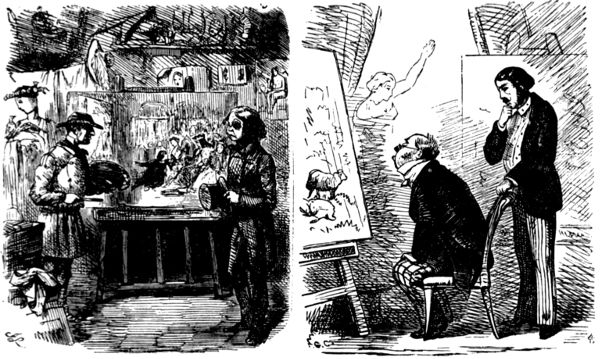
PLEASURES OF THE STUDIO.
At the beginning of April, when every moment is of consequence, Mr. Flake White’s model for Hamlet appears with a black eye, which he declares is the effect of influenza.
A HAPPY MEDIUM.
Dealer. Ah! there’s good transparency there. What do you mix your colour with?
Artist. Brains.
[156]
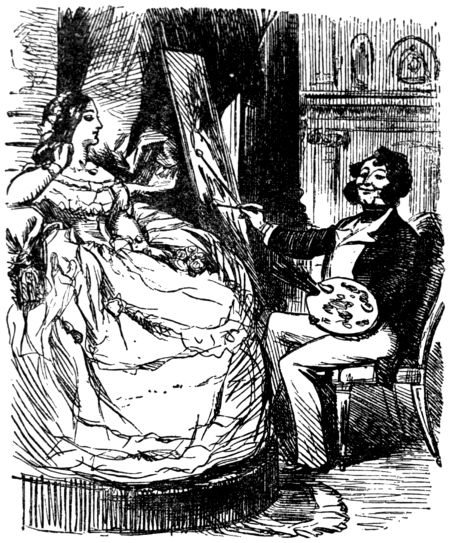
THE IDEAL.
From Olivia to Mary Jane
“And so, dearest, you have married an artist! How like you, who was always such an admirer of the beautiful. * * * I can see you ‘in my mind’s eye’; your Algernon (his name is Algernon, is it not, dearest?) seated like another Apelles at his easel, whilst you, his own Cantaspe, make the most graceful of models. You remember——
[For “The Real,” see page 154.
[157]
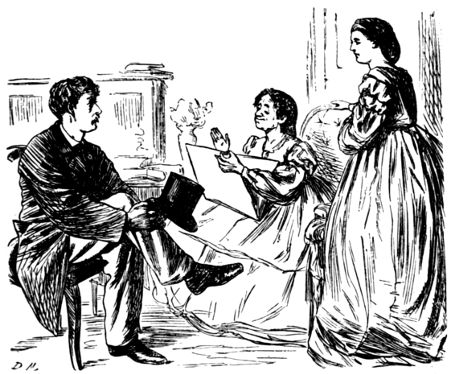
Artist. My big picture? I haven’t painted in the two principal figures yet; because I can’t find anybody pretty enough to sit for them. Ah! Miss Mary, if I could only induce you just to——
Miss Bridget. Oh! my dear Mr. M’Gilp, we should both be only too delighted! When shall we come to your studio? How shall we dress? and what style of coiffure? [Now, what is a fellow to say in such a fix as this?
James McNeill Whistler and a friend, strolling through a London suburb, met a small boy. Whistler asked him his age.
“Seven,” the boy replied.
“Oh, you must be more than seven,” said Whistler doubtingly.
“Seven,” insisted the boy, rather pleased at being taken for older.
Turning to his friend, Whistler said, “Do you think it possible that he really could have got as dirty as that in only seven years?”
[158]
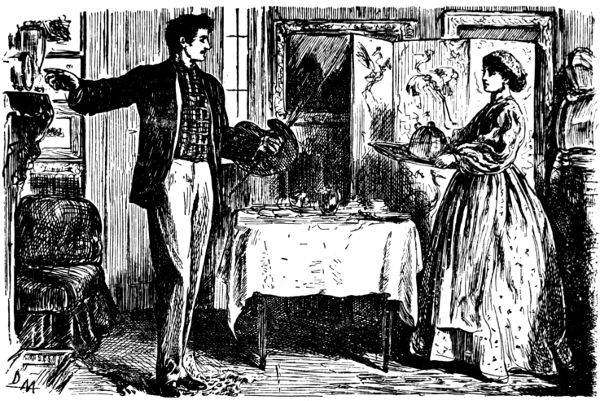
Answers for our Artist.—“Biddy Maloney, just you look at that clock! Didn’t I tell you last night to knock at my door at eight this morning?”
“An’ so ye did, sir, and I came to the door at eight sure enough, but I heard ye was making no noise at all!”
“Well, why the dickens didn’t you knock, and wake me?”
“Sure, and because I feared yez might be fast asleep!”
[159]
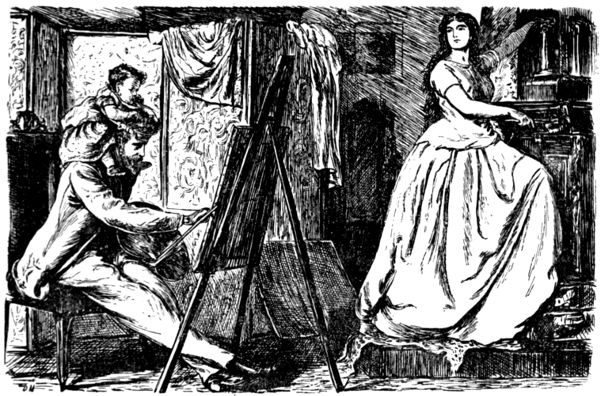
THE MOTHER OF INVENTION.
Mrs. Fred doesn’t care how long she sits for her “dear Fred,” so long as her “darling Freddy” is in some safe place where he can’t get into mischief.
[160]
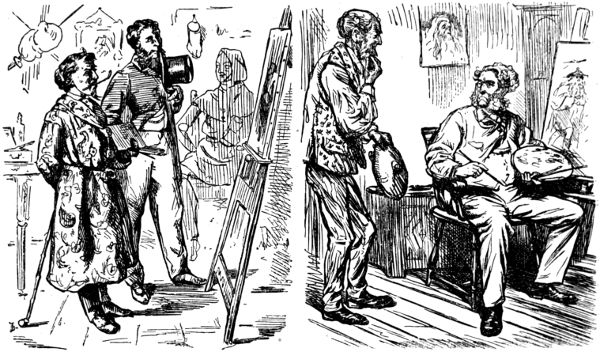
KINDLY MEANT.
Chrome (to friend). Well, and how do I get on with the doublet? Is it more like leather?
Conscientious Friend. Why, no; I can’t say it is—but (apologetically) you’ve got the face very like leather.
Painter (aghast).—Good heavens, man! Where’s your beard? What have you done to your face?
Model. Me, sir? Naethin, but just made my whiskers a wee thing decent wi’ the shears.
Painter. Then you’re an utterly ruined man, sir! and I’m very sorry for you. You’re not worth twopence. Good-morning.
[161]
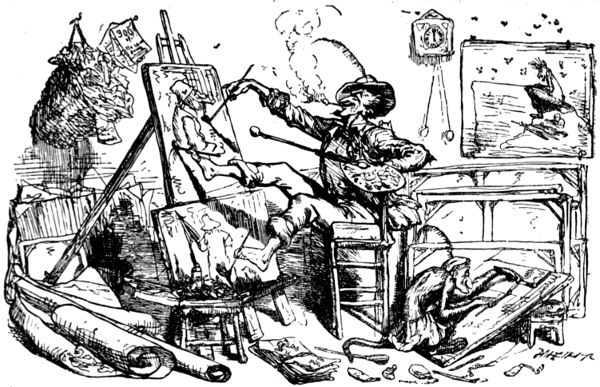
How some of the old painters must have worked to get through anything like the number of “original” pictures attributed to them.
[162]
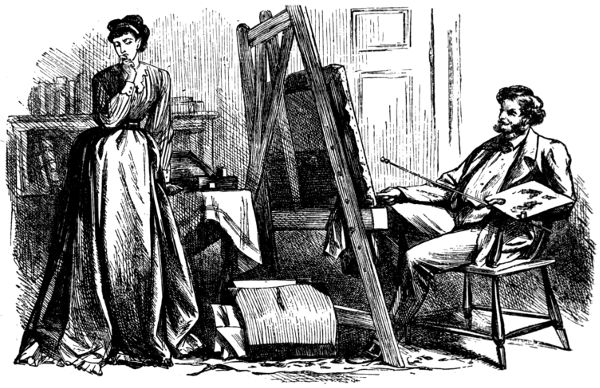
STUDIO PERSUASION.
Our friend Jack McGilp to excited partner, who has just the head for his picture of “A Husband’s Revenge.”—So she won’t stand any longer, won’t she? Of course she won’t. I’ll get a model. [The effect is magical.
[163]
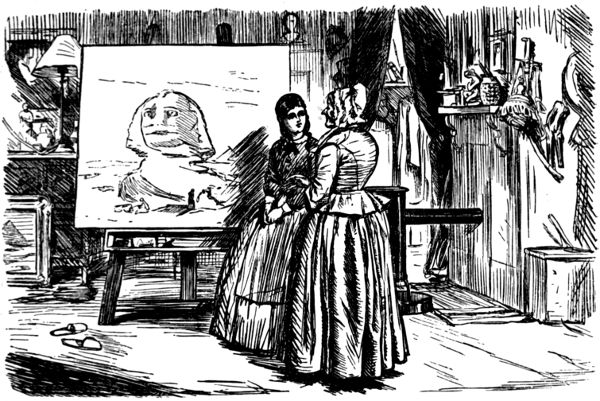
Cook. Lawks, miss, it’s beautiful; but I’d no idea your pa was a portrait painter!
[164]
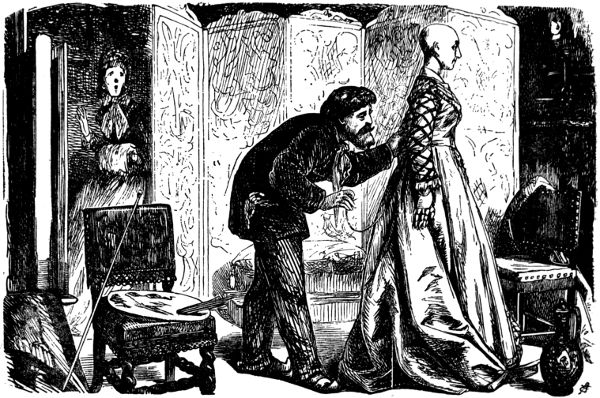
A MODEL HUSBAND AND A LAY FIGURE.
What Miss Grundy saw in her brother-in-law’s studio.
What Miss Grundy said about it to her sister.—“Perfectly disgraceful—and to crown it all she was bald!”
[165]
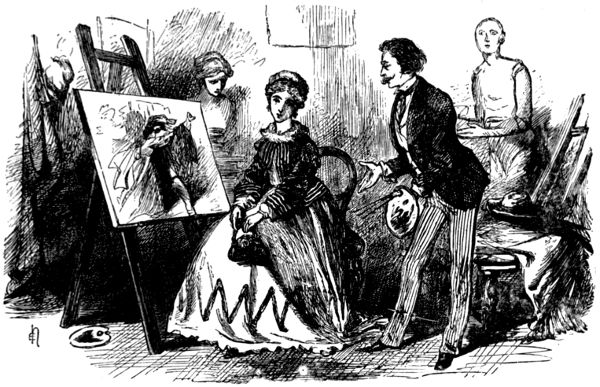
MARVELLOUS!
Young Lady. Ah! really, Mr. Splurge, I can’t think how you manage to paint with such taste.
Mr. S. Simply by holding my palate in my hand, I assure you.
[166]
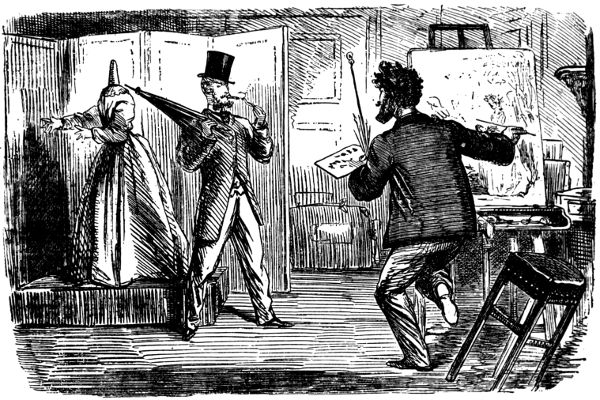
A VISIT TO THE STUDIO.
Mr. Ochre (through whose frame a thrill of horror is supposed to be passing). Ugh! mind what you’re about, Charley. Mind my Ophelia; mind my Ophelia! You’ll knock her over, and spoil all her folds!
[167]
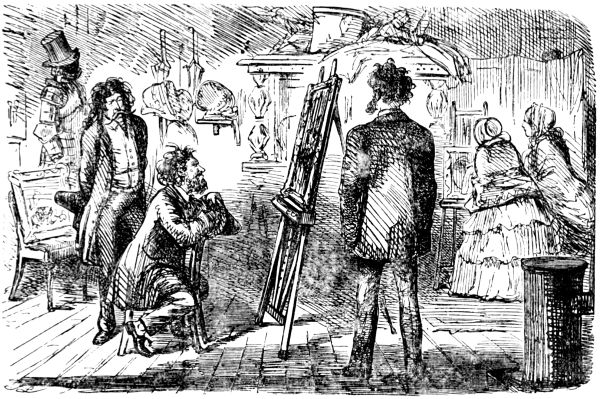
SCENE IN A STUDIO.
Jack Armstrong has painted a modern subject, from real life, and painted it uncommonly well.—Strange to say, he has sold his picture.
Messrs. Feeble and Potter (very high-art men, who can’t get on without mediæval costume, and all the rest of it) think it a mistake.—Curiously enough, their pictures are unsold.
[168]
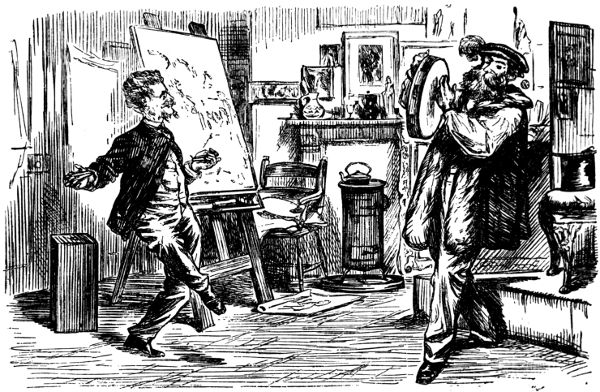
Ballet of action with which Sparkles (who says he is so hard at work at his picture), and his friend and model, Jack Bounce, refresh themselves in the intervals of labour.
[169]
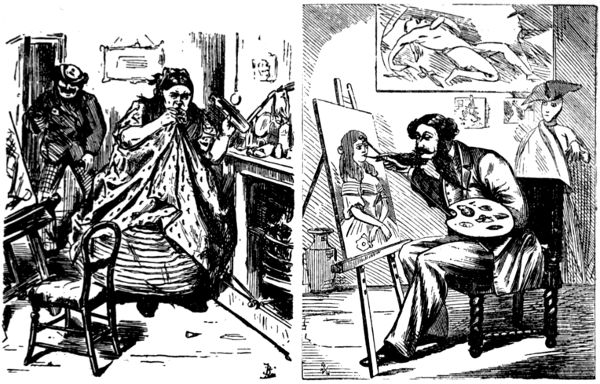
TURPS v. TURPITUDE.
The above represents a slight mistake made by Scumble’s new charwoman, who, being “partial to her drops,” thought she had a chance.
ONE USE FOR “DUNDREARYS.” (1863.)
Fitzdab (who does the Dundreary sort of thing) having brought his whiskers to a pitch of perfection seldom equalled, gives the finishing touches to Dolly Jenkins’s portrait with the tips.
[170]
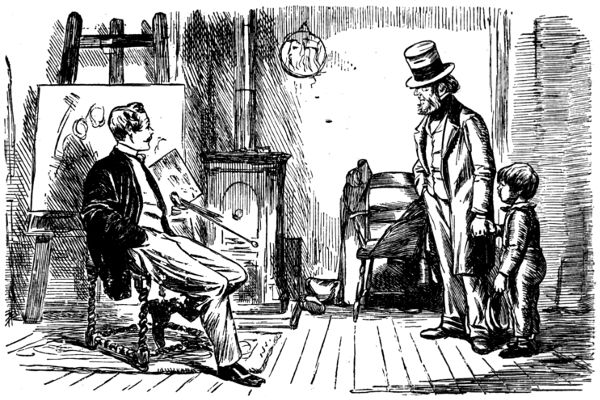
ACCOMMODATING!
Stern Parent. Too fat for a page, you think, sir? Um! You see, sir, if so be you could wait a week or so, we could redooce him wery easy.
[171]
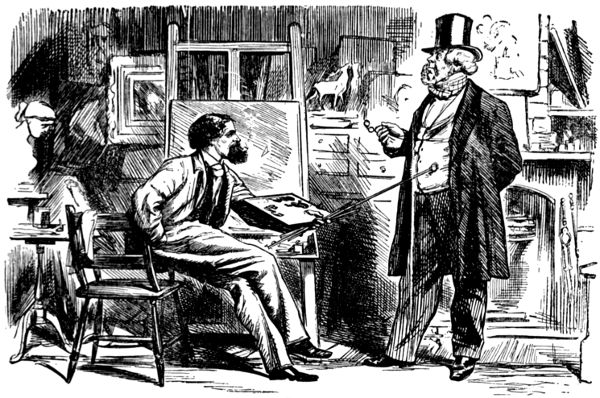
Cotton Lord (“coming” the noble patron). Haw—I was indooced to buy a little picture of yours, the other day, Stodge, haw——
Artist (who does not seem to see it). Lucky fellow!!
[172]
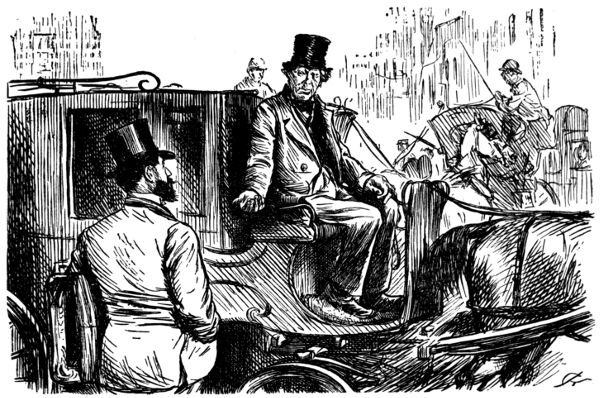
“NOBLESSE OBLIGE!”
Stodge (in answer to the reproachful look of his cabman). Well, it’s your right fare; you know that as well as I do!
Cabby. Oh! which I’m well aware o’ that, sir! But—(“more in sorrow than in anger”)—an’ you a artis’, sir!! [Gets another shilling!
[173]
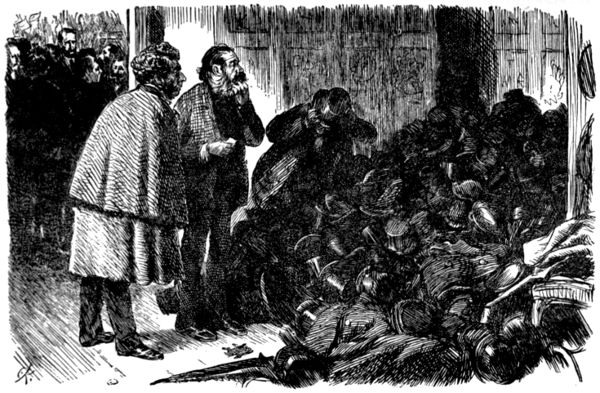
OUR ART-SCHOOL CONVERSAZIONE.
At which (in consequence of the increased space anticipated at the R.A. exhibition) there is a greater crowd than usual.
Model (who
has charge of the hats and coats). No. 97? Yessir. There now! If I didn’t see that ’at—ah—not a
quarter of an hour ago!!
[Not a very satisfactory look-out for Bouncefield,
who
has barely time to catch his last train!
[174]
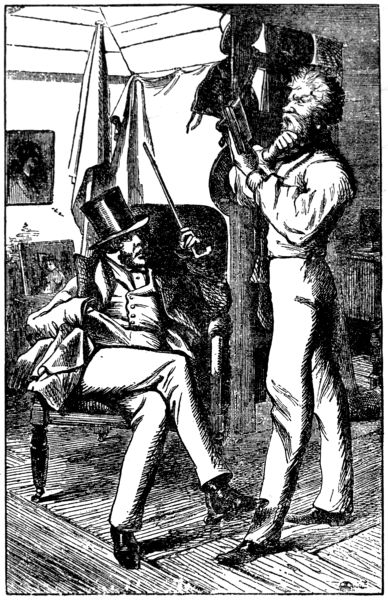
OUR ARTIST THINKS OF PAINTING A PICTURE FROM MACAULAY’S “IVRY,”
AND DECLAIMS THE POEM TO A PROSAIC PARTY.
Our Artist (ore rot.). “*****
Charge by the golden lilies! upon them with the lance!
A thousand spurs are striking deep, a thousand spears in rest,
A thousand knights are pressing close behind——”
Prosaic Party (interrupting). Hullo!
Our Artist. Eh?
Prosaic Party. Why, hang it, that’s only one spur a-piece!
[175]
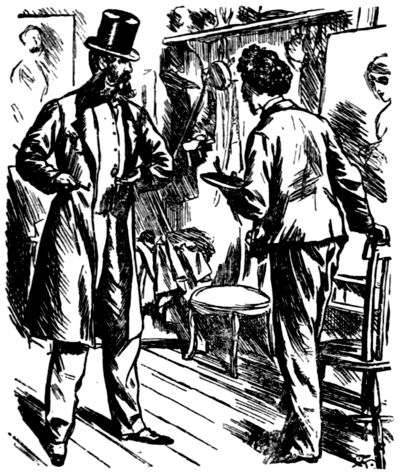
“SHARP’S THE WORD.”
Enter Lord Blasonby (hastily) to sit for his portrait in Stodge’s picture of the Chalkshire hunt.
Stodge. I understood you to say you would come yesterday, my lord; and I am engaged this morning. Lady Flouncer is coming at one o’clock.
My Lord. Haw! just in time, then. Cut away. You’ve got a good ten minutes. Wants a quarter to one, now!
“I ordered you to paint me some cows in a stable. I see the stable, but where are the cows?”
“They are in the stable.”
“So is your pay for this picture. You had better bring both out.”
[176]
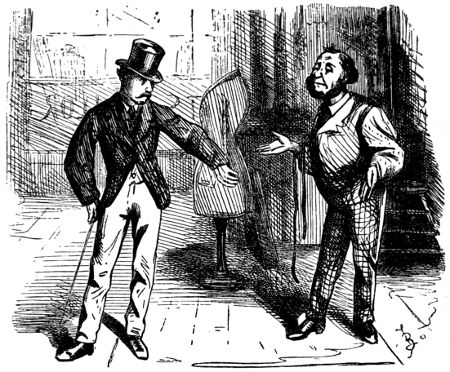
THE SYMPATHIES OF ART.
Tailor (to artist customer). Looky ’ere, sir,—I’ll put it to you! you’re a drawer yourself, and if you knew the years I’ve been studyin’ the ’uman figger—you wouldn’t tell me that coat don’t fit!
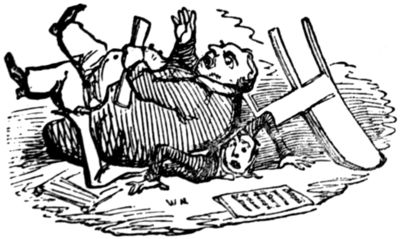
UNDER A GREAT MASTER.
[177]
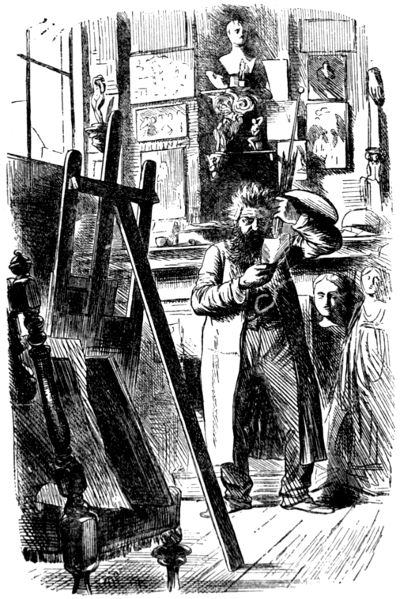
FAST COLOURS.
Artist (reading note from obliged friend). Um,—um,—much obliged to you for the loan of your Bedouin’s dress—(um,—um,)—will return it in a day or two, as I’ve, (ah! what!) sent it—to—the WASH!!
[The artist’s feelings (for colour especially) may be easier imagined than described.
[178]
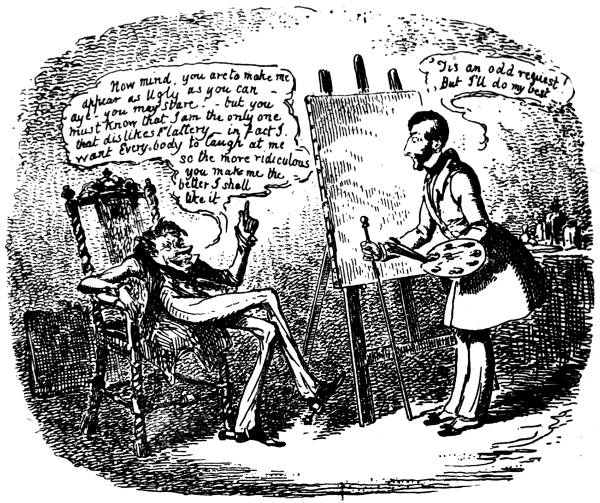
NOBODY DESIRES THE PAINTER TO MAKE HIM AS UGLY AND AS RIDICULOUS AS POSSIBLE.
(In this engraving by George Cruikshank the figure of the artist is a portrait of Cruikshank himself.)
“What colour of hair do you prefer, Mr. Baldwon, black or blonde?”
“I would not care what colour it was, if I only had some!”
“Your last book, madame, had a colossal success.”
“I should say so! Every one of my three divorced husbands wanted to re-marry me!”
A great man was complaining of all the charities to which he was forced to contribute.
“I give without counting,” he groaned.
“Yes, but not without recounting,” replied a friend.
[179]
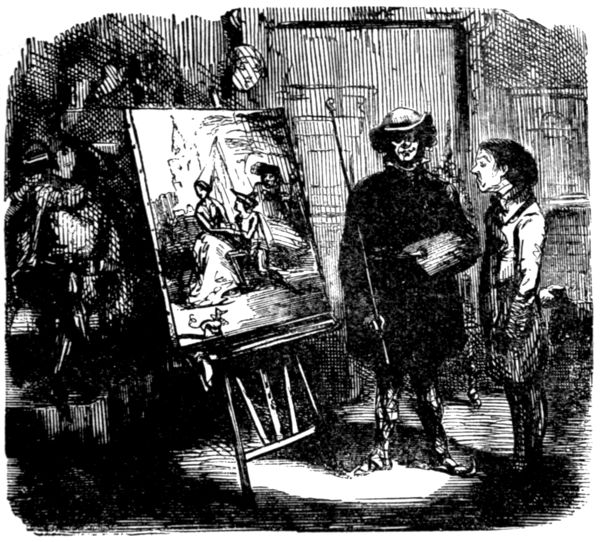
PERFECT SINCERITY; OR, THINKINGS ALOUD.
Artist No. 1. There, Master Oker, I flatter myself that will take the shine out of your precious production, although you do think nobody can paint but yourself.
Artist No. 2. Hey! dear, dear, dear! That’s very bad. By jove, my boy, it’s a dreadful falling-off from last year. If I were you, I should think twice before I sent it in.
Artist No. 1. Mere envy—illiberal humbug.
Professor. I came in accordance with an invitation I received to examine your collection of curiosities.
Parvenu (just returned from long voyage). Certainly, professor, walk right in. Allow me to first introduce to you my wife and daughters.
[180]
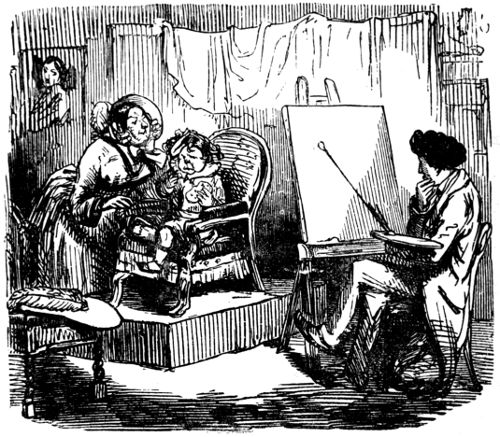
EASILY SATISFIED.
Fond Parent. I don’t care, Mr. Medium, about it’s being highly finished; but I should like the dear child’s expression preserved.
First author. “Well, what do you think of the book of our colleague Tintinger?”
Second Author. “Oh, what a shameless bidder for notoriety!”
“What! How so?”
“Did you not read the dedication, ‘To my mother-in-law, with sincere esteem’?”
First Artist. Well, are you satisfied with the appreciation that marine view of yours has received?
Second Artist. Delighted. Two women just stopped in front of it and one said to the other, “It just makes me seasick to look at it.”
[181]
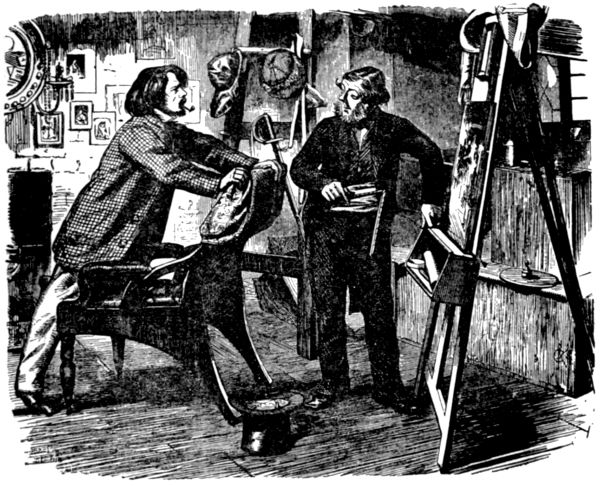
THE COMPLIMENTS OF THE SEASON.
Frame-Maker (who comes to measure Stodge’s academy pictures). Now, I think it’s a pity you don’t let me have some o’ these for my winder, since you have no idea of the amount of rubbish I can get rid of at times.
There has been much discussion as to the assistance that photography might render judicial authorities in enabling the arrest of criminals.
Yet this is what recently occurred in France. Six photographs in different poses of the same criminal who had escaped from prison were sent out to all the communes of France. From the mayor of one of these districts the following letter was received:
“Five of the criminals whose photographs you sent have already been arrested; we are on the track of the sixth.”
[182]
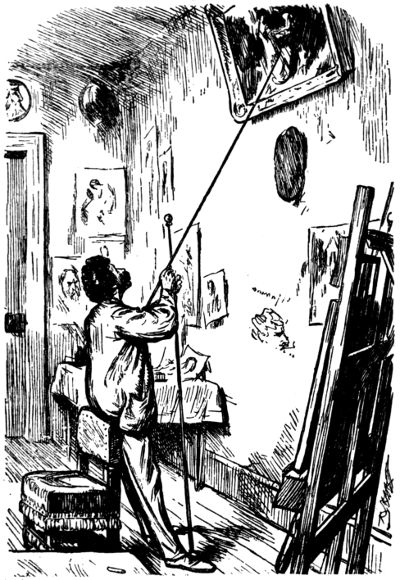
AS SCUMMLES’S PICTURES ARE INVARIABLY “SKYED” AT THE ROYAL ACADEMY, HE HAS GIVEN UP HIGH FINISH, AND ADAPTS HIS STYLE TO THE CIRCUMSTANCES!
[183]
ROUND THE GALLERIES
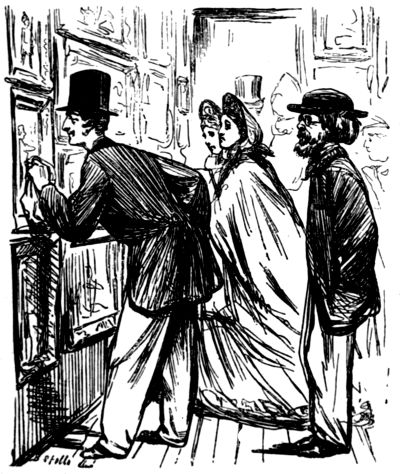
CAUTION.—(To the two young ladies in pink bonnets who expressed such enthusiasm about Mr. B. Stubbs’s pictures, and would so like to see that “dear Mr. Stubbs.”) The tall young man who on overhearing the above praise, wetted his pocket-handkerchief, and removed an imaginary speck of dust from Mr. S.’s picture, thereby trying to convey the impression that he was the fortunate man who had painted it, is some impudent impostor, and never touched a canvas before in his life. Mr. B. Stubbs is a good-looking, short man, with wideawake, auburn beard and spectacles.
[184]
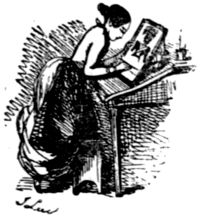
I had hopes—I know that they have proved to be unfounded, but I cannot admit that they were unreasonable!—I had hopes that I should have been able to avail myself of the privilege of free admission conceded to exhibitors. Unfortunately, I do not exhibit!
I sent three pictures! 1 (a pre-Raphaelite bit of nature), “Docks and Marsh Mallows”; 2 (an attempt to depict a really unhackneyed historical situation), “Charles the Second in the Oak”; 3 (a genre painting), “The New Crinoline.”
If it were becoming (which it is not) I could say a good deal about these works; but I forbear to do so. They were all three rejected by the Hanging Committee.
I have accordingly paid my shilling, and I mean to take it out in criticism. The Academicians have exercised their rights; I shall use mine. There will be plenty of hacks to fawn upon the imbecile canvas-spoilers, the miserable, crass, cringing, dull, feeble, superannuated, impotent, and abject Forty. Of those hacks I decline to be one. Honest truth (uninfluenced by passion) is what the wretched dotards shall hear from me.
[185]
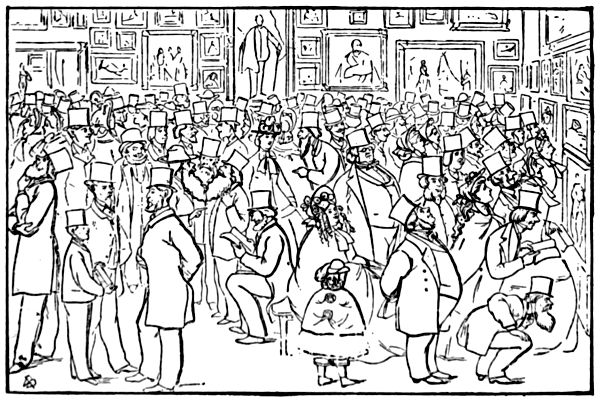
I saw men prowling about (there was Mr. Thackeray, for instance, as large as life, and a host of other “successful” men—I hate success!) who had evidently made up their minds to be pleased with this, the most disreputable Exhibition that ever degraded British Art. Let them. Thoughts is free, as Mrs. Brown said at the play; and so are mine. It is all very well to get a set of literary time-servers to hob and nob with Academicians at the annual orgie which disgraces Trafalgar-square, and on which hundreds of pounds are spent that ought to be devoted to the development of talent such as that of—well, of some I could name; but I was never invited to the so-called banquet. Banquet, indeed! I would rather maintain my honest independence, though I had nothing to eat but a polony—and this is sometimes the case! Look at young Mr. Marcus Stone. I’ll be bound to say he never eats polonies—and[186] yet all London is talking of his “Napoleon,” whilst my “New Crinoline” has not yet met even with a dealer!
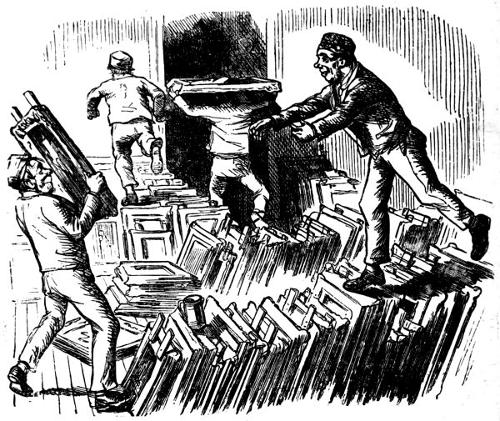
AN ARTIST’S DREAM, AFTER SENDING IN HIS PICTURES WET TO THE ROYAL ACADEMY.
Look at Mr. Ruskin. What did they do to him? Why, they asked him to dinner! What was the result?
His Critical Notes have never appeared since!! Not that it matters much.
[187]
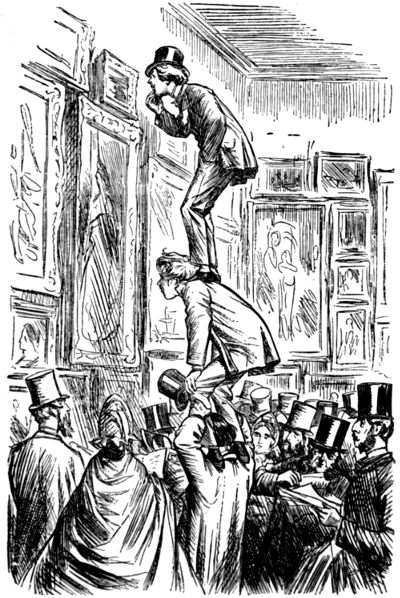
The advantage of the practice of “athletic exercises” by young painters, as recommended by a great critic.
[188]
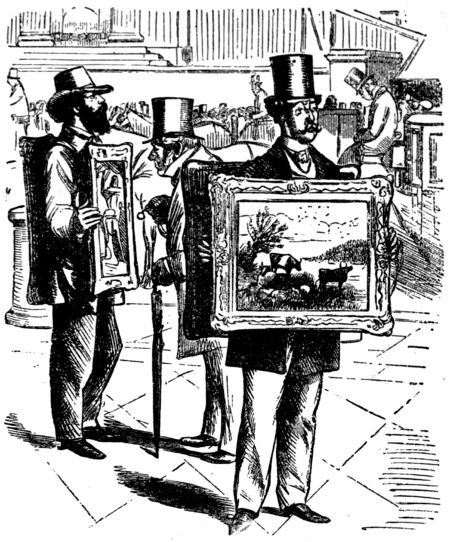
The proprietors of the Royal Academy don’t see why they should be troubled with so many works by other fellows. Oh dear, no! Let them exhibit their pictures outside!
Exhibition, indeed! Why, you can’t see anything—not that there is much to see—for the crowd of gaping women that block up the hideous and uncomfortable rooms with their preposterous crinoline—and yet the Academicians rejected mine! Then, the “swells”—a set of lounging insipid imbeciles, drawling out their vapid Dundrearyisms—and the old fogies, wagging their stupid old heads—I should like to knock a few of them together!—and the smug, smiling fellows whose pictures have been accepted—and the “Art-Critics,” who pretend to see power in a man like Millais, and poetry in a man like Hook, and humour in a man like Marks, but who are far too high and mighty, I promise you, to come[190] up four pair of stairs and see my “Marsh Mallows,”—and if they did, they couldn’t appreciate them! There, I’m tired of the whole concern—pictures and painters and visitors and all—and Mrs. Edwards is bothering me for the rent—and, unless you print this, to show up the impostors, and send the money by return, I shall have to paint sign-boards. David Cox painted one—and I dare say did it badly—for I never thought much of him! Or any other man!
Fun, 1863.
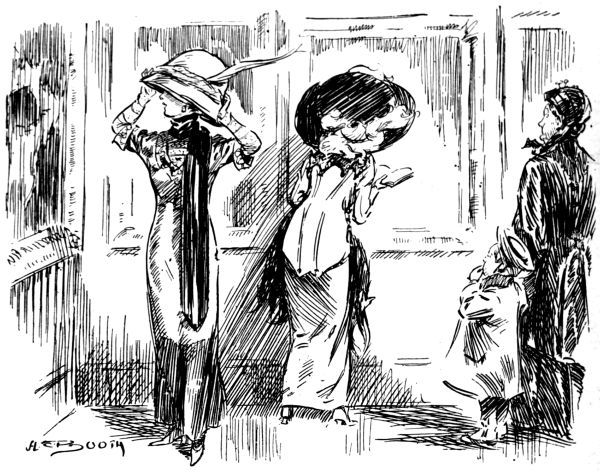
ART IN THE NATIONAL GALLERY.
Enid (with catalogue). Aren’t they splendid?
Eileen (using picture as mirror). Yes, I must say I like these dark Rembrandts.
[191]
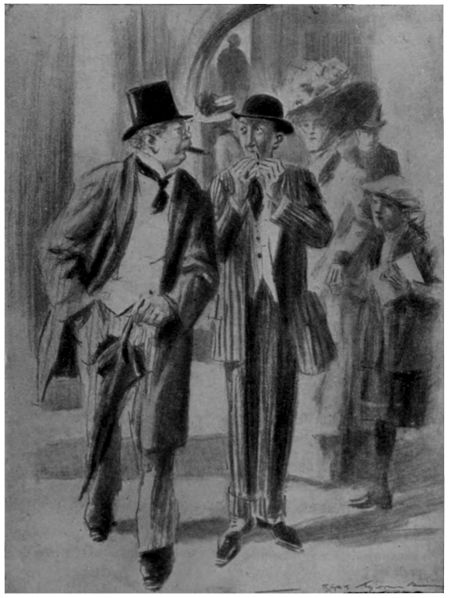
OUTSIDE THE ROYAL ACADEMY.
“You were a silly ass to talk of Botticelli in that way just now. Why, it’s not a wine, it’s a cheese!”
[192]
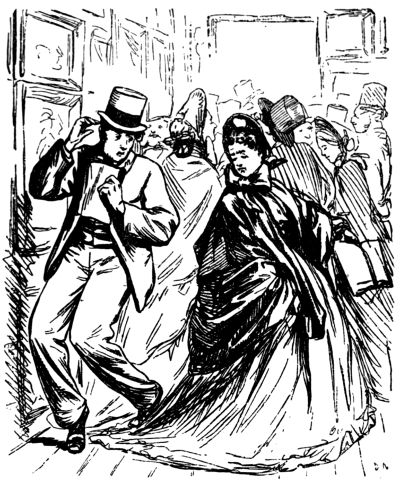
THE CHARMING FASHION OF LONG SKIRTS (1862).
Honestly, now—which of the two ought to apologize to the other?
Poet. What do you think of this little poem of mine, “She Would Not Smile.”
Editor. I think if you had read the poem to her she would have smiled.
Professor (turning angrily to class). This is intolerable! Every time I speak an imbecile talks.
Boarder (to landlady). Did you hear me come home last night?
Landlady. Did I? I heard you coming home for several hours!
[193]
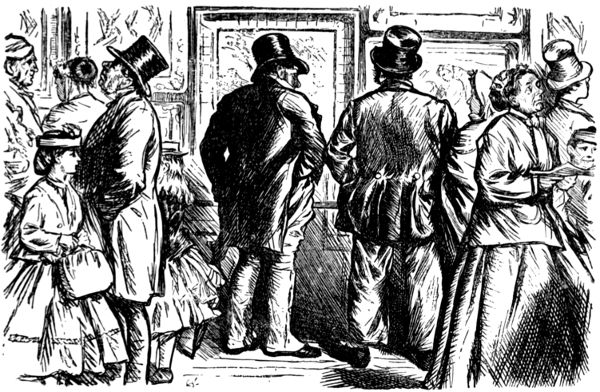
“UNTO THIS LAST.”
Provincial (at the Leeds Exhibition). I’ve heeard as the paint on some o’ these yere “picters” comes to a matter o’ fi’ pounds sometimes, let alone the man’s time a layin’ of it on, yer know!!!
[194]
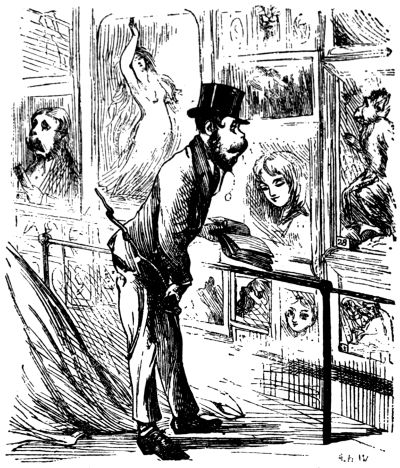
“VERY LIKE—VERY LIKE.”
Mr. B. A. Boone having given Smudger, R.H.A., leave to exhibit his portrait, is intensely delighted to find there is a slight mistake in the catalogue, and that the description really belonging to No. 82—“B. A. Boone, Esq., F.Z.S., etc.”—has been transferred to No. 28.
Eisenstein. Hello, old man, what makes you look so worried?
Rosenstein. The doctor ordered me to take a bath!
Eisenstein. Cheer up, old man! You can try this new dry cleaning process.
“See what a beautiful set of teeth the baroness has!”
Miss N. V. “Yes, it looks as if she had swallowed a piano, all but the keyboard.”
Charming Young Woman (to artist). But a hundred pounds seems to me too much for my portrait. I find it so easy to paint myself!
“You say your manager threw an inkstand at you?”
“Yes, he did, but I must say for him that he threw the blotting pad after it.”
[195]
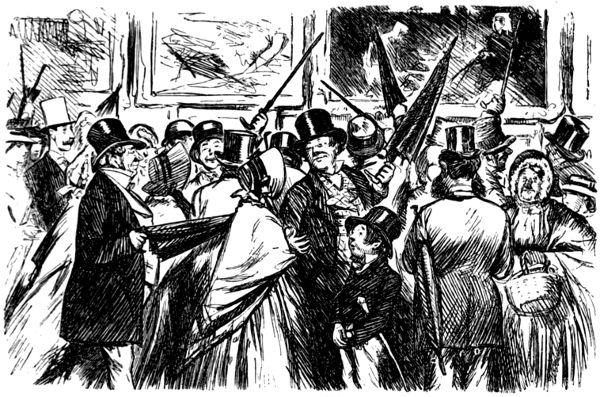
THE UMBRELLA QUESTION:
Or, what it would have come to, if some people had had their way.
[196]
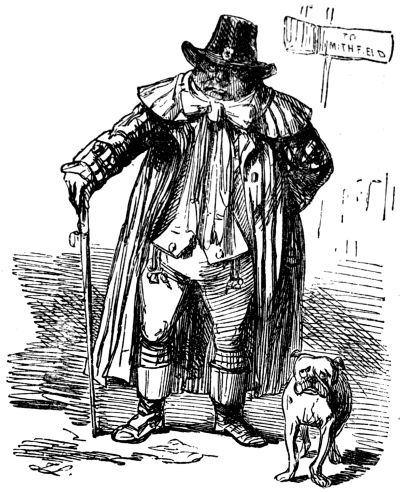
PICTURES OF THE ENGLISH, PAINTED BY THE FRENCH.
AN ENGLISH NOBLEMAN, 1848.
Milord. Godam! Rosbif! I shall sell my wife at Smithfield. Dam!
Ethel. Good-morning, Mr. Jones. You don’t seem to mind the heat!
Jones (surlily). I should say not. All my friends have given me the cold shoulder.
“How attractive that lady over there is! What a fine profile! What thoughtful, dreamy eyes! If I could only find out in what branch of knowledge she is especially interested! Listen! She is asking the librarian something. I wonder what it is.”
Librarian. “No, madame, I do not know whether he was here yesterday.”
[197]

A-MUSING.
McDauber (who is so afflicted with the habit of thinking aloud). Charming bit of colour, that! Marvellous chiaroscuro. Wonder who it’s by? [Oddly enough it is by McDauber himself!
[198]
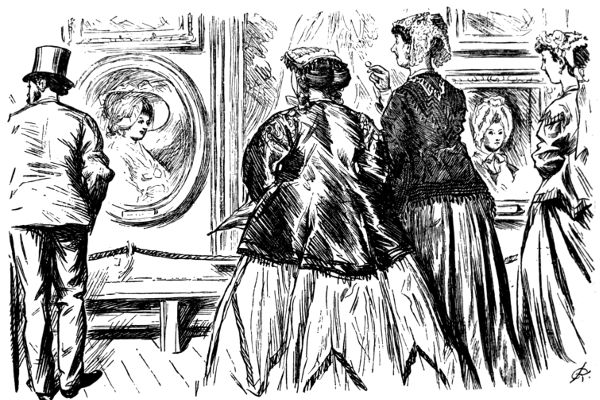
PERHAPS.
Stout Fashionable Party. What guys they made of themselves in those days, aunt!
Slim Old Ditto. Fashion, my dear! I should not wonder but we shall be looked on as perfect frights in future times!!
[199]
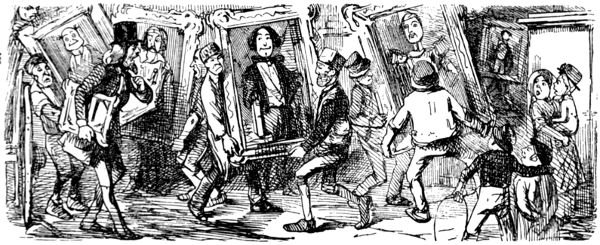
Reception of pictures at the Royal Academy.—Arrival of the “Portrait of a Gentleman.”
“Madame, I have picked out a charming husband for you. Only I warn you he is a thorough sportsman. Fond of motoring, mountain-climbing, bicycling, and ballooning.”
Applicant (thoughtfully). “Can’t you give me something that lasts longer?”
“I can’t understand how a man can commit suicide for love.”
“It happens frequently.”
“Well, perhaps so, but if I did it, I should regret it all my life.”
“Hello, Jimson, whither so fast?”
“Don’t stop me. I’m going to my employer’s funeral, and there is nothing he hates so much as to have any one come in late.”
[200]
OUR
HISTORICAL
PORTRAIT
GALLERY
1.—Henry the Eighth
2.—Dr. Johnson
3.—Henry the Third of France
4.—Napoleon I
5.—Louis the Eleventh
6.—Oliver Cromwell
7.—Frederick the Great

1.
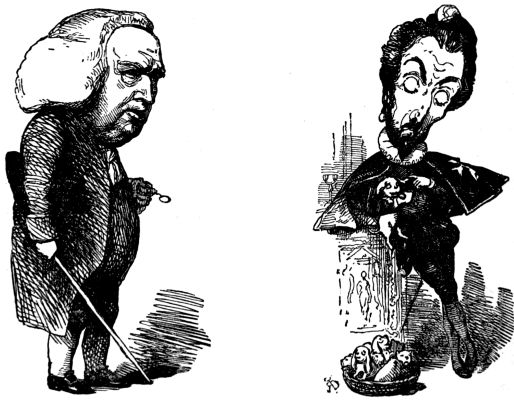
2.
3.
[201]
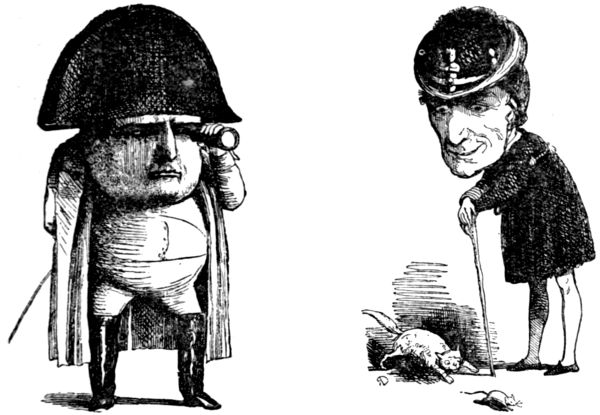
4.
5.
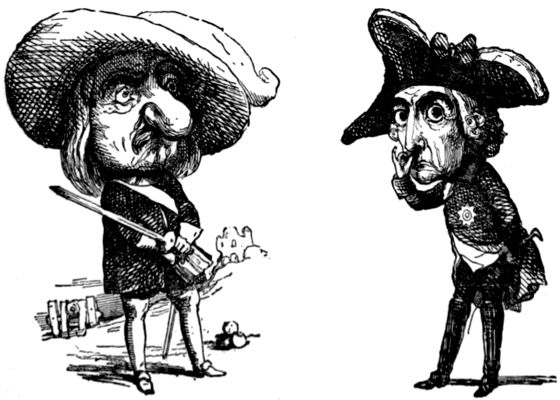
6.
7.
[202]
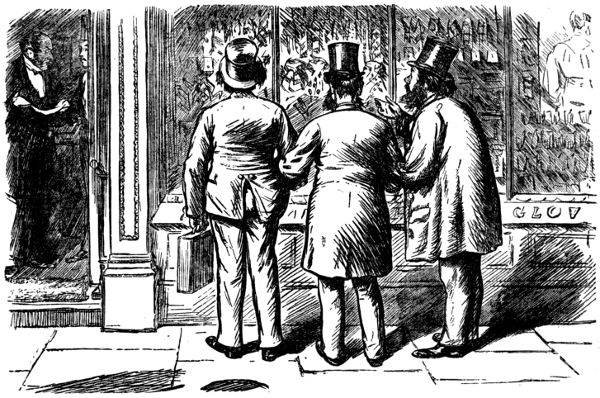
A STUDY.
Stodge and his friends, Madlake and Blumold, have learnt that their pictures are hung this year. So, here they are, looking out for some nice dressy ties for the opening of the Academy. Ah! it’s all very well to laugh, but personal appearance and “get-up” generally is a very important thing nowadays, mind you!
[203]
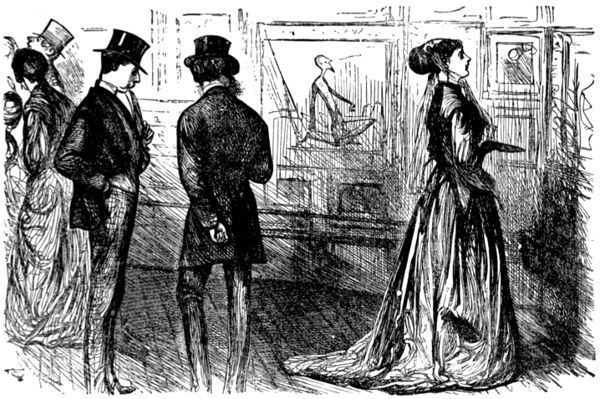
OVERHEARD AT THE ACADEMY.
First Art-Critic. Not a bad bit of colour that—great hairial effect, too!
Second Ditto. Jolliest thing in the exhibition, by Jingo!
[An explanation of the above is requested;—we cannot find Mr. Jingo’s name in the catalogue.
[204]
By Clement W. Scott.
Fun, 1865.
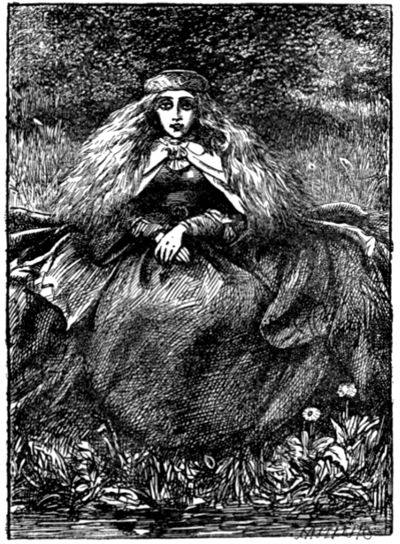
[206]
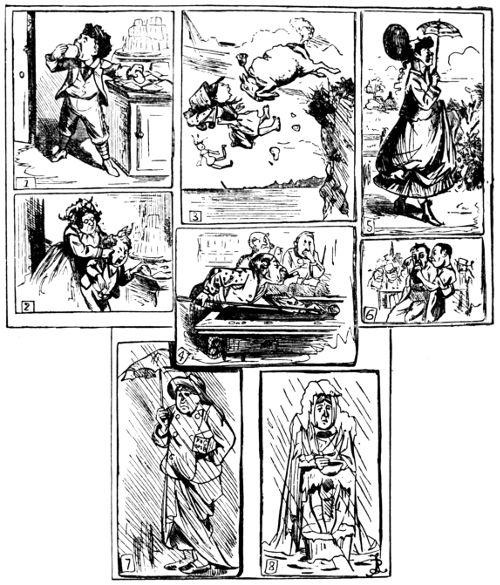
1.—Early Pie-ety.
3.—Rough Weather off the Coast of Devon.
5.—A Village Style.
2.—The Mother’s Pet.
4.—A Shady Pool.
6.—The Mace-bearer.
7.—Summer.
8.—Spring.

1.—Early Pie-ety.
2.—The Mother’s Pet.
3.—Rough Weather off the Coast of Devon.
4.—A Shady Pool.
5.—A Village Style.
6.—The Mace-bearer.
7.—Summer.
8.—Spring.
A FEW SUGGESTIONS FOR THE ROYAL ACADEMY CATALOGUE. (1868.)
[207]
THE ARTIST OUT OF DOORS
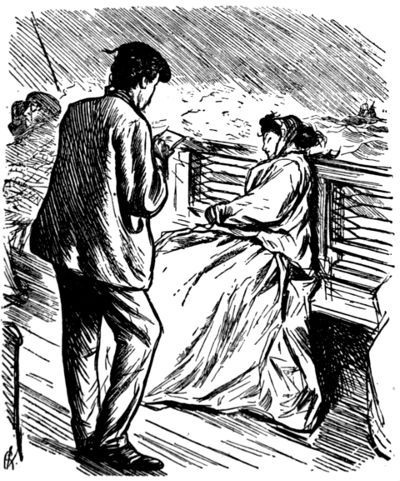
“IT’S AN ILL WIND,” ETC.
Our artist takes advantage of the utter prostration of the poor sick passengers, and fills his sketch-book.
[208]
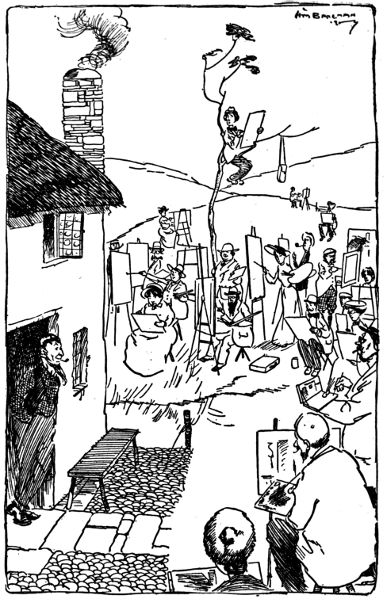
THE OLD COTTAGE.
[209]

Scene—The Elysium of Artists. Albert Durer, Rafael, Michael Angelo, Titian, Paul Veronese, Rubens, Reynolds, etc.
P. Veronese. And you saw this English Painter, who has last arrived among us, Sir Joshua?
Sir J. Reynolds. I did—and, faith, with the more interest that such arrivals become, every day, more rare. But I would rather keep back his tidings from our friends here.
All. Nay—speak—speak!
Rubens. You know, my friend, we have no jealousies here—nor schools.
Rafael. Our noble Michael has forgiven my youthful presumption.
M. Angelo. Not a word of that—I was to blame. Basta! You acted nobly, gracefully, kindly as ever.
Titian. The outline of Rome embraces the colour of Venice; and Titian here, after life, recognizes the might of Michael Angelo, and the saintliness of Rafael.
Rubens. Strange how blind we were on earth!
[210]
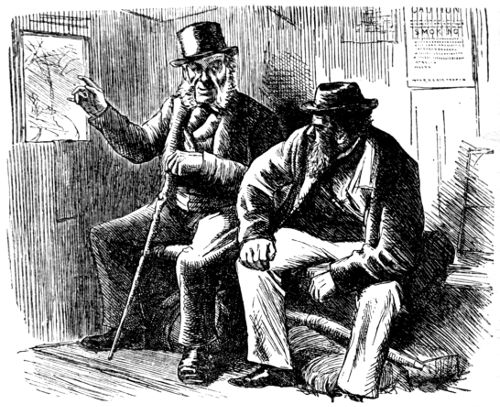
“A PRETTY PROSPECT!”
Native (to our Landscape Painter, who has come down to sketch). Why, sir, in this ’ere valley that you’re a goin’ to, you may see—ah—three splendid viaducts all at once, and one o’ the largest cloth factories in the West of England!
A. Durer. But the news from England?
M. Angelo. I love your commercial races and their merchant princes. Florence should have been my home. Has England such patrons of art as Soderini—
Rafael. Or as my dear Agostino Chigi? He was a banker, but had the soul of a king. How I loved him! Are there such bankers in England?
[211]
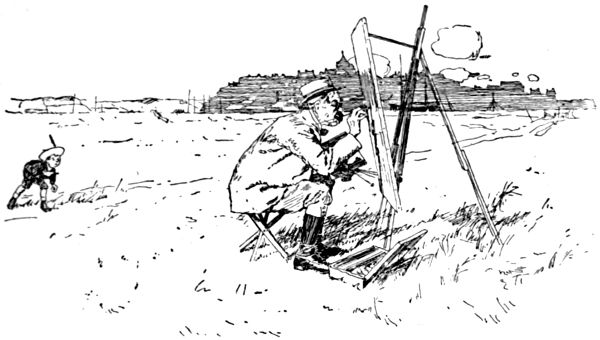
Artist. This canvas is going to create a sensation.
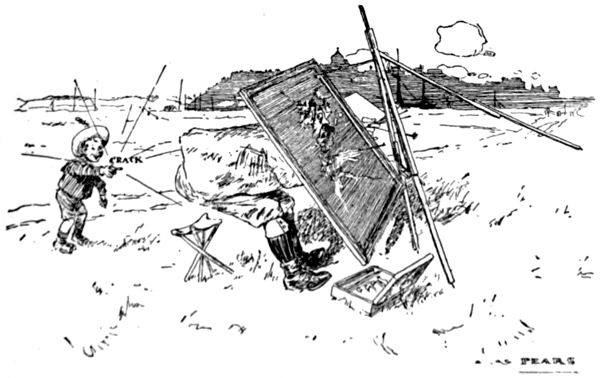
Crack!
THE POSSIBILITIES OF A PENNY PISTOL AND A BOX OF CAPS.
[212]
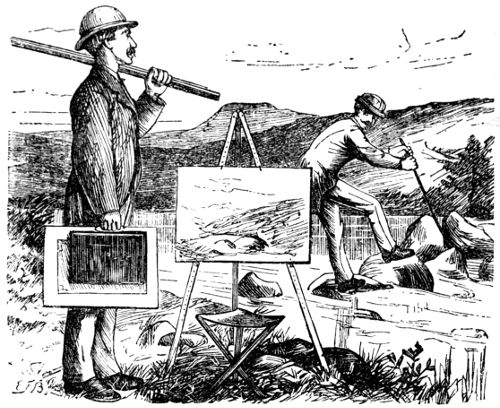
TECHNICAL AND PRACTICAL.
Maulstic. Hullo, Jack, what are you after?
Jack. Oh, my foreground didn’t come well, so I’m putting it together a bit.
A. Durer. Or as my worthy burghers of Nüremberg—the friends of Luther and Melancthon—are such the shopkeepers of England?
P. Veronese. Or such traders as my noble Levantine merchants of the Rialto?
[213]
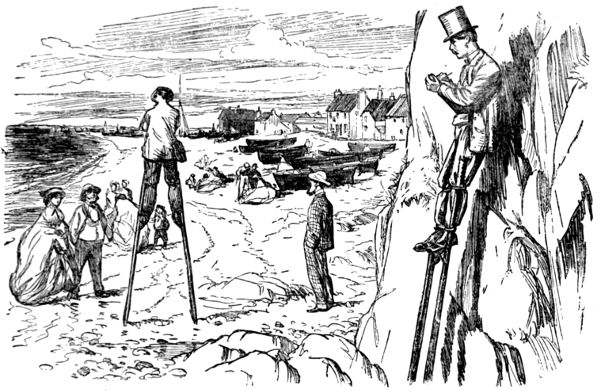
How two friends of ours who can’t bear being looked over while they are sketching, circumvented the impertinent curiosity of the vulgar.
[214]
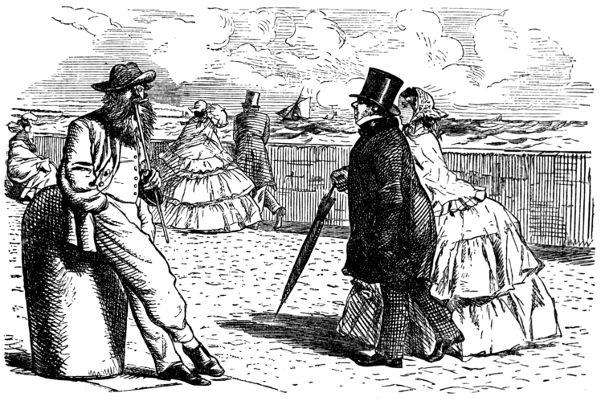
Old Streekie, R.A., thought it very hard that he could not run down to the seaside for a week, after the opening of the Academy, without meeting “that pre-Raphaelite fellow Cleevidge loafing about there, the first time he walks out.”
[215]
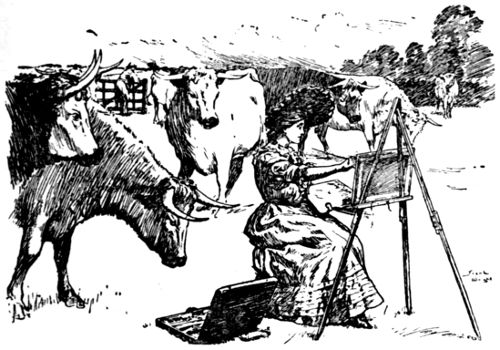
WHERE IGNORANCE IS BLISS.
Miss Jones (loq.). So glad there are no horrid cows in the field this morning.
Reynolds. Hush! friends, one at a time, or I drop my ear-trumpet, as I used to do, when Boswell would put troublesome questions. I fear England hardly boasts such men as you have mentioned. But there is a large subscription to the Art-Union, and bad pictures are greedily bought at small prices; good ones at large prices are few in number, and of that few still fewer are sold.
Rubens. I grieve to hear it. But what of your English sovereign? His Majesty, Charles the First (I was ambassador to his Court, you may remember, from my royal friend, Philip of Spain) would stand by my[216] easel for hours, watching me at work, and discoursing to me of art. Doubtless, your sovereign shows like grace to our brethren of this later time?
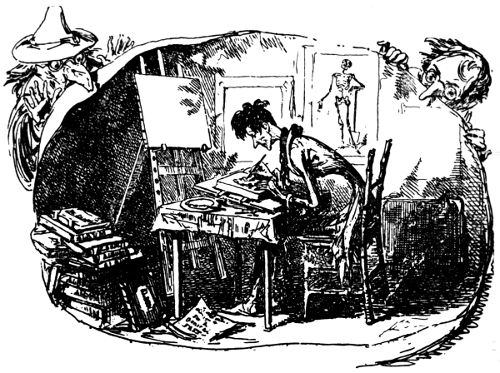
A DESIGN FOR AN ALBUM.
The artist who gives up his time to drawing in albums is like a midshipman on half pay—gets “nothing a day and finds himself.”
A. Durer. Nay, you are modest, my Rubens. For the Liebe Deutsche Schule, I must speak for you. Not Charles alone—but the Gonzaga of Mantua, Duke Albert, Philip the Spaniard, and the queenly Medici, gloried in calling you their friend and counsellor.
M. Angelo. They did not honour Art—Art honoured them. How[217] often have I told that hard truth to our Holy Father, fiery old Julius! He cuffed his Chamberlain once, for denying it. But for my own part, I never much affected your kings and great folks.
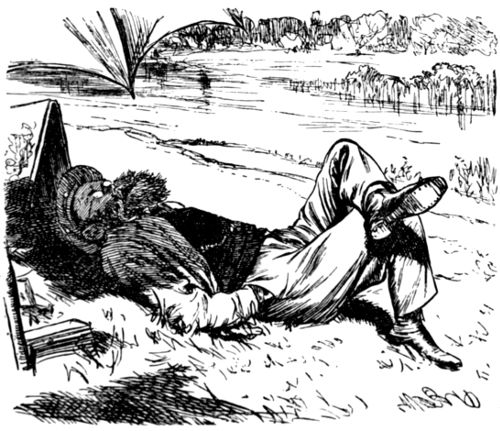
This is Jack Sparkles, who used to be such a thorough pre-Raphaelite, as we came upon him “at work” the other day—at least he called it so. He said he had come to the conclusion that “painting was, after all, more or less a matter of memory, and that he was studying skies!!”
Rafael. Thy noble nature disdained such shelter as we weaker and more luxurious spirits were fain to take under their escutcheons. And our Leonardo here—Francis, seemed never so great a king as when he picked up thy pencil, oh, my friend, lord not only of thine art, but of all knowledge!
[218]
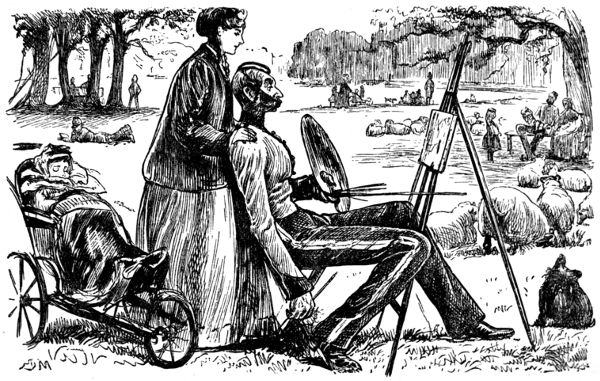
CULTURE FOR THE MILLION; or, SOCIETY AS IT MAY BE.
Ingenuas Didicisse Fideliter Artes, etc., etc.—Nursemaid. The perspective of the Chiaroscuro is divine, Augustus. But, oh! the impasto, is it not a leetle too pizzicato?
[219]
Leonardo da Vinci. Is Art so honoured by the great of England?
Sir J. Reynolds. Hum! Oh, His Majesty George the III was pleased to give a charter to the Royal Academy. I have been presented—but, certainly, I don’t remember to have seen him in my painting room at Leicester Square, or to have been asked to take a seat in the Privy Council.
Rafael. But your reigning monarch is a Queen. Woman has ever loved the Beautiful. Surely she much affects you painters.
Sir J. Reynolds. Hum—ha—I am extremely deaf.
P. Veronese (shouting into his trumpet). Does the Queen give due honour to our brethren?
Sir J. Reynolds. I am assured she has had painted already ten portraits of her gracious self, thirty of her Royal consort, twenty of the Royal infants, and fifty of the Royal pets, from paroquet to Brazilian monkey.
M. Angelo. These are your court painters, who so disgrace their calling. But your Artists? How goes it at the palace with them?
Rubens. Seated at the Royal board, doubtless—in places of honour.
L. da Vinci. Where else should sit the architects, engineers, philosophers, poets of the nation—in whom all knowledge is orbed around the Beautiful, and grows to Art?
Sir J. Reynolds. I am not informed that they do sit exactly at the Royal board, but the equerries’ table is excellent—and no doubt——
M. Angelo. Basta! Do not mince words, man—out with it. The painters’ table with the lackeys! Excellent England!
[220]
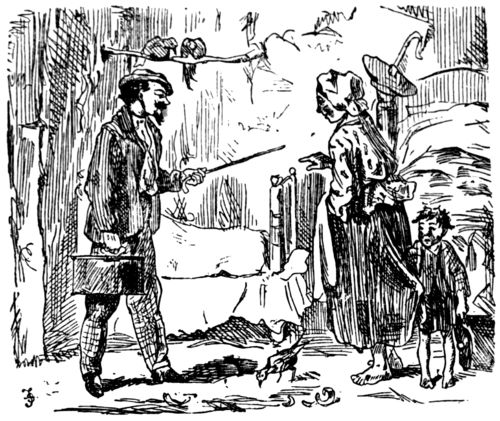
AN ARTIST SCAMP IN THE HIGHLANDS.
Artist (entering). My good woman, if you’ll allow me, I’ll just paint that bedstead of yours.
Cottager (with bob-curtsey). Thank ye, sir, I’ sure it’s very kind of ye—but dinna ye think the wee yin wants it more?
Titian (aside). These islanders! But our pictures which adorn your English galleries, my Bacchus and Ariadne—I painted it for Gonzaga.
M. Angelo. Well remembered, Vicellio. There’s Sebastiano’s picture, too, in your gallery; I painted the Lazarus, my Rafael, to shame thee. Blister my hand for it! How of it?
Rafael. It is a noble work, and I was honoured by such a rivalry.
Rubens. And my Peace and War? I painted it for your Charles, before I opened my negotiation for peace with Spain. Surely it is well cared-for, as a historic record, if not as a picture?
Sir J. Reynolds. Really my trumpet is out of order—I must go.
P. Veronese (pulling him back). Nay, nay, you must tell us of our pictures. Do they stand your fogs and damps? Are they still brightly mellow, defying time and circumstance as such art should do?
[221]
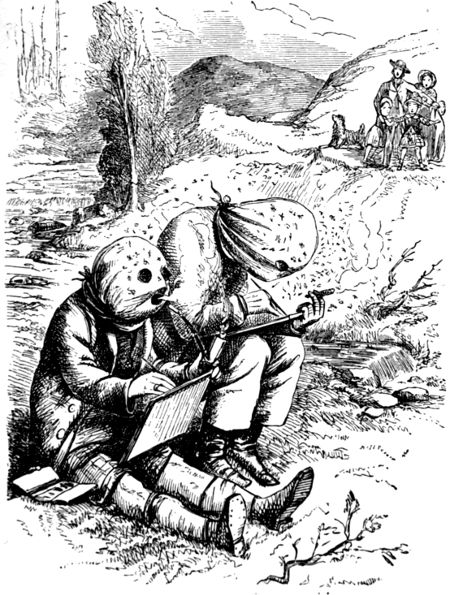
INGENIOUS PROTECTION AGAINST MIDGES—A VALUABLE HINT TO SKETCHERS FROM NATURE.
[222]
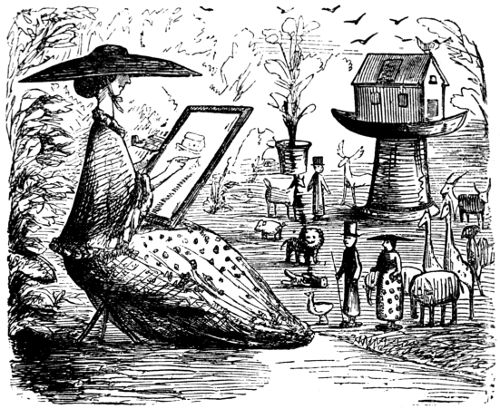
SKETCHING FROM NATURE.
Miss Raphael makes a study for her grand picture, “The Day after the Deluge.”
Sir J. Reynolds. Why, the fact is, my friends—I am sorry to say—but our climate is so very damp, and London so smoky—that they have been cleaned.
All. Cleaned!
Titian. My Bacchus and Ariadne! Oh my tints! Oh my glazings! A picture of mine cleaned!
Rubens. My Peace and War! Cleaned! say flayed rather. I[223] know your cleaners. Oh wasted labour; reputation obscured; thoughtful work rudely scrubbed away!
All. Shame and horror!
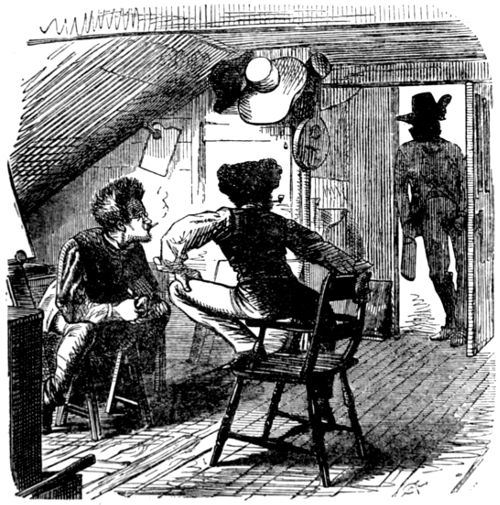
First Artist (who has looked in as he was passing). How are you? I say, Stapyton, have you heard what your “Cavalier in a Coal-Hole” went for at Jobinson’s yesterday?
Second Artist. No; how much, my dear fellow; how much?
First Artist. Why, very nearly a pound, I heard!
Omnes (delighted). Hurrah!
M. Angelo. So much for your oil-painting. Nay—excuse me, my Rafael—I sympathize with you; but why not work in fresco? Cheer up, my Titian.
[224]
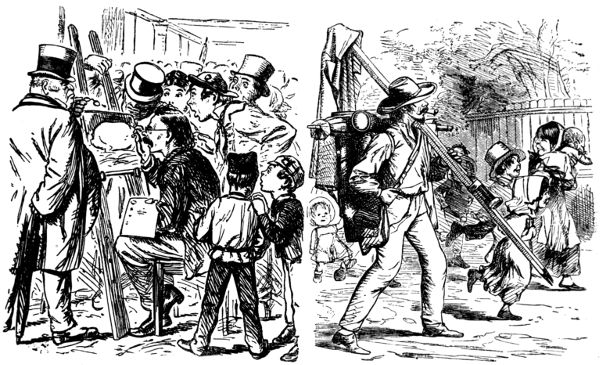
ART AT A CATTLE SHOW.
First Small Boy. I say, Bill, what’s he a doing of?
Second Ditto. Can’t you see he’s a-taking that old gent’s picture, and isn’t it like him?
WHAT AN ARTIST HAS TO PUT UP WITH.
“O! look’ee ’ere, Jane, ’ere’s one of them hacrobats a-goin’ to do the ladder-trick!”
[225]
Titian. Alas! my favourite work—my Bacchus! Cleaned! Oh Ghost of Gonzaga! Barbarians!
Leonardo da Vinci. Nay, weep not, my beloved friends and brothers. Is it not all of a piece? Art-Unions, royal lap-dogs, condescensions which are insults, and your great pictures ruined and destroyed. Why should you wish to exist in a country where your works have been impotent to implant the seeds of Art, or aid in their growth and nurture.
Titian. Oimè for Venice.
Rafael. Oh Roma, Roma!
A. Durer. Nay—Nüremberg, also, is a town of burghers, and it is not so with them.
Sir J. Reynolds (aside). I cannot console them. Their indignation is too well grounded. I, too, am a painter, but I alone am ashamed of my country!
Punch, 1847.
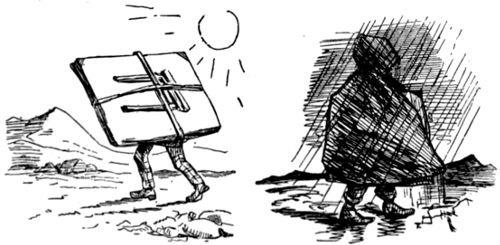
Our artist enjoying himself in the Highlands. * * * * “On fine hot days, I have this to carry on my back.”
“On wet days, with my waterproof clothing, I am as comfortable as possible.”—Extract from a Private Letter.
[226]

“THE COMPLIMENTS OF THE (SKETCHING) SEASON.”
Papa. There, Henry! If you could do like that, I’d have you taught drawing, my boy!
[227]
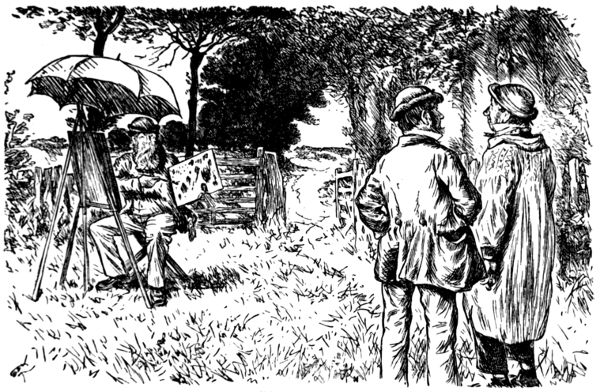
“FINE ART.”
Rural Connoisseur. He’s a p’intin’ two pictur’s at once, d’yer see? ’Blest if I don’t like that there little ’un as he’s got his thumb through, the best!
[228]
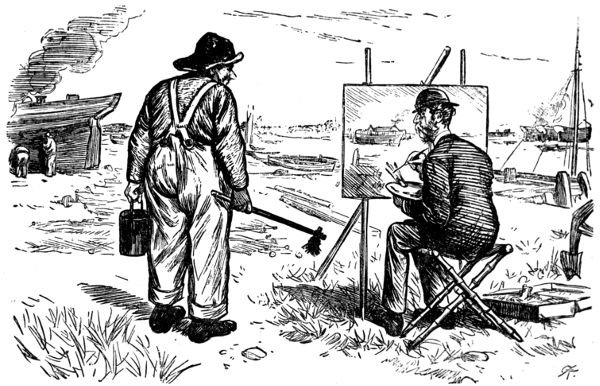
“BROTHER BRUSH.”
Ship-Painter. Nice dryin’ weather for our business, ain’t it, sir?
Amateur (disconcerted). Ya-a-s! [Takes a dislike to the place
[229]
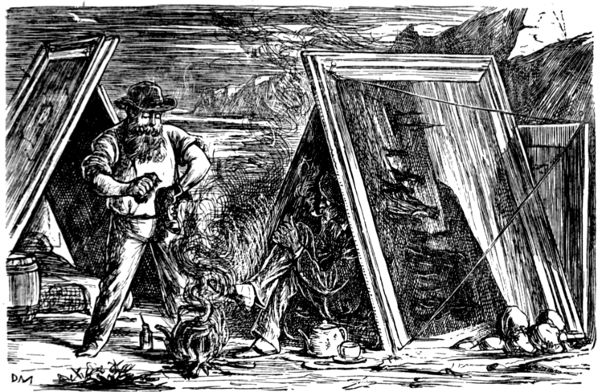
MAKING THE BEST OF IT.
To artists who have big pictures returned on their hands:—“If you can’t live by them, live under them!”
[230]
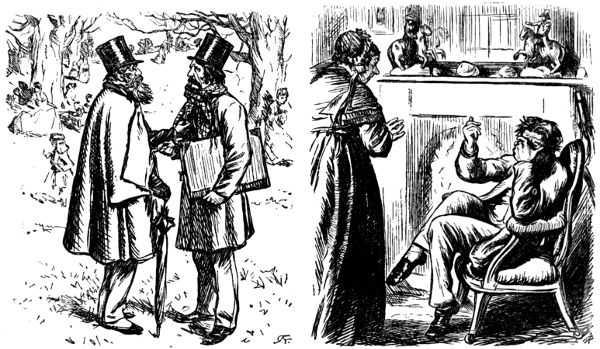
ONE REASON, CERTAINLY!
First Artist. Who’ll be the next Academician?
Second Artist. Oh, Faddler, my dear fellow, unquestionably!
First Artist (incredulous). Nonsense!
Second Artist. Oh, there’s no doubt about it! A very good fellow, you know, and he’s lived a long time at St. John’s Wood!
ÆSTHETICS.
Fadsby (in agony; he’s a martyr to the decorative art of the nineteenth century). Oh! Mrs. Grabbit—I really must—implore you—to remove those chimney ornam—ugh!—those two—fictile abominations—from this room while I remain he-ar!
[Of all the artis’s, Mrs. Grabbit said, as she’d ever let her apartments to, he was the most partic’lar.
[231]
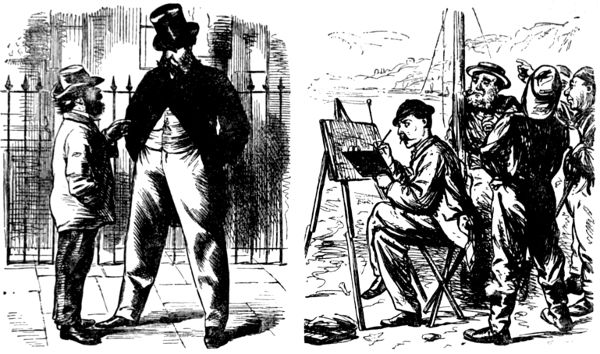
A BROAD HINT.
Stumpy Artist (to friend with a Government appointment and lots of time). Come and see my picture; can’t you come in the daytime early? And look ’ere: do you know a tall, handsome, gentlemanly-looking fellow, with a light beard and moustache, who would sit to me for my Hungarian Chief?
PLEASANT FOR JACK DAUBS, WHO IMAGINES THAT HIS DRAWINGS ARE RATHER TURNERESQUE.
First Art Critic. I do b’lieve he’s a-painting the sky.
Second Ditto. Noa, he ain’t. He’s a-painting them people.
Third Ditto. Noa, he’s a-doing sommut out of his head.
[232]
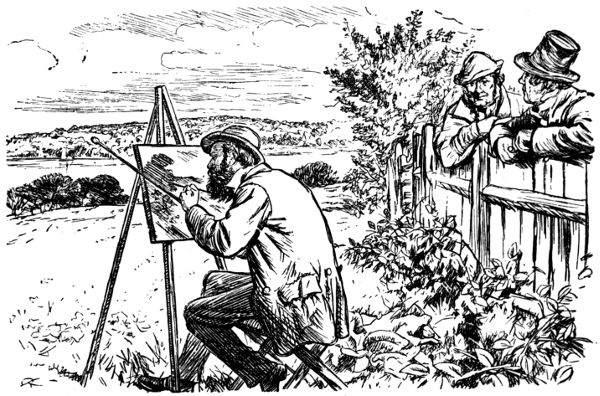
FLATTERING!
First Rustic. ’Str’or’nary way o’ gettin’ yer livin’! Ain’t it, Joe?
Second Ditto. Aye, that ’t be, William. Cripples o’ some sort, most on ’em, you may depend!
[233]
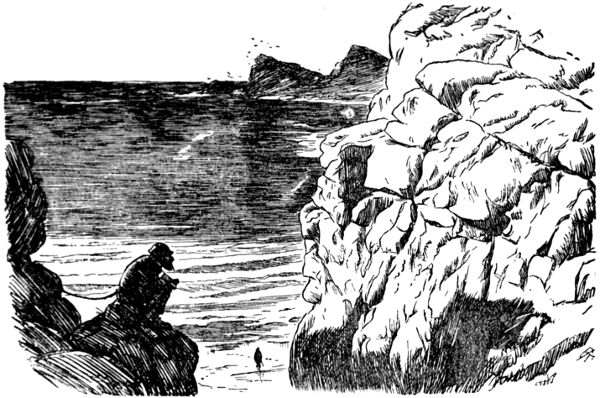
OUR ADVENTUROUS ARTIST
Sketching on the Cornish coast, he has taken precautions against slipping over the rocks. Our artist is seen, from below, by the learned German Professor Longbauer, who, after he made the most of it in his Travels, described this incident as an instance of the cruel treatment of their political prisoners by the English Government!
[234]
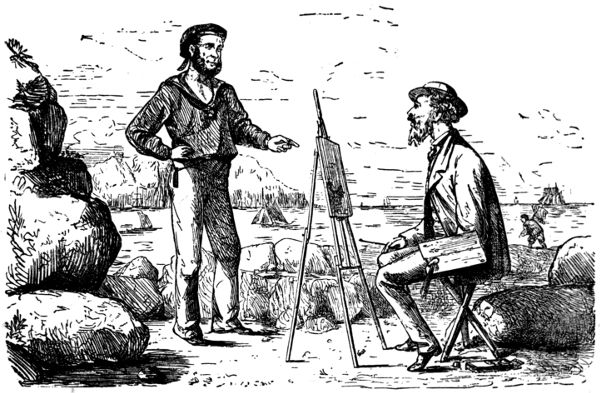
ART AND SCIENCE.
Mahlstyck (who has been at it all day for a week making a pre-Raphaelite study of seashore). I say, some of you fellows in the gunboat yesterday very nearly hit me once or twice!
Jack Tar. Lor, was that you sittin’ here yesterday, sir? Why, you was so still we thought you was a bush or summut—we was practisin’ at you!
[235]
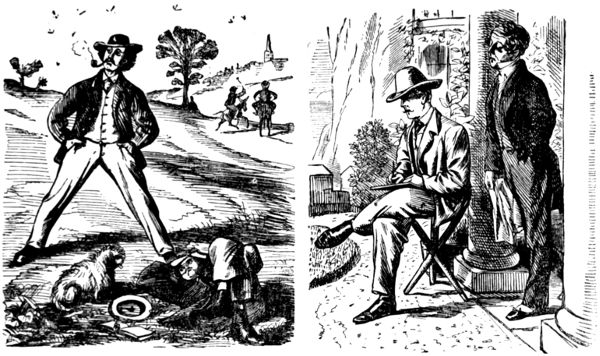
AN EYE FOR COLOUR.
1st Art Student. Fine sunset that, Jack, but fancy I’ve seen it before.
2nd Ditto. Of course; decided crib from Turner. Saw it at a glance!
IGNORANCE WAS BLISS.
Waiter. Yes, sir. We had a gentleman here, only last week, as took a sketch of that very ’ill, sir.
Artist (abstractedly). Oh, indeed! Was he an artist?
Waiter (indignantly). Oh, no! sir—a perfect gentleman.
[236]
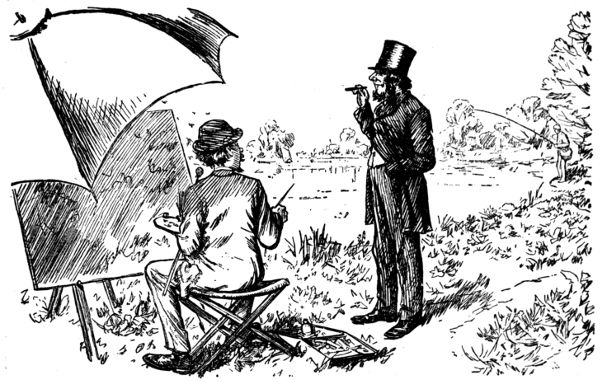
OUR ARTIST
IS NOT IN THE BEST OF TEMPERS. HE HAS BEEN DISTURBED OFTEN BY BARGES, AND BOTHERED BY THE BLUEBOTTLES, AND THEN HE’S ACCOSTED BY WHAT APPEARS TO HIM IN THIS IRRITABLE MOOD TO BE AN
Art-Critic (loq.). The picture looks better a goodish bit off, gov’nour!
Artist (maddened). Con-found—So do you, sir! [Party makes off hastily, “not liking the looks of him.”
[237]
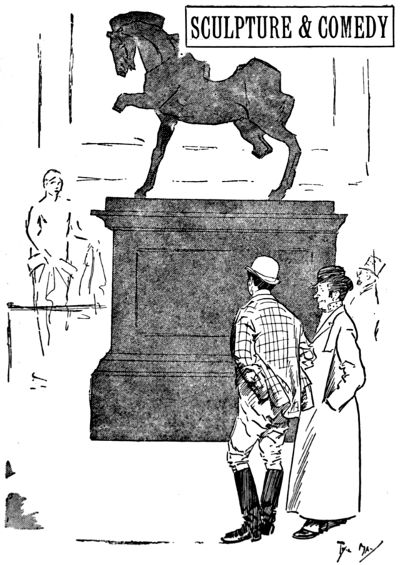
“Well, there’s one thing: ’e’s well broke!”
[238]
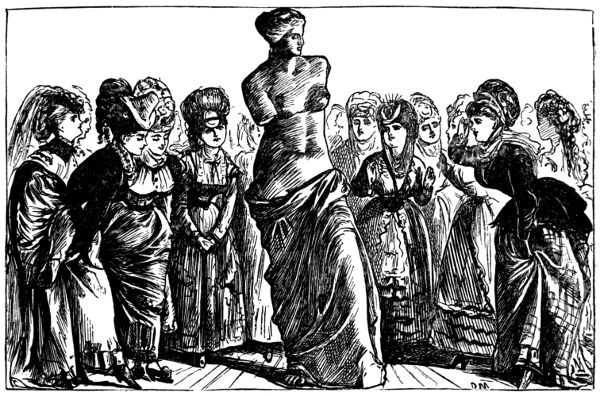
THE VENUS OF MILO; or, GIRLS OF TWO DIFFERENT PERIODS.
Chorus. Look at her big foot! Oh, what a waist!—and what a ridiculous little head!—and no chignon! She’s no lady! Oh, what a fright! (Period 1869.)
[239]
A TRAGIC BALLAD
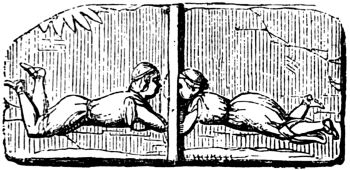
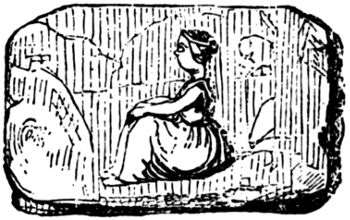
[241]

“INGENUAS DIDICISSE,” AND SO ON.
Urbane Foreigner. The—ah—contemplation of these—ah—relics of ancient art in the galleries of Europe, must be most int’r’sting to the—ah—educated American!
American Tourist. Wa’al, don’t seem to care much for these stone gals, somehow, stranger!
[242]
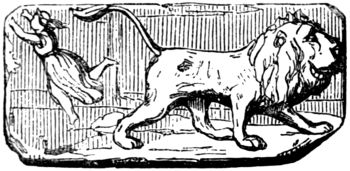
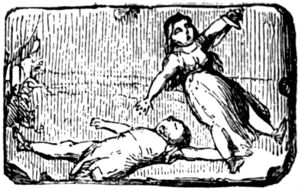
Punch, 1844.
[243]
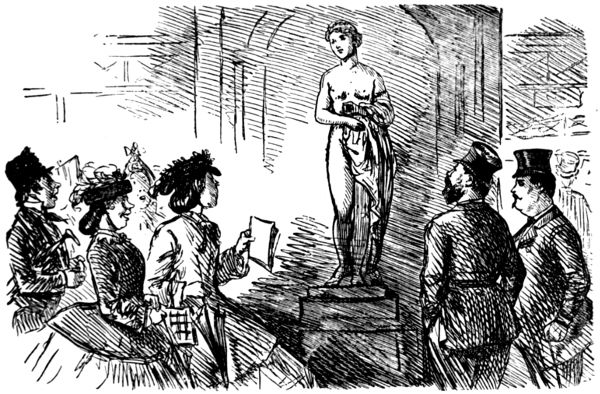
AT THE GREAT EXHIBITION OF 1861.
Sarah Jane. Lawks! Why it’s hexact like our Hemmer!
[244]
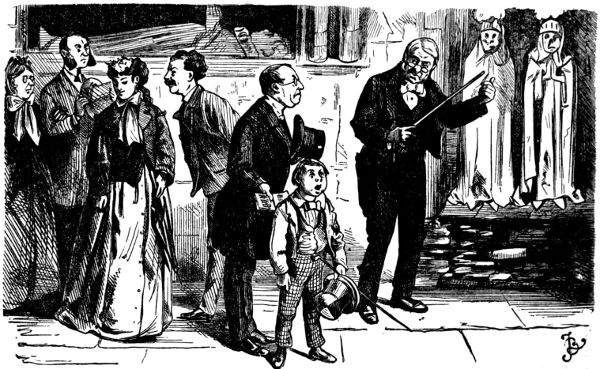
POPULAR HISTORY.
Guide. That heffigy of them two halabaster habbots in ’elmets hare from a tomb in the Habby of St. Holive’s, founded by ’Enery the fust Tooder, fort’n ’undred ’n heighty-seven. Their mortal remains was haxumed by horder hof the R’yal Hantiquarian Serciety seventin heighty-three; their bodies was found himbammed, and henwelluped in jules! [Procession moves on.
[245]
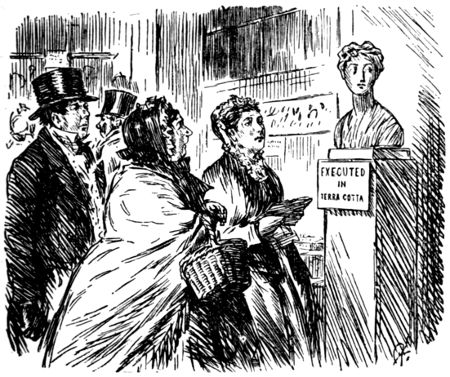
CAPITAL PUNISHMENT!
“Mother” (at South Kensington). Executed in —— Tut-t-t-t! Lauk a mussy, ’Liza! what did them foreigners want to ’ang that poor innocent-lookin’ young creetur’ for!!?
A student, showing the Museum at Oxford to a party, produced, among many other curiosities, a rusty sword. “This,” said he, “is the sword with which Balaam was going to kill his ass.” One of the company observed that he thought Balaam had no sword, but only wished for one. “You are right,” replied the student, “and this is the very sword he wished for.”
[246]
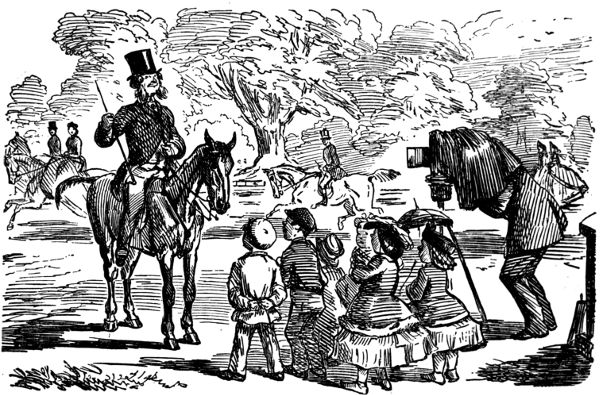
A FLAGRANT ATTEMPT.
Jones prepares a little surprise for his Mary Ann, and has his equestrian portrait taken. He remarks, “’Ang it, you know, if I do have my carte done, I don’t see why I shouldn’t ’ave my ’orse!”
[247]
FUNNY FILMS
Humours of
Photography.
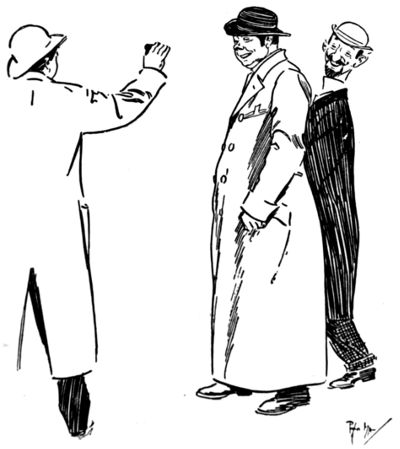
Photographer’s Tout. ’Ave yer photograph took, my lord?
Wag. No, we’re too ugly.
Photographer’s Tout. Many a true word spoke in jest, mates.
[248]
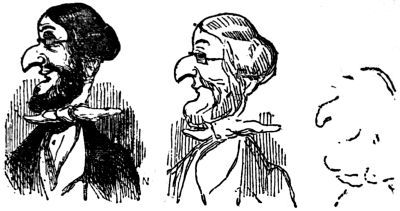
One of the advantages or disadvantages, as the case may be, of many photographic portraits, is, that they fade away by degrees, and thus keep pace with those fleeting impressions or feelings under which it is sometimes usual for one to ask another for his or her miniature. It may be a strong recommendation of cheap photography, that its pictures will last as long as the ordinary run of small affections, and, indeed, a superior specimen of the art may be warranted to retain its outline throughout a flirtation of an entire month’s durability. We had our own portrait taken by the cheap process a short time ago, when we received the above copy of the state of the portrait through a period of an entire fortnight.
The three specimens shown above represent our portrait when recently done; the same after it had been in existence a week, and the same after the expiration of an entire fortnight. The following pathetic ballad was appended to the specimens which we have given above:—
[249]

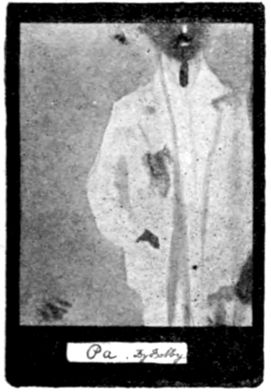
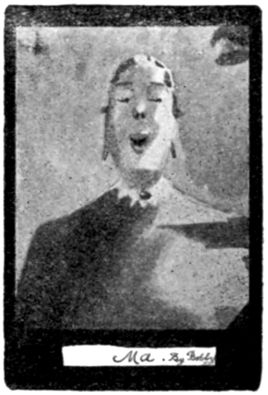
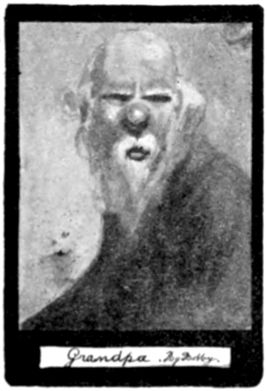
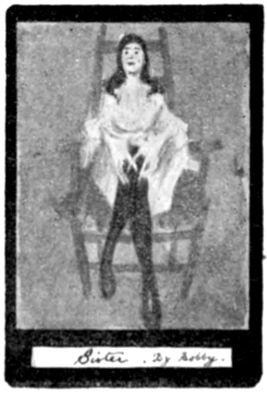
BOBBY’S CAMERA: SOME·EFFECTS·HE·GOT·WITH·IT.
[250]
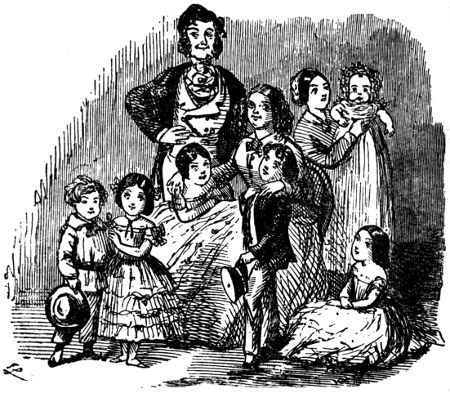
INTERESTING GROUP POSED FOR A PHOTOGRAPH.—I.
By a Friend of the Family.
[251]
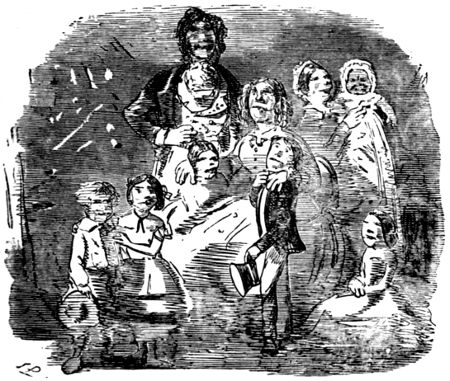
INTERESTING GROUP POSED FOR A PHOTOGRAPH.—II.
The Valuable Result.
Punch, 1847.
[252]
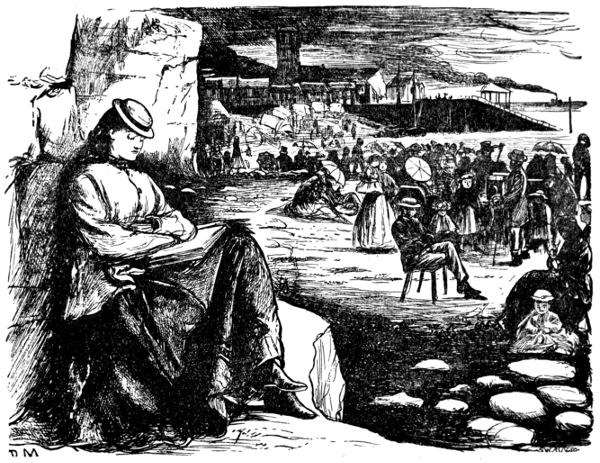
HAPPY THOUGHT!
[253]
HAPPY THOUGHT!
Ingenious Jones sits for his portrait to a peripatetic photographer, and cunningly places himself exactly between the apparatus and the unconscious Oriana, whom he worships at a respectful distance, and whose likeness he would fain possess.
[On this page the reader will find, all framed and glazed, for 3s. 6d. complete, Ingenious Jones’s Happy Thought’s result.
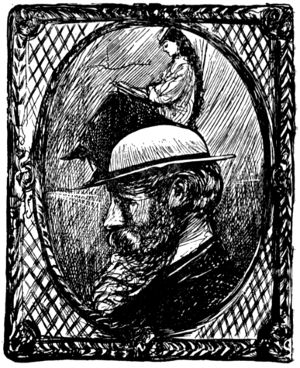
[254]
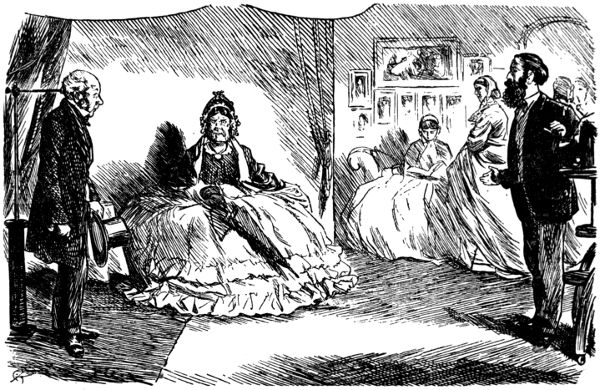
PLEASANT FOR SIMPKINS!
Photographer (to Mr. Simpkins). Keep your head steady, please, sir, and look in the direction of those young ladies. Steady now, sir! Don’t wink, sir!
Mrs. S. (by a look that Mr. S. quite understood). Just let me see him wink!!
[255]
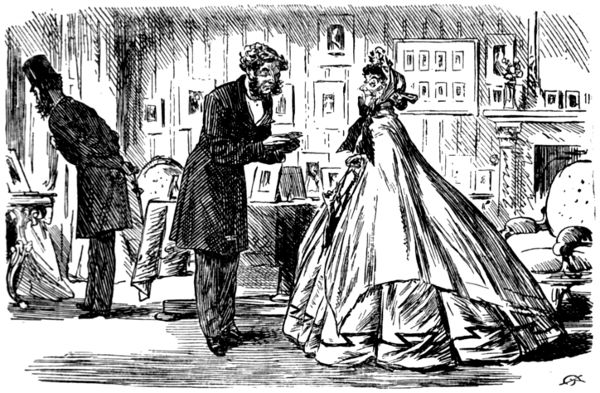
UNANSWERABLE.
Old Girl. Oh, I’ve brought back these cartes of mine, Mr. Kammerer. My friends are very dissatisfied. They——
Photographer. Dear me, mum, I’m extremely sorry; I thought the portrait very——
Old Girl. Oh! impossible; it’s hideous!
[256]
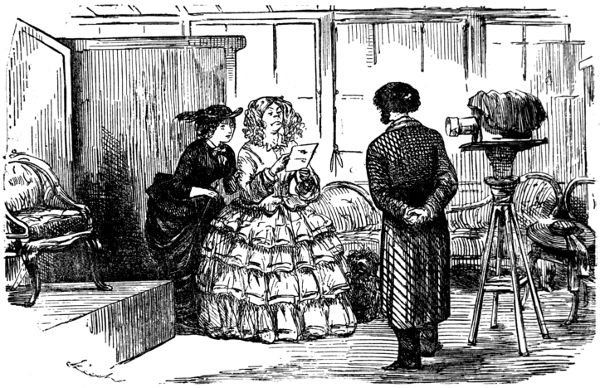
CAN THE CAMERA LIE?
Georgina (in riding habit). Well dear! I declare it’s the very image of you! I never!
Sarah Jane (who insists upon seeing the plate). Like me? for goodness’ sake don’t be ridiculous, Georgina. I think it’s perfectly absurd! Why, it has given me a stupid little turn-up nose, and a mouth that’s absolutely enormous!
[257]
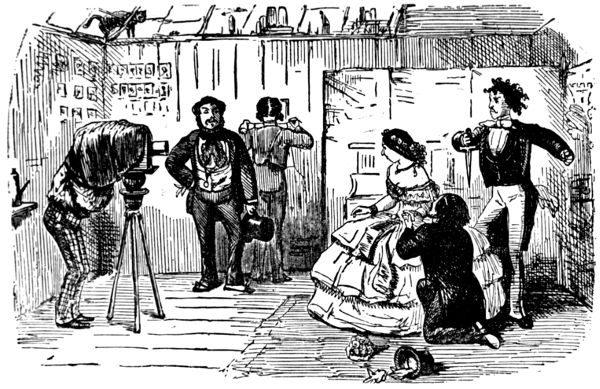
THE ARTISTIC (!) STUDIO.
A Stereoscopic Scene from Fashionable Life in 1857.
“Love, Pride, Revenge.” The group represents a young minstrel of humble origin, declaring his passion to a lady of noble parentage. Her haughty brother, as may be seen from his menacing attitude, is about to avenge the insult offered to his family!
[258]
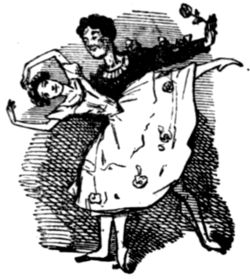
To-day I was let sit up, tucked up in a quilt in a arm-chare. I soon got tired o’ that, so I ast Betty to get me a glass o’ ice-water to squench my thirst, an’ when she was gone I cut an’ run, an’ went into Susan’s room to look at all them fotografs of nice young men she’s got there in a drawer.
The girls was all down in the parlour, ’cos Miss Watson had come to call. Betty she came a huntin’ me, but I hid in the closet behind a old hoop-skirt. I come out when she went away, and had a real good time. Some o’ them fotografs was written on the back, like this: “Conseated fop!” “Oh, ain’t he sweet?” “He ast me, but I wouldn’t have him.” “A perfect darling!” “What a mouth!” “Portrait of a donkey!”
I kep about two dozen o’ them I knew, to have some fun when I got well. I shut the drawer so Sue wouldn’t notice they was took. I felt as if I could not bare to go back to that nasty room, I was so tired of it, an’ I thought I’d pass my time a playing I was a young lady. I found a lot o’ little curls in the buro, wich I stuck on all around my forehead with a bottle of mewsiledge, and then I seen some red stuff on a sawcer, wich I rubbed onto my cheaks. When I was all fixed up I slid down the bannisters plump against Miss Watson, wot was sayin’ good-bye to my sisters. Such a hollerin’ as they made!
[259]
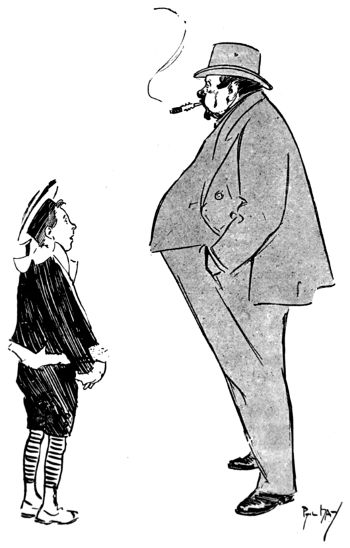
“Have you ever been photographed, Uncle?”
“Yes, Tommy.”
“What for?”
[260]
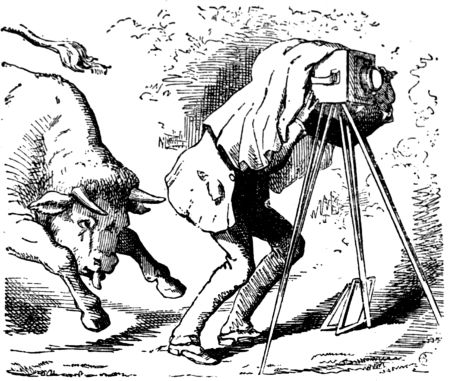
PORTRAIT OF A DISTINGUISHED PHOTOGRAPHER,
Who has just succeeded in focussing a view to his complete
satisfaction.
Miss Watson she turned me to the light, an’ sez she, as sweet as pie:
“Where did you get them pretty red cheeks, Geordie?”
Susan she made a sign, but I didn’t know it.
“I found some red stuff in Sue’s drawer,” sez I, and she smiled kind o’ hateful, and said:
“Oh!”
My sister says she is an awful gossip, which will tell all over town that they paint, wich they don’t, ’cause that sawcer was gust to make roses on card-bord, wich is all right.
Sue was so mad she boxed my ears.
“Aha, missy!” sez I to myself, “you don’t guess about them fotografs wot I took out o’ your drawer!”
Some folks think little boys’ ears are made on purpose to be boxed—my sisters do. If they knew what dark and desperate thoughts come[261] into little boys’ minds, they’d be more careful—it riles ’em up like pokin’ sticks into a mud puddel.
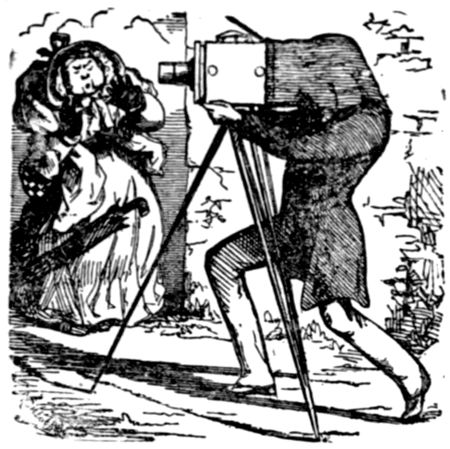
A PHOTOGRAPHIC PICTURE. (1853.)
Old Lady (who is not used to these new-fangled notions). Oh, sir!
please, sir! don’t, sir! Don’t for goodness’ sake fire; sir!
I laid low—but beware to-morrow!
They let me come down to breakfast this mornin’.
I’ve got those pictures all in my pockets, you bet your life.
“Wot makes your pockets stick out so?” ast Lily, when I was a waiting a chance to slip out unbeknone.
“Oh, things,” sez I, an’ she laughed.
“I thought mebbe you’d got your books and cloathes packed up in ’em,” sez she, “to run away an’ be a Injun warryor.”
I didn’t let on anything, but ansered her:
“I’ll just go out in the backyard an’ play a spell.”
Well, I got to town, an’ had a lot of fun. I called on’ all the aboriginals of them fotografs.
[262]
“Hello, Georgie! Well agen?” said the first feller I stopped to see.
Oh, my! when I get big enuff I’ll hope my mustaches won’t be waxed like his’n! He’s in a store, an’ I got him to give me a nice cravat, an’ he ast me “Was my sisters well?” so I fished out his fotograf, and gave it to him.
It was the one that had “Conseated Fop!” writ on the back. The girls had drawed his mustaches out twict as long with a pencil, an’ made him smile all acrost his face. He got as red as fire, an’ then he skowled at me:
“Who did that, you little rascal!”
“I should say the spirits did it,” I said, as onest as a owl, an’ I went away quick cause he looked mad.
The nex plaice I come to was a grocery store, where a nuther young man lived. He had red hair an’ freckles, but he seemed to think hisself a beauty. I said:
“Hello, Peters!”
He said:
“The same yourself, Master George. Do you like raisins? Help yourself.”
Boys wot has three pretty sisters allers does get treted well, I notiss. I took a big hanful of raisins an’ sot on the counter eating ’em, till all at oncest, as if I jest thought of it, I took out his fotograf an’ squinted at it, an sez:
“I do declare it looks like you.”
“Let me see it,” sez he.
I wouldn’t for a long time, then I gave it to him. The girls had made freckles all over it. This was the one they wrote on its back, “He asked me, but I wouldn’t have him.” They’d painted his hair as red as a rooster’s comb. He got quite pale when he seen it clost.
[263]
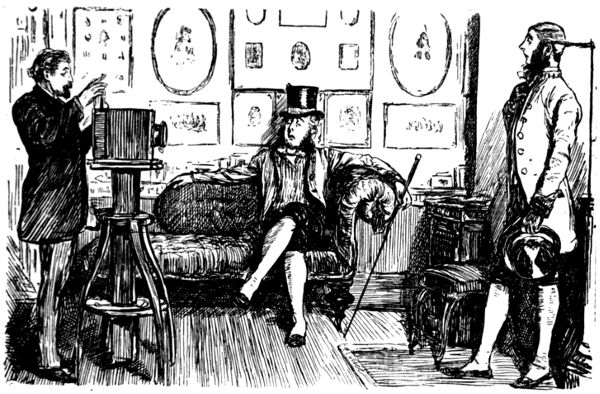
ENCOURAGEMENT OF ART.
First curled and powdered Darling (to photographer). You’d better take pains with these ’ere carte de visites, as they’ll be a good deal shown about.
Second curled and powdered Darling (on the sofa). Yes—pertiklerly in the hupper suckles. Get you customers, you know.
[264]
“It’s a burning shame,” sez I, “for them young ladies to make fun of their bows.”
“Clear out,” sez Peters.
I grabbed a nuther bunch o’ raisins an’ quietly disappeared. I tell you he was rathy!
Mister Courtenay he was a lawyer, he’s got a offis on the square by the cort-house. I knew him very well, ’cause he comes to our house offen. He’s a awful queer-lookin’ chap, an’ so stuck up you’d think he was tryin’ to see if the moon was made o’ green cheese, like folks sez it is, the way he keeps it in the air. He’s got a depe, depe voice way down in his boots. My harte beat wen I got in there, I was that fritened; but I was bound to see the fun out, so I ast him:
“Is the What is It on exabishun to-day?”
“Wot do you mean?” sez he, a lookin’ down on me.
“Sue said if I would come to Mister Courtenay’s offis I would see wot this is the picture of,” sez I, givin’ him his own fotograf inskribed, “The Wonderful What is It.”
It’s awful funny to see their faces wen they look at their own cards.
In about a minit he up with his foot, wich I dodged just in time. I herd him muttering suthin’ ’bout “suing for scandal.” I think myself I oughter arrest her for ’salt an’ battery, boxing my ears. I wisht he would sue Sue, ’twould serve her right.
I’ll not get to bed fore midnight if I write enny more. I’m yawning now like a dying fish. So, farewell my diry till the next time. I give them cards all back fore dinner-time. There’ll be a row, I expect. I’ve laughed myself almost to fits a thinkin’ of the feller wot I give “The[265] Portrait of a Donkey” to. He looked so cress fallen. I do believe he cried. They were teazin’ ma to let ’em give a party nex’ week wen I got home to dinner. I don’t believe one of them young gentlemen will come to it; the girls have give ’em all away. I don’t care tuppence. Wot for do they take such libertys with my ears if they want me to be good to ’em.
P.S.—I bet their left ears are burning wuss’n ever mine did!
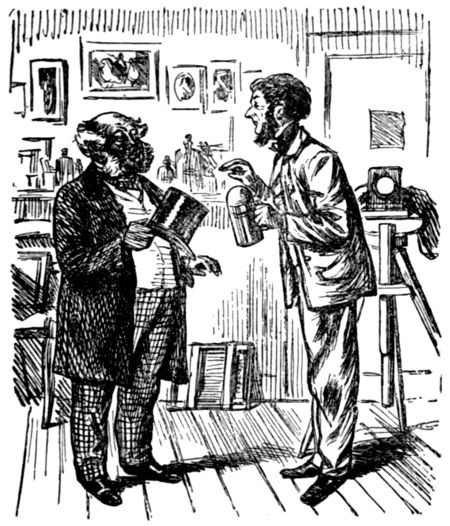
Artist! (photographic). You’ve rather a florid complexion, sir, but (producing a flour dredger, to the old gentleman’s horror) if you’ll take a seat, we’ll obviate that immediately.
[266]
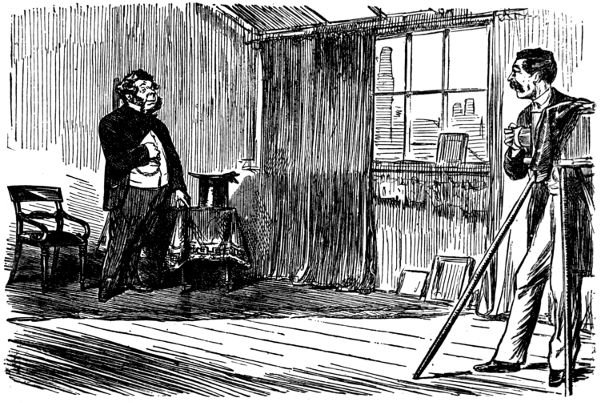
ARTFUL!
Dodge of little Sperks, showing how parties below the middle height, by the use of miniature background furniture, may gain a more imposing stature in the carte de visite.
[267]
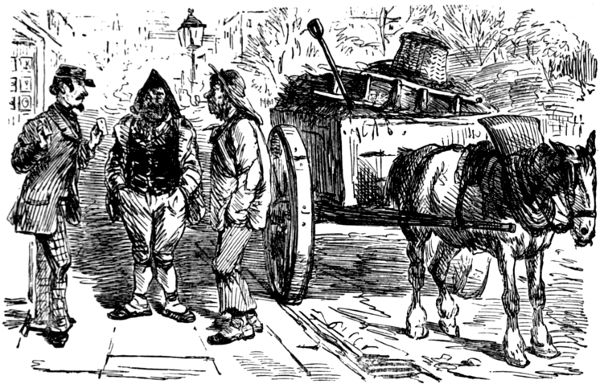
SUBJECT FOR A PICTURE.
Photographer. Now, sir! ’ave yer cart de visit done?
[268]
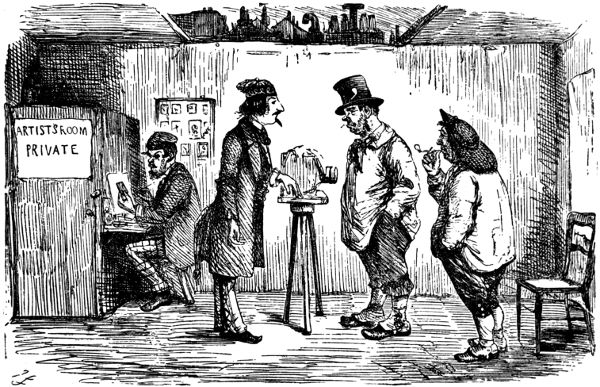
PHOTOGRAPHIC BEAUTIES.
“I say, mister, here’s me and my mate wants our fotergruffs took; and mind, we wants ’em ’ansom, cos they’re to give to two ladies.”
[269]
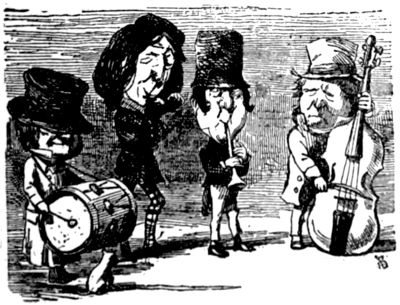
CHRISTMAS WAITS.
[270]
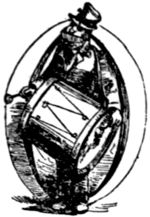
Oh, I don’t think as I ever did ’ave sich a ’ead-ache as that arter we’d been to ’Ampton Court, as I do believe a-settin’ on the grass ’ad struck to me, and cold weal and ’am pie and cowcumber is wittles as along with lobster salad and red currant tart you did ought to be cautious ’ow you takes, and not ’urry thro’ it with all that confusion, and you don’t know what you are a-takin’. And young ’Awkins as were attentive to me kep’ a-fillin’ up my plate and glass every time as I turned my ’ead away a minit, as ’ave know’d ’im from a child, and what with the confusion at the train a-gettin’ back, I were that dizzy as I got into the wrong cab, as thro’ a mistake drove me werry near to Nottin’-’ill afore I could make the stupid feller understand as I wanted South Lambeth, and then to stand me out as I said Bayswater.
It was past one in the mornin’ when I got ’ome, and ’ad to knock Brown up, as were that savage, and all his own fault thro’ not a-lookin’ arter me at the Waterloo Station, thro’ ’avin’ got out at Wauxall, as is certingly nearest, thro’ bein’ not five minits from our door, yet ’ow was I to know as we’d got parted a-gettin’ into the train, and me that dead beat as to fall asleep the werry moment as I were in the train, and never opened my eyes till the man come for the ticket, and a nice trouble I ’ad to find mine and every one in the carriage a-goin’ on at me as is their larkin’ ways of a Sunday night.
Well, as I said afore never did I ’ave sich a ’eadache, as were downright splittin’, and openin’ and a-shettin’ jest like water-works. I ’adn’t took no dinner, so was a-thinkin’ as I’d ’ave a early cup of tea, and was a-settin’ quiet in my front parlour with the blinds drawed down, a-thinkin’ as I might get a nap and be fresh for my tea.
[271]
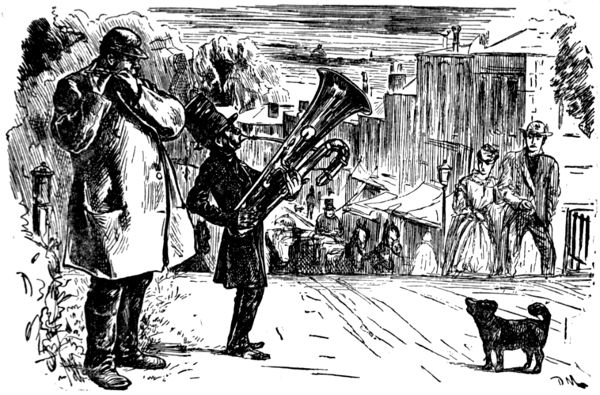
THE DIVISION OF LABOUR.
How would it be if they changed instruments?
[272]
I’d put my feet up on the sofy, as isn’t a thing as I do one time in a thousand, and was a-droppin’ off, when of all the ’owlin’, gruntin’ and squeakin’ noises as ever you ’eard it broke out in our street. I says, “they must be lunatics broke loose, a-makin’ free with them hinstruments, as wouldn’t never make that noise left to theirselves or used proper.”
I gets up and goes to the winder, and I see about four of them German boys a-playin’ away on trombones, like mad, and one on ’em a-tryin’ our gate.
So I knocks at the winder, and shakes my ’ead at ’im, he opens the gate and comes in up to the winder as I opens, and says, “Go along. I don’t want no more of your noise.”
He goes on with ’is gibberish rubbish, and I only says to ’im, “Get out!” and shets down the winder.
Well, them young waggerbones kep’ on a-blowin’ and ’owlin’, like any one in tortures till I couldn’t stand it no longer, so I opens the winder ag’in, and ’olds up a jug of water, as the gal ’ad brought me up for the plants, a-making believe to throw it over ’em, when one of them ’Opwoods as lives next door, comes out and tells ’em to go on playin’ and give ’em money.
The row as they kicked up, then, a-blowin’ right at me with them big ’orns of theirn did so aggravate me that I took and chucked all the water slap among ’em, and if one of them young wretches didn’t pick up a big stone and shiver a pane of glass in my front parlour in a jiffey.
[273]
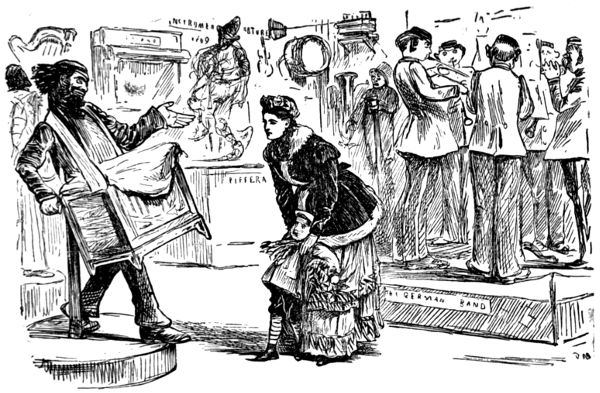
CULTURE FOR THE MILLION; or, SOCIETY AS IT MAY BE.
New Chamber of Horrors at Madame Tussaud’s. (The right man in the right place.) Don’t be afraid, you little goose! it’s only wax-work! Why, I recollect when people like that were allowed to go loose about the streets!
[274]
I couldn’t stand that, so ketches up the fust thing as come to, and as proved to be the ’arth broom as ’angs with the kittle ’older, and out of the ’ouse I rushes.
Well, them boys took to their ’eels, when they see me comin’ out of the door, and run a little way, and then stopped and picked up stones and sent a reg’lar wolley at me.
I ducked my ’ead in course, as they all went over right into old ’Opwood’s Green-’ouse, as he jest ’ad put up ag’in ’is parlour.
I never ’eard sich a crash, nor yet sich a roar as old ’Opwood give like demented lions, and out he come on the doorstep, jest as them boys sent a second wolley of stones, and one ketched ’im slap in the mouth, and down he went like a dead un, and them young scoundrels was off like the dust afore the wind as the sayin’ is.
If all them ’Opwoods didn’t come out on the doorstep, and give me their Billinsgate, for the old feller’s got two reg’lar brimstones of daughters, besides ’is old wife as is a reg’lar old dragon of Wantage.
They all yells at me “’ow dare you set them boys on to destroy our property.”
I says, “Me set the boys on? I was a-drivin’ them away with their beastly noise a-distractin’ any one, as you’ve been encouragin’.”
“They was playin’ beautiful,” says one of them Miss ’Opwoods, “my favourite Waltz.”
I says, “So I should think jest the music fit for you to dance to,[275]” for she’s forty-five, and got a ’ump back, and as ugly as she’s wicious.
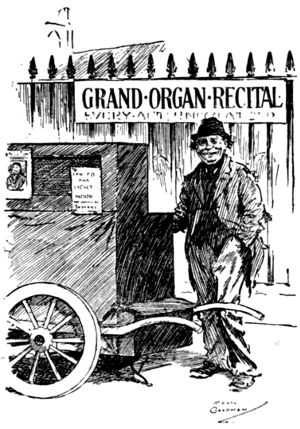
NOTHING LIKE ADVERTISING YOURSELF.
“Oh, you old cat,” she says to me, a-gnashin’ ’er teeth, “’ow I should like to tear your old wig off.”
I says, “No doubt, for I’m sure you wants one bad enough.”
“Come in Julia,” says the old mother. “Don’t talk to that low old woman.”
[276]
“Yes,” I says, “Go in Julia, and ’elp your ma skin the cat.”
Down the steps come the old woman, and says, “You audacious falsehood; I’ll punish you.”
I’d got to my gate by that time. So I says to ’er, “Stand off you wile filthy old wretch, don’t dare cross my doorstep!” and ’olds up the ’arth broom at ’er.
Her two daughters, a-seein’ me threatenin’ ’er come up, and says, “Ma, dear, come in.”
“Yes,” I says, “Ma dear, do, or else the police may come by, and you may get give in charge ag’in as you was the week afore last,” for the old man ’ad been ’ad up for cruelty to animals twice.
They was all a-goin’ to fly out when a bobby come round the corner, and as soon as they see ’im, they made faces at me, and was a-goin’ off.
I says, “Oh, pray don’t ’urry, here is the police.”
I says to the perliceman, “’Ave you ’ad any one up lately hereabouts for cruelty to animals”; and in they goes and bangs their doors; and well they might, for that wicked old wretch had been destroyin’ of cats brutally, and they’d fined ’im for it; and I do believe as the old woman did use to skin cats, for she wore a fur tippet in the winter as was cats’ skins all over.
But law, ’ow singler things do come ’ome to parties sometimes, to be sure; for it wasn’t but the next Sunday evenin’ arter, as I were alone in the ’ouse, and went out in the front jest to look at some stocks as Brown ’ad planted the night afore, when I thought as I ’eard groans from next door, as is ’Opwood’s.
[277]
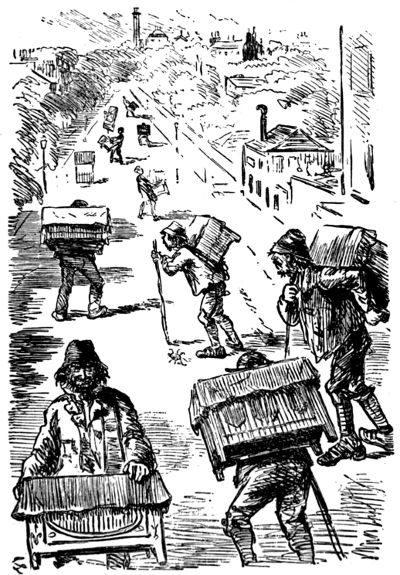
SKETCH FROM A STUDY WINDOW.
[278]
I listens, and says to myself, “That’s some one in pain or I’m a Dutchman.” So I goes closer to their wall and ’ears them groans and smells burnin’.
So knowin’ as somethink were wrong I ’urries to their door and knocks, but no one a-comin’, I says, “They’re all gone out,” and was a-goin’ away, for I didn’t ’ear no more groans, but I smelt the burnin’; so I says, “No doubt I shall only get insults for my pains, but I’ll try and go in and see what’s amiss.” So I makes my way round to their back door, as were only on the latch, and in I goes, and the smell of burnin’ was downright sickenin’; I goes straight into the front kitchen, and there was old ’Opwood a-layin’ in the fender a-roastin’ as ’ad fell out of ’is chair in a fit.
I ’auls ’im up, and never did see sich a sight as one side of ’is face and all ’is neck and shoulder. The boy jest then come round with the eight o’clock beer, so I ’ollers to ’im to run for a doctor, and I got ’old ’Opwood some’ow into ’is chair, as was quite insensible.
As luck would ’ave it, the doctor jest round the corner were at ’ome, and come at once, and we got the old man’s burns dressed, as I considers there’s nothink finer than whitin’, as the doctor agreed to.
If you’d seen that old Mother ’Opwood’s face and ’er daughters, when they come in jest on ten and found me a-lookin’ arter that old man, as we’d got up on to a sofy in the front parlour.
She begun to scream and holler at fust, and then said as I’d been and done it.
I wasn’t the least put out with ’er, but only says to ’er daughters, “Keep ’er quiet”; which they did by draggin’ on ’er up-stairs, where[279] they kep’ ’er, and I must say, as they spoke werry ’andsome to me, as stopped along with the old man till jest on twelve.
I didn’t think as the old man would ’ave lived thro’ it, but he did, and ’ad his senses back, and able for to talk by the end of the week, and told us as he remembered a-pitchin’ forard ag’in the bars a-tryin’ to get a light for ’is pipe.
He never will be the same man as he were, but it’s been a lesson to ’im and to them, too, not to leave him alone, nor yet to be that insultin’ to a neighbour as they have been to me, a-doin’ everythink to annoy me, and turnin’ me into every redicule as the ’uman ’art can think on.
But they’ll never encourage them orgins and bands as they did use to, and ’ave them inside their gardin’ to play when I’d sent them away, and no doubt we should get on better for the future to come, but I’m glad as we’re a-goin’ to move away, and all as I wants is to part friends, for as to livin’ friendly next door to them I never could.
Fun, 1868.
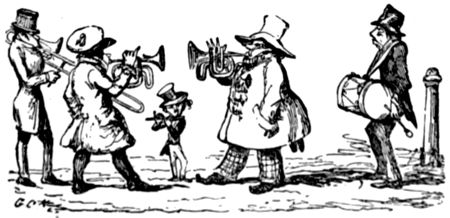
[280]

By Oliver Wendell Holmes.
[281]
THROUGH THE OPERA GLASSES
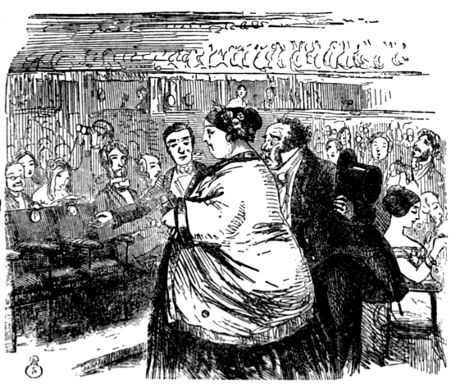
THE OPERA.
Box-Keeper. Stalls 216 and 217. This way, ma’am; last row, ma’am.
Won’t you like a book, ma’am?
[282]
ADAPTED TO THE MEANEST CAPACITY
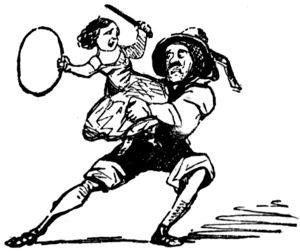
[283]
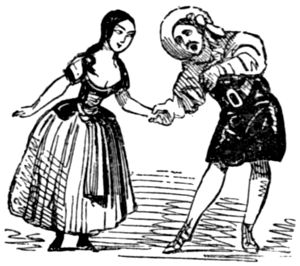
Punch, 1844.
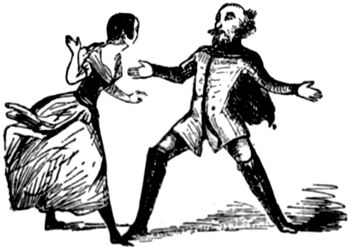
[284]
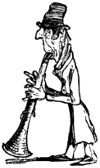
At a Cosmopolitan Club they were discussing the relative position of various countries as musical centres. Germany seemed to have the most votaries, much to the evident displeasure of one excitable Italian. “Italy is turning out the most musicians, and has always turned out the most,” he cried.
“Ach Gott!” exclaimed one of the Germans. “Can you blame her?”
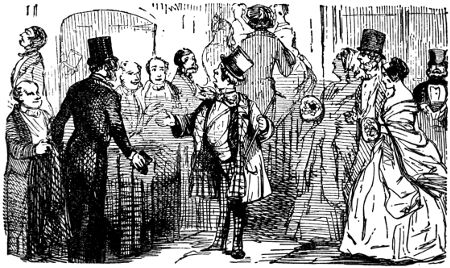
WHAT INDEED?
Door-Keeper. Beg your pardon, sir—but you must, indeed, sir, be in full dress!
Snob (excited). Full dress!! Why, what do yer call this?
[285]
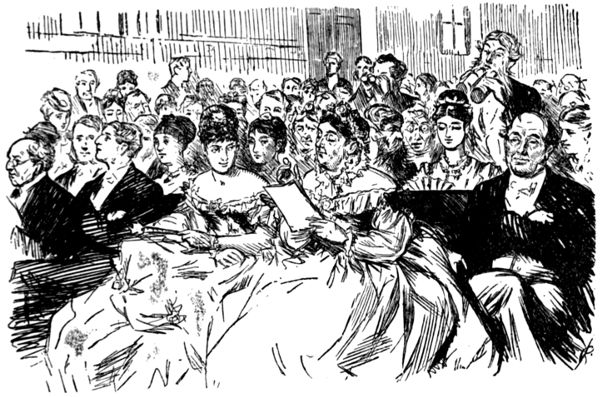
“FRENCH WITHOUT A MASTER.”
Matron in Stalls (reads from programme). “Overture to L’Ongfong Prod-eeg.” What does that mean? The prodigious child, eh?
Accomplished Daughter (shocked). Mamma, dear! No—“L’Enfant Prodigue”—it means the infant prodigy!!
[286]
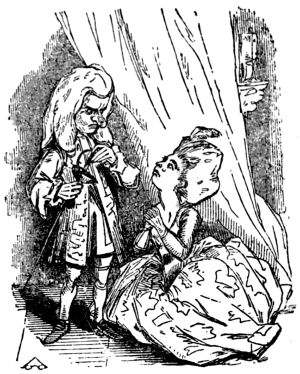
By W. M. Thackeray.
Punch, 1843.
[287]
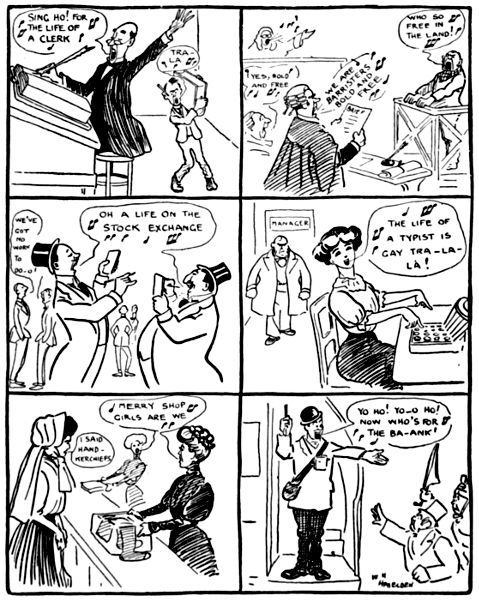
Sailors sing at their work. Why don’t clerks, lawyers, doctors, brokers, and shopkeepers? It would add to the variety of life.
[288]

THE HIGH NOTE.
[289]
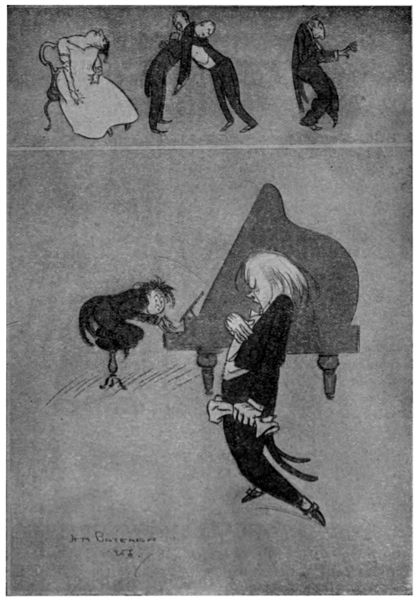
THE LOW NOTE.
[290]
Fun, 1865.
[291]
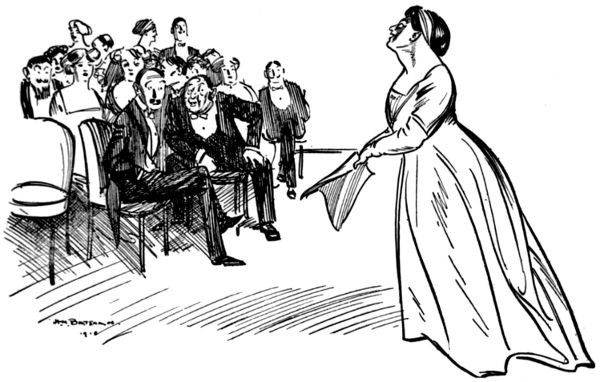
Brown (thinking of her age). Perfect voice that girl has—she’s only twenty-two.
Jones (thinking otherwise). Twenty-two what—stone?
[292]
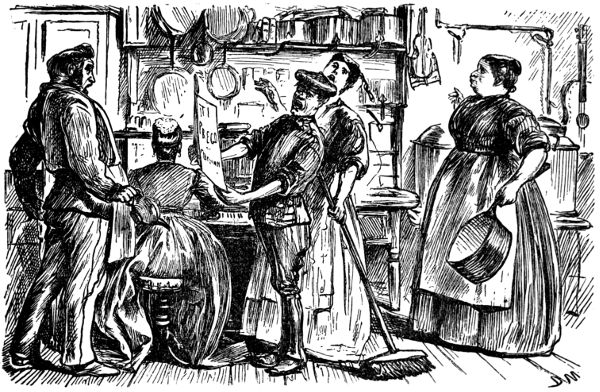
CULTURE FOR THE MILLION; or, SOCIETY AS IT MAY BE.
HIGH ART BELOW STAIRS.—Cook. Sh—sh—! Moderato, Susan! Affettuoso, Jim! Ben marcato il basso, Mr. Raffles! Bravi tutti! Da capo!
[293]
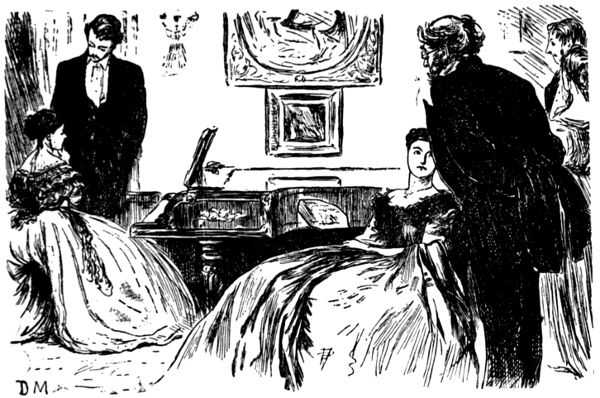
GENTLE REBUKE.
Old Gentleman. How charmingly that young lady sings! Pray, who composed the beautiful song she has just favoured us with?
Lady of the House. Oh, it is by Mendelssohn.
Old Gentleman. Ah! One of his famous “Songs without Words,” I suppose.
(Moral.—Young ladies, when you sing,
pronounce your words carefully, and then you will not expose
unmusical old gentlemen to making such a ridiculous mistake as the above.)
[294]
(After Tennyson’s “Lady of Shalotte.”)
[295]
(A change comes o’er the spirit of the O.G.)
Fun, 1864.
[296]
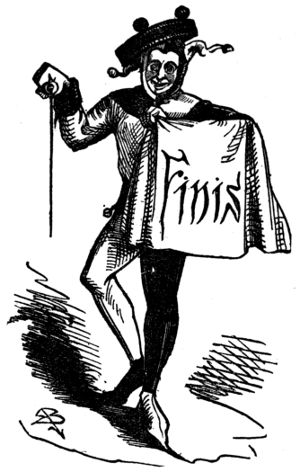
END OF VOLUME VIII.
Butler & Tanner, Frome and London.
I cannot tell, what you and other men
Think of this life; but, for my single self,
I had as lief not be, as live to be
In awe of such a thing as I myself.
Back to illustration.
OWING TO A SPRAINED ANKLE, AN ACTRESS PLAYED CARMEN IN A BATH CHAIR
SIGNOR BELLOWNI HAD A SORE THROAT THE OTHER NIGHT, BUT HE PLUCKILY WENT THROUGH HIS PART WITH THE AID OF A MACHINE
ARE YOU RIGHT SIR?
ALTHOUGH SUFFERING FROM A SEVERE ATTACK OF GOUT, MR
BUSKIN PLAYED ROMEO MANFULLY
AITCHOO!
INFLUENZA DID NOT PREVENT MR YELLOWCHEEK
FROM GOING THROUGH HIS FAVOURITE PART OF HAMLET LAST NIGHT
SIGNOR SQUALLO HAS BEEN CONFINED TO HIS BED WITH PNEUMONIA, BUT WE ARE GLAD TO SAY HE WAS ABLE TO MAKE A VERY SUCCESSFUL APPEARANCE AS MEPHISTOPHELES
SUCCESS ATTENDED SIGNOR TOPNOTO’S IMPERSONATION OF TRISTAN, THOUGH HE WAS NURSING A BAD COLD IN THE HEAD.
Back to illustration.
“HOORAY!”
“SPLENDID!”
“BRAVO!”
STEALS SOMEONE ELSE’S GIRL
“WELL DONE!”
“I HOPE HE WON’T BE FOUND OUT!”
“HOW DARING HE IS!”
STEALS HER FATHER’S PICTURES
“GOOD!”
“ISN’T HE A SPORTSMAN!”
“WHAT A SPLENDID FELLOW!”
STEALS HER TIARA
“FINE!”
“I HOPE HE’LL ESCAPE!”
“HOW NOBLE!”
ESCAPES FROM POLICE IN A MOTOR CAR
Back to illustration.
THE LIGHTING OF THE HOUSE IS SURE TO RECEIVE ATTENTION
MR BUSKIN M.P. HURRIES TO THE HOUSE AFTER A MATINÉE TO VOTE FOR HIS PARTY
“DISGRACEFUL COSTUME”
“OUGHT NOT TO BE ALLOWED!”
“LOWERS THE DIGNITY OF THE HOUSE!”
DIGNIFIED EXIT OF MR GARRICK-KEAN M.P.
AFTER AN UNSUCCESSFUL ATTEMPT TO
ENGAGE THE ATTENTION OF THE HOUSE.
“CHAIR”
“BOO”
“ORDER”
“NO MATTER-R-R! A TIME WILL COME!”
“WHERE’S THE PROMPTER?”
A MAIDEN SPEECH
“HA! HA!”
“HA! HA!”
“HA! HA!”
EFFECT OF A LOW COMEDIAN ON THE HOUSE
Back to illustration.
WE SHALL SOON SEE ACTORS WEARING MASKS OUT OF DOORS
THE ACTOR-MANAGER WILL REFUSE LIMELIGHT
“THIS PART OF THE STAGE WILL DO FOR ME”
THIS WILL BE A QUITE USUAL OCCURRENCE ON FIRST NIGHTS
“MR GARRICK-KEAN IS NO LONGER IN THE HOUSE!”
THE GENERAL APPEARANCE OF THE ACTOR WILL CHANGE FROM THIS-- TO THIS--
THIS MAY POSSIBLY HAPPEN
“NO, I’VE TAKEN ONE CALL, LET SOMEONE ELSE GO FORWARD NOW!”
Back to illustration.
“BE OFF, OR I’LL CALL IN THE POLICE!”
“WHAT CHEEK!”
“WANTS TO BUY A SEAT!”
“WHAT IMPUDENCE!”
WHEN BUSINESS IS GOOD
“LET ME TAKE YOUR COAT, SIR!”
“DO TAKE A PROGRAMME, SIR!”
“ANY SEAT YOU LIKE, SIR!”
“COME IN MY DEAR SIR. DON’T GO AWAY!”
WHEN BUSINESS IS BAD
Back to illustration.
“COME AND LUNCH WITH ME AT THE ACTORS’ CLUB”
“HULLO, OLD MAN, SEEN ME IN MY NEW PART? BIGGEST SUCCESS OF MODERN TIMES!”
“HULLO, DEAR BOY, SEEN MY ROMEO? FINEST EVER KNOWN--BRINGS THE HOUSE DOWN EVERY NIGHT!”
“I TELL YOU, OLD BOY, MY SHOW IS THE FUNNIEST IN LONDON. I’M SIMPLY GREAT IN IT!”
“SMITH’S HAMLET ISN’T IN IT WITH MINE!”
“COME AND LUNCH WITH ME AT THE ACTORS’ CLUB”
Back to illustration.
IT IS A STRANGE IDIOSYNCRACY OF CERTAIN THEATRE-GOERS THAT THEY WILL HUSTLE AND PUSH AND FIGHT TO LEAVE THEIR SEATS BEFORE THE CURTAIN GOES DOWN—
—IN ORDER TO STAND AT THE ENTRANCE AND PREVENT OTHERS FROM LEAVING THE THEATRE
Back to illustration.
CALL BOY
CHARWOMAN
SUPERS
STAGE CARPENTER
SCENE SHIFTERS
BOOT MAKER
TAILOR
UPHOLSTERER
WIG MAKER
LIMELIGHT MAN
PROMPTER
GAS FITTER
TROMBONE
Back to illustration.
LITERATURE: we shall all be run down & devoured!!—there won’t be a bit of us left for succedding ages!—the dogs nowadays have got such large Capacities!!
Left hand baby: FIRST STEPS TO LEARNING
Right hand baby: READING MADE EASY
Back to illustration.
Flag: We are the boys
Book title: NEW HORN BOOK EVERY MAN his own TRUMPETER.
Back to illustration.
You see Gran Ma, before you suct this Egg, or, more properly speaking before you extract the matter contained within this shell by suction, you must make an incision at the Apex & a Corresponding aperture at the base.
Aye, Dear—How very clever!!—they only used to make a hole at each end in my time—Well I declare they are making improvments in everything.
Book: WHO KILLED COCK ROBIN
Books in toy basket: amongst others THEOLOGY, SHAKESPEARE, EUCLID, BOYLE, BENTLEY, MILTON, HUME
Back to illustration.
Now mind, you are to make me appear as usgly as you can—aye—you may stare!—but you must know that I am the only one that dislikes flattery. In fact, I want every-body to laugh at me—so the more ridiculous you make methe better I shall like it
It’s an odd request! But I’ll do my best
Back to illustration.
WAITING FOR A SEAT
THE FIGHT ROUND THE TEA ROOM
Charming! How nice How pretty! Quite nice
TRYING TO GET A GLIMPSE OF THE PICTURES
OH MY HEAD! GOING
HOME
NEXT DAY
OH MY HEAD! GOING
HOME
NEXT DAY
Back to illustration.
♫ SING HO! FOR THE LIFE OF A CLERK ♫
♫ TRA-LA ♫
♫ WE ARE BARRISTERS BOLD AND FREE ♫
♫ YES BOLD AND FREE ♫
♫ WHO SO FREE IN THE LAND! ♫
♫ WE’VE GOT NO WORK TO DO-O ♫
♫ OH A LIFE ON THE STOCK EXCHANGE ♫
♫ THE LIFE OF A TYPIST IS GAY ♫
♫ TRA-LA-LA! ♫
♫ MERRY SHOP GIRLS ARE WE ♫
I SAID HANDKERCHIEFS
♫ YO-HO! YO-O HO! ♫
♫ NOW WHO’S FOR THE BA-ANK! ♫
Back to illustration.
Depending on the hard- and software used, not all elements may display as intended.
Inconsistencies and unusual spelling have been retained.
The transcriptions of the texts inside illustrations have been made for this e-text.
Page 107: The illustrated capital should be an I, but is an L.
Some missing and incorrect punctuation has been added or corrected silently,
as have been some obvious printer’s errors.
On page 74/75, 176/177 and 252/253 references to the illustrations and captions on the opposite page have been deleted.
Page 84: ... the muffs who loat ... has been changed to ... the muffs who gloat ....
End of the Project Gutenberg EBook of Stage, Study & Studio, by Various
*** END OF THIS PROJECT GUTENBERG EBOOK STAGE, STUDY & STUDIO ***
***** This file should be named 52614-h.htm or 52614-h.zip *****
This and all associated files of various formats will be found in:
http://www.gutenberg.org/5/2/6/1/52614/
Produced by Chris Curnow, Harry Lamé and the Online
Distributed Proofreading Team at http://www.pgdp.net (This
file was produced from images generously made available
by The Internet Archive)
Updated editions will replace the previous one--the old editions
will be renamed.
Creating the works from public domain print editions means that no
one owns a United States copyright in these works, so the Foundation
(and you!) can copy and distribute it in the United States without
permission and without paying copyright royalties. Special rules,
set forth in the General Terms of Use part of this license, apply to
copying and distributing Project Gutenberg-tm electronic works to
protect the PROJECT GUTENBERG-tm concept and trademark. Project
Gutenberg is a registered trademark, and may not be used if you
charge for the eBooks, unless you receive specific permission. If you
do not charge anything for copies of this eBook, complying with the
rules is very easy. You may use this eBook for nearly any purpose
such as creation of derivative works, reports, performances and
research. They may be modified and printed and given away--you may do
practically ANYTHING with public domain eBooks. Redistribution is
subject to the trademark license, especially commercial
redistribution.
*** START: FULL LICENSE ***
THE FULL PROJECT GUTENBERG LICENSE
PLEASE READ THIS BEFORE YOU DISTRIBUTE OR USE THIS WORK
To protect the Project Gutenberg-tm mission of promoting the free
distribution of electronic works, by using or distributing this work
(or any other work associated in any way with the phrase "Project
Gutenberg"), you agree to comply with all the terms of the Full Project
Gutenberg-tm License (available with this file or online at
http://gutenberg.org/license).
Section 1. General Terms of Use and Redistributing Project Gutenberg-tm
electronic works
1.A. By reading or using any part of this Project Gutenberg-tm
electronic work, you indicate that you have read, understand, agree to
and accept all the terms of this license and intellectual property
(trademark/copyright) agreement. If you do not agree to abide by all
the terms of this agreement, you must cease using and return or destroy
all copies of Project Gutenberg-tm electronic works in your possession.
If you paid a fee for obtaining a copy of or access to a Project
Gutenberg-tm electronic work and you do not agree to be bound by the
terms of this agreement, you may obtain a refund from the person or
entity to whom you paid the fee as set forth in paragraph 1.E.8.
1.B. "Project Gutenberg" is a registered trademark. It may only be
used on or associated in any way with an electronic work by people who
agree to be bound by the terms of this agreement. There are a few
things that you can do with most Project Gutenberg-tm electronic works
even without complying with the full terms of this agreement. See
paragraph 1.C below. There are a lot of things you can do with Project
Gutenberg-tm electronic works if you follow the terms of this agreement
and help preserve free future access to Project Gutenberg-tm electronic
works. See paragraph 1.E below.
1.C. The Project Gutenberg Literary Archive Foundation ("the Foundation"
or PGLAF), owns a compilation copyright in the collection of Project
Gutenberg-tm electronic works. Nearly all the individual works in the
collection are in the public domain in the United States. If an
individual work is in the public domain in the United States and you are
located in the United States, we do not claim a right to prevent you from
copying, distributing, performing, displaying or creating derivative
works based on the work as long as all references to Project Gutenberg
are removed. Of course, we hope that you will support the Project
Gutenberg-tm mission of promoting free access to electronic works by
freely sharing Project Gutenberg-tm works in compliance with the terms of
this agreement for keeping the Project Gutenberg-tm name associated with
the work. You can easily comply with the terms of this agreement by
keeping this work in the same format with its attached full Project
Gutenberg-tm License when you share it without charge with others.
1.D. The copyright laws of the place where you are located also govern
what you can do with this work. Copyright laws in most countries are in
a constant state of change. If you are outside the United States, check
the laws of your country in addition to the terms of this agreement
before downloading, copying, displaying, performing, distributing or
creating derivative works based on this work or any other Project
Gutenberg-tm work. The Foundation makes no representations concerning
the copyright status of any work in any country outside the United
States.
1.E. Unless you have removed all references to Project Gutenberg:
1.E.1. The following sentence, with active links to, or other immediate
access to, the full Project Gutenberg-tm License must appear prominently
whenever any copy of a Project Gutenberg-tm work (any work on which the
phrase "Project Gutenberg" appears, or with which the phrase "Project
Gutenberg" is associated) is accessed, displayed, performed, viewed,
copied or distributed:
This eBook is for the use of anyone anywhere at no cost and with
almost no restrictions whatsoever. You may copy it, give it away or
re-use it under the terms of the Project Gutenberg License included
with this eBook or online at www.gutenberg.org/license
1.E.2. If an individual Project Gutenberg-tm electronic work is derived
from the public domain (does not contain a notice indicating that it is
posted with permission of the copyright holder), the work can be copied
and distributed to anyone in the United States without paying any fees
or charges. If you are redistributing or providing access to a work
with the phrase "Project Gutenberg" associated with or appearing on the
work, you must comply either with the requirements of paragraphs 1.E.1
through 1.E.7 or obtain permission for the use of the work and the
Project Gutenberg-tm trademark as set forth in paragraphs 1.E.8 or
1.E.9.
1.E.3. If an individual Project Gutenberg-tm electronic work is posted
with the permission of the copyright holder, your use and distribution
must comply with both paragraphs 1.E.1 through 1.E.7 and any additional
terms imposed by the copyright holder. Additional terms will be linked
to the Project Gutenberg-tm License for all works posted with the
permission of the copyright holder found at the beginning of this work.
1.E.4. Do not unlink or detach or remove the full Project Gutenberg-tm
License terms from this work, or any files containing a part of this
work or any other work associated with Project Gutenberg-tm.
1.E.5. Do not copy, display, perform, distribute or redistribute this
electronic work, or any part of this electronic work, without
prominently displaying the sentence set forth in paragraph 1.E.1 with
active links or immediate access to the full terms of the Project
Gutenberg-tm License.
1.E.6. You may convert to and distribute this work in any binary,
compressed, marked up, nonproprietary or proprietary form, including any
word processing or hypertext form. However, if you provide access to or
distribute copies of a Project Gutenberg-tm work in a format other than
"Plain Vanilla ASCII" or other format used in the official version
posted on the official Project Gutenberg-tm web site (www.gutenberg.org),
you must, at no additional cost, fee or expense to the user, provide a
copy, a means of exporting a copy, or a means of obtaining a copy upon
request, of the work in its original "Plain Vanilla ASCII" or other
form. Any alternate format must include the full Project Gutenberg-tm
License as specified in paragraph 1.E.1.
1.E.7. Do not charge a fee for access to, viewing, displaying,
performing, copying or distributing any Project Gutenberg-tm works
unless you comply with paragraph 1.E.8 or 1.E.9.
1.E.8. You may charge a reasonable fee for copies of or providing
access to or distributing Project Gutenberg-tm electronic works provided
that
- You pay a royalty fee of 20% of the gross profits you derive from
the use of Project Gutenberg-tm works calculated using the method
you already use to calculate your applicable taxes. The fee is
owed to the owner of the Project Gutenberg-tm trademark, but he
has agreed to donate royalties under this paragraph to the
Project Gutenberg Literary Archive Foundation. Royalty payments
must be paid within 60 days following each date on which you
prepare (or are legally required to prepare) your periodic tax
returns. Royalty payments should be clearly marked as such and
sent to the Project Gutenberg Literary Archive Foundation at the
address specified in Section 4, "Information about donations to
the Project Gutenberg Literary Archive Foundation."
- You provide a full refund of any money paid by a user who notifies
you in writing (or by e-mail) within 30 days of receipt that s/he
does not agree to the terms of the full Project Gutenberg-tm
License. You must require such a user to return or
destroy all copies of the works possessed in a physical medium
and discontinue all use of and all access to other copies of
Project Gutenberg-tm works.
- You provide, in accordance with paragraph 1.F.3, a full refund of any
money paid for a work or a replacement copy, if a defect in the
electronic work is discovered and reported to you within 90 days
of receipt of the work.
- You comply with all other terms of this agreement for free
distribution of Project Gutenberg-tm works.
1.E.9. If you wish to charge a fee or distribute a Project Gutenberg-tm
electronic work or group of works on different terms than are set
forth in this agreement, you must obtain permission in writing from
both the Project Gutenberg Literary Archive Foundation and Michael
Hart, the owner of the Project Gutenberg-tm trademark. Contact the
Foundation as set forth in Section 3 below.
1.F.
1.F.1. Project Gutenberg volunteers and employees expend considerable
effort to identify, do copyright research on, transcribe and proofread
public domain works in creating the Project Gutenberg-tm
collection. Despite these efforts, Project Gutenberg-tm electronic
works, and the medium on which they may be stored, may contain
"Defects," such as, but not limited to, incomplete, inaccurate or
corrupt data, transcription errors, a copyright or other intellectual
property infringement, a defective or damaged disk or other medium, a
computer virus, or computer codes that damage or cannot be read by
your equipment.
1.F.2. LIMITED WARRANTY, DISCLAIMER OF DAMAGES - Except for the "Right
of Replacement or Refund" described in paragraph 1.F.3, the Project
Gutenberg Literary Archive Foundation, the owner of the Project
Gutenberg-tm trademark, and any other party distributing a Project
Gutenberg-tm electronic work under this agreement, disclaim all
liability to you for damages, costs and expenses, including legal
fees. YOU AGREE THAT YOU HAVE NO REMEDIES FOR NEGLIGENCE, STRICT
LIABILITY, BREACH OF WARRANTY OR BREACH OF CONTRACT EXCEPT THOSE
PROVIDED IN PARAGRAPH 1.F.3. YOU AGREE THAT THE FOUNDATION, THE
TRADEMARK OWNER, AND ANY DISTRIBUTOR UNDER THIS AGREEMENT WILL NOT BE
LIABLE TO YOU FOR ACTUAL, DIRECT, INDIRECT, CONSEQUENTIAL, PUNITIVE OR
INCIDENTAL DAMAGES EVEN IF YOU GIVE NOTICE OF THE POSSIBILITY OF SUCH
DAMAGE.
1.F.3. LIMITED RIGHT OF REPLACEMENT OR REFUND - If you discover a
defect in this electronic work within 90 days of receiving it, you can
receive a refund of the money (if any) you paid for it by sending a
written explanation to the person you received the work from. If you
received the work on a physical medium, you must return the medium with
your written explanation. The person or entity that provided you with
the defective work may elect to provide a replacement copy in lieu of a
refund. If you received the work electronically, the person or entity
providing it to you may choose to give you a second opportunity to
receive the work electronically in lieu of a refund. If the second copy
is also defective, you may demand a refund in writing without further
opportunities to fix the problem.
1.F.4. Except for the limited right of replacement or refund set forth
in paragraph 1.F.3, this work is provided to you 'AS-IS' WITH NO OTHER
WARRANTIES OF ANY KIND, EXPRESS OR IMPLIED, INCLUDING BUT NOT LIMITED TO
WARRANTIES OF MERCHANTABILITY OR FITNESS FOR ANY PURPOSE.
1.F.5. Some states do not allow disclaimers of certain implied
warranties or the exclusion or limitation of certain types of damages.
If any disclaimer or limitation set forth in this agreement violates the
law of the state applicable to this agreement, the agreement shall be
interpreted to make the maximum disclaimer or limitation permitted by
the applicable state law. The invalidity or unenforceability of any
provision of this agreement shall not void the remaining provisions.
1.F.6. INDEMNITY - You agree to indemnify and hold the Foundation, the
trademark owner, any agent or employee of the Foundation, anyone
providing copies of Project Gutenberg-tm electronic works in accordance
with this agreement, and any volunteers associated with the production,
promotion and distribution of Project Gutenberg-tm electronic works,
harmless from all liability, costs and expenses, including legal fees,
that arise directly or indirectly from any of the following which you do
or cause to occur: (a) distribution of this or any Project Gutenberg-tm
work, (b) alteration, modification, or additions or deletions to any
Project Gutenberg-tm work, and (c) any Defect you cause.
Section 2. Information about the Mission of Project Gutenberg-tm
Project Gutenberg-tm is synonymous with the free distribution of
electronic works in formats readable by the widest variety of computers
including obsolete, old, middle-aged and new computers. It exists
because of the efforts of hundreds of volunteers and donations from
people in all walks of life.
Volunteers and financial support to provide volunteers with the
assistance they need, are critical to reaching Project Gutenberg-tm's
goals and ensuring that the Project Gutenberg-tm collection will
remain freely available for generations to come. In 2001, the Project
Gutenberg Literary Archive Foundation was created to provide a secure
and permanent future for Project Gutenberg-tm and future generations.
To learn more about the Project Gutenberg Literary Archive Foundation
and how your efforts and donations can help, see Sections 3 and 4
and the Foundation web page at http://www.pglaf.org.
Section 3. Information about the Project Gutenberg Literary Archive
Foundation
The Project Gutenberg Literary Archive Foundation is a non profit
501(c)(3) educational corporation organized under the laws of the
state of Mississippi and granted tax exempt status by the Internal
Revenue Service. The Foundation's EIN or federal tax identification
number is 64-6221541. Its 501(c)(3) letter is posted at
http://pglaf.org/fundraising. Contributions to the Project Gutenberg
Literary Archive Foundation are tax deductible to the full extent
permitted by U.S. federal laws and your state's laws.
The Foundation's principal office is located at 4557 Melan Dr. S.
Fairbanks, AK, 99712., but its volunteers and employees are scattered
throughout numerous locations. Its business office is located at
809 North 1500 West, Salt Lake City, UT 84116, (801) 596-1887, email
[email protected]. Email contact links and up to date contact
information can be found at the Foundation's web site and official
page at http://pglaf.org
For additional contact information:
Dr. Gregory B. Newby
Chief Executive and Director
[email protected]
Section 4. Information about Donations to the Project Gutenberg
Literary Archive Foundation
Project Gutenberg-tm depends upon and cannot survive without wide
spread public support and donations to carry out its mission of
increasing the number of public domain and licensed works that can be
freely distributed in machine readable form accessible by the widest
array of equipment including outdated equipment. Many small donations
($1 to $5,000) are particularly important to maintaining tax exempt
status with the IRS.
The Foundation is committed to complying with the laws regulating
charities and charitable donations in all 50 states of the United
States. Compliance requirements are not uniform and it takes a
considerable effort, much paperwork and many fees to meet and keep up
with these requirements. We do not solicit donations in locations
where we have not received written confirmation of compliance. To
SEND DONATIONS or determine the status of compliance for any
particular state visit http://pglaf.org
While we cannot and do not solicit contributions from states where we
have not met the solicitation requirements, we know of no prohibition
against accepting unsolicited donations from donors in such states who
approach us with offers to donate.
International donations are gratefully accepted, but we cannot make
any statements concerning tax treatment of donations received from
outside the United States. U.S. laws alone swamp our small staff.
Please check the Project Gutenberg Web pages for current donation
methods and addresses. Donations are accepted in a number of other
ways including checks, online payments and credit card donations.
To donate, please visit: http://pglaf.org/donate
Section 5. General Information About Project Gutenberg-tm electronic
works.
Professor Michael S. Hart is the originator of the Project Gutenberg-tm
concept of a library of electronic works that could be freely shared
with anyone. For thirty years, he produced and distributed Project
Gutenberg-tm eBooks with only a loose network of volunteer support.
Project Gutenberg-tm eBooks are often created from several printed
editions, all of which are confirmed as Public Domain in the U.S.
unless a copyright notice is included. Thus, we do not necessarily
keep eBooks in compliance with any particular paper edition.
Most people start at our Web site which has the main PG search facility:
http://www.gutenberg.org
This Web site includes information about Project Gutenberg-tm,
including how to make donations to the Project Gutenberg Literary
Archive Foundation, how to help produce our new eBooks, and how to
subscribe to our email newsletter to hear about new eBooks.